Adaora Umeoji Highlights Zenith Bank’s Robust
Dike Onwuamaeze Zenith Bank Plc, Nigeria’s leading

Dike Onwuamaeze Zenith Bank Plc, Nigeria’s leading






country lost 4.2bn litres of products from refineries worth $1.84bn
Peter Uzoho
In reference to its past audit reports on the oil and gas sector in the country, the Nigerian Extractive Industries Transparency Initiative (NEITI), yesterday, reiterated that the country lost a whopping 619.7 million barrels of oil valued at N16.25 trillion to theft between 2009 and 2020.
The agency added that between 2009 and 2018, the country also lost 4.2 billion litres of petroleum products from refineries valued at $1.84 billion.
Executive Secretary of NEITI, Dr. Ogbonnaya Orji, made the assertions yesterday in Lagos, at the commencement of the 2024 NEITI Board Retreat.
Orji warned that the global push for transition to renewable energy and the prospect of a permanent oil demand decline would have significant effect on Nigeria's fossil fuels-dependent economy.
He stated, "Figures contained in our 2009 to 2020 audits have put Nigeria’s losses to crude oil theft over a 12-year period at 619.7 million barrels valued at $46.16 billion or N16.25 trillion.
"Similarly, between 2009 and 2018, the country also lost 4.2 billion litres of petroleum products from refineries valued at $1.84 billion."
Orji pointed out that the losses and their attendant negative effects on the economy led to the constitution of a Special Panel on Oil Theft/Losses, which had NEITI as a member, to study the situation against current realities and make recommendations on how to fight the menace.
The executive secretary stated that the global transition from fossil fuels to renewable energy sources posed significant risks to countries that depend heavily on hydrocarbonbased natural resource-revenues for survival.
According to him, Nigeria is heavily dependent on oil revenues for survival. He said it fell within the ambit of the current NEITI board to support the government and citizens with timely policy decisions and strategies to deal with the unavoidable unfolding
of
development in the extractive sector.
He maintained that the fear of the known risks in most of the affected countries far outweighed the potential unknown opportunities, except Nigeria and others affected utilised the immense opportunities within the Extractive Industries Transparency Initiative (EITI), its global network and multi stakeholder’s framework, to search for solutions.
Orji said, "At current dependency levels, Nigeria already faces significant threats to its economy from the prospect of a permanent decline in global demand for crude oil.
"Given the fiscal problems Nigeria has experienced, from short-term disruptions in crude oil and gas output, the much longer-term and permanent decline in demand would have far-reaching impact on the country’s economy.
"While the transition from carbonbased fuel will have significant long-term impact on Nigeria’s revenue and exports, the transition would also have other impacts on the economy. A direct consequence of the transition would be the loss of fossil fuel as a source of energy."
Orji said in 2021 crude oil and gas accounted for 46 per cent of energy use and 78 per cent of electricity generation in Nigeria.
He stated that the transition would require significant financial investment for the country to generate renewable energy to replace energy previously generated from carbon fuels.
According to him, "This financing (and technological) burden is in addition to the equally significant amount of money that is required to close Nigeria’s current energy supply gap."
Orji urged the current administration to revisit the report of the 2009 special panel on oil losses and theft and come up with a white paper for the implementation of the recommendations contained in the report.
On the Retreat of the National Stakeholders Working Group (NSWG), which also serves as the Board of NEITI, he said the meeting was
structured as an induction programme that would expose the board members to the mandates and operations of NEITI.
The retreat, he explained, was expected to chart a course for the current board by aligning the agency's mission of fostering transparency and accountability in Nigeria's extractive industries with the yearnings of the citizens for impacts within the country’s contextual reality and its international obligations.
Orji stated, "This retreat is an opportunity to reflect on the role of NEITI in shaping a new direction for the extractive industry. This requires robust discussions that will bring about ideas to deal with the current challenges of oil theft, illegal mining, stealing of Nigeria’s precious minerals, pipeline vandalism, damage to the environment and the eco system and other governance challenges that have contributed to loss of revenues
and investment opportunities in the sector should be addressed."
In his remarks, Chairman of NEITI board and Secretary to the Government of the Federation (SGF), Senator George Akume, said the appointment and inauguration of the board was another positive statement of President Bola Tinubu’s open support and commitment to transparency and accountability in the management of the country's economic resources, and especially given the mandate and objectives of the Nigeria EITI.
Akume, who was represented at the occasion by the representative of the North-central zone on the NEITI board, Mr. Mathew Adoli, expressed the present administration's passion and commitment to the global EITI, the work of NEITI, and the visible impacts which EITI process had achieved so far in Nigeria.
The SGF stated the extractive
industry's strategic importance to Nigeria's economy, saying for the current administration's economic agenda, the sector holds the future. Akume said transparency and accountability in the management of the national resources were equally central to the anti-corruption agenda of the current government.
He stated, "Nigeria is, therefore, irrevocably committed to the implementation of EITI in the oil, gas, and mining industries.
"Our faith in the EITI process is not just because it is key to these two key government agendas, but also because over the years, NEITI has demonstrated a high degree of competence, integrity and commitment to the values that the country requires to achieve economic growth and development in the sector through availability of reliable information and data required for national planning and reforms.
"It has also supported phenomenal revenue growth in the sector through meticulous application of EITI principles. At this where our national and global focus are on energy security, efficiency and justice in energy financing, renewables and control of emissions, the work of NEITI is so important to our country and particularly this administration to help us define our country’s engagement strategy on the energy transition debate through consultations, constructive engagement driven by reliable information and data."
He reminded members of the board that their responsibility was to shape and provide strategic policy direction and oversight that would support NEITI management and the secretariat to continue to implement its activities smoothly without any distractions or interference.
continues online
Nigerian passport holders can now travel to the United Arab Emirates (UAE) with effect from July 15, 2014, after the federal government and the UAE reached a mutual agreement for the resumption of travel to the Gulf country.
The Minister of Minister of Information and National Orientation, Mohammad Idris, broke the news yesterday, in a statement, which he said was the outcome of the successful talks and extensive, high-level negotiations between the authorities of both countries.
"The agreement includes updated controls and conditions to facilitate obtaining a UAE visa. The resumption of visas will be effective from July 15, 2024.
"Nigerians wishing to learn more about the updated visa conditions from the UAE can visit:
documentverificationhub.ae for any additional information . #NigeriaUAE #GoodNews,"Idris said.
UAE authorities had in December 2021, through Emirates Airlines, announced that eight African countries, including Nigeria, would not be allowed to travel through Dubai until further notice due to the spread of Covid-19.
The ban from entering Dubai was later extended to 20 African countries, also including Nigeria with effect from October 18, 2022.
The other countries affected by the visa ban then were Uganda, Ghana, Sierra Leone, Sudan, Cameroon, Liberia, Burundi, Republic of Guinea, Gambia, Togo, Democratic Republic of Congo, Senegal, Benin, Ivory Coast, Congo, Rwanda, Burkina Faso, Guinea Bissau, Comoros, and the Dominican Republic.
In a notice to trade partners and travel agents, UAE had said any visa
The Nigeria Labour Congress (NLC) has said it would continue to reject any proposed minimum wage that does not address the critical needs of the average worker in the country. It said for the government to ensure decent work, it must first ensure that workers earn decent wage that matches the prevailing cost of living. In a speech delivered at this year's Rain School holding in Uyo, Akwa Ibom State, NLC President, Joe Ajaero, said the reason organised labour was insisting on N250,000 as the new minimum wage was to avoid imposing slave wage on the poor workers.
He said: "The world of work can only be fair when it is able to deliver on the four pillars of Decent Work. This includes a national minimum wage that speaks to the cost of living because that is what our wages are supposed to take care of.
"Our demand for N250,000 is predicated on this to avoid the
proposed slave wage by our social partners.
"We cannot afford to continue working in greater poverty. This explains why you must take your discussions here serious so that all of us will be adequately equipped to continue protecting ourselves and members as the world of work travels into the future," he said.
applications from the affected countries would be rejected or cancelled.
Obtaining a 30-day tourist visa was relatively easy until the UAE abruptly stopped issuing the visas to Nigerian nationals.
Apart from that, flights between both Nigeria and UAE were stopped last year after Emirates Airline suspended its operations in Nigeria, citing inability to access and repatriate its funds amounting to $85 million trapped in Nigeria.
However, authorities in both countries stepped up diplomatic efforts to resolve all the contending issues following a parley between President Bola Tinubu and UAE leader Mohamed bin Zayed Al Nahyan in Abu Dhabi in September last year, where they finalised a historic agreement.
Adibe Emenyonu in Benin City
The Omo N'Oba N'Edo Uku Akpolokpolo, Ewuare II, the Oba of Benin Kingdom, yesterday received two artefacts, a mother hen and a bronze plaque from the University of Iowa Museum, United States of America.
The two artefacts were part of the several ones carted away during the 1897 invasion of Benin Kingdom by British soldiers.
The highly elated Oba, while receiving the returned artefacts in his palace, said the immediate past President of Nigeria Muhammadu Buhari made the ownership of artefacts very clearly through his recent gazette before he left office.
The Benin monarch alluded to some of the earlier ones returned to
the palace, adding that his forebears started the process but he was able to accomplish the feat when he ascended the throne.
The royal father said what people see as mere artefacts were not just ordinary, "rather, they have spiritual implications which the mere mortals cannot understand."
He further appealed to the political leaders to help preserve the traditions and customs of the land just as he said it should not be left to the traditional institutions alone.
Earlier, Mr. Cory Gundlach, a curator from the African Art, apologised to the Oba of Benin for using the artefacts as teaching materials in the university, just as he apologised on behalf of his colleagues who had used the arts to teach thousands of students in the United States of America.
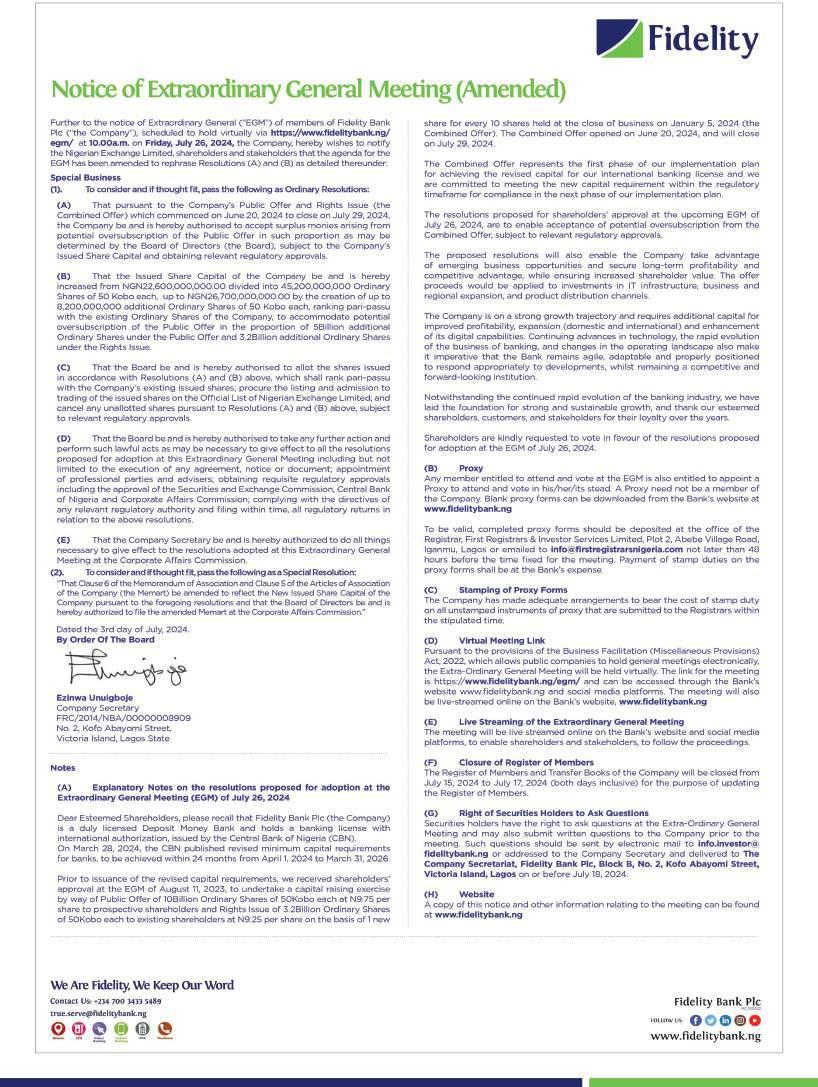
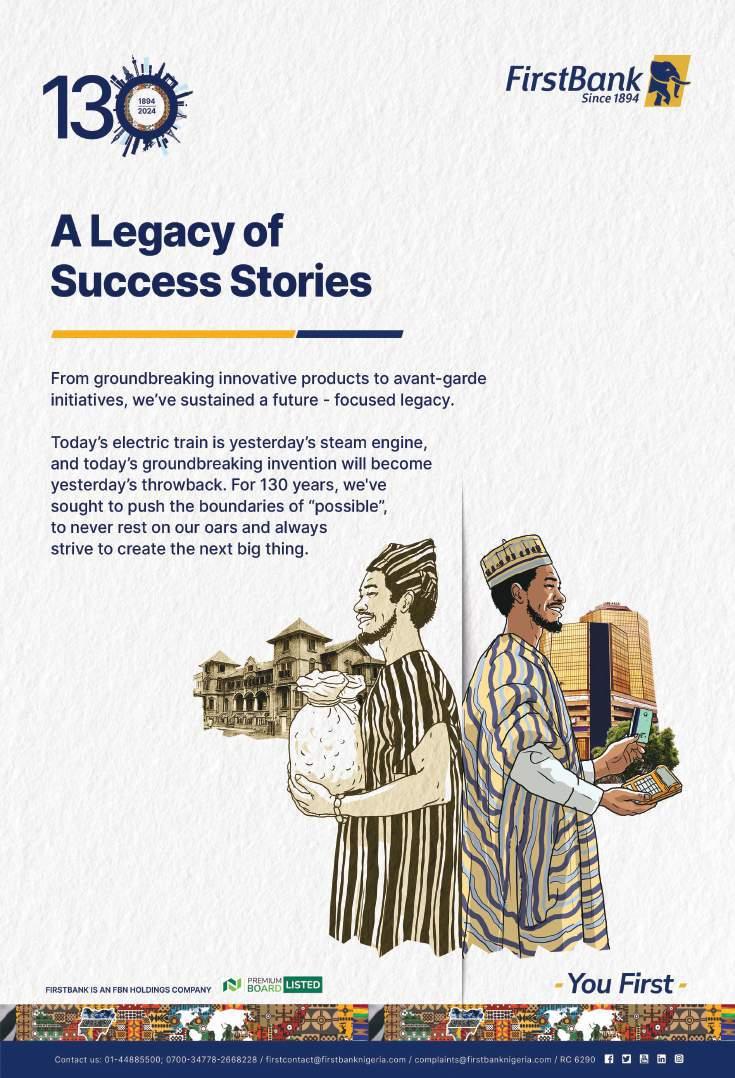
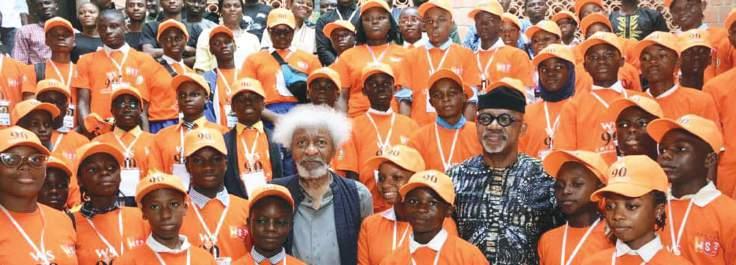
emmanuel addeh in Abuja
President of Dangote Group, Aliko Dangote at the weekend stated that his company’s aim was to become the leading supplier of foreign exchange in the FX market soon, as it targets $30 billion in revenues by the year 2025. During a tour of the Dangote Petroleum Refinery & Petrochemicals and Dangote Fertiliser Limited with media executives, he said the plan was to attain independence from
the Central Bank of Nigeria (CBN) in forex sourcing. A statement from the company stated that Dangote also highlighted a strategic shift in revenue composition within the cement business from the current 75 per cent to 15 per cent in the future.
The expected significant inflow of forex into Nigeria through his businesses, he said, will automatically boost the value of Nigeria’s local currency and make Naira regain its
value in the comity of international currencies all over the world.
According to Dangote, the refinery began full operations in 2024, initially focusing on refining intermediate products such as polypropylene, naphtha, RCO, gasoline, diesel, and jet fuel.
He explained that the refinery entered its steady-state production phase in March 2024, pointing out that he was anticipating production ramp up to 500,000 barrels per day (bpd)
with 15 crude cargoes per month by August, increasing to 550,000 bpd by the end of the year, and aiming for 650,000 bpd by the first quarter of 2025.
“Petrol production is to commence in July with sales from August,” assured Dangote.
Dangote also hinted that the group intends to list both Dangote Petroleum Refinery & Petrochemicals and Dangote Fertiliser Limited on the Nigerian Exchange Group in the
BPP urges lawmakers to halt proposed amendment of public procurement act
Juliet akoje in Abuja
The Chairman of the House Committee on Solid Minerals, Hon Jonathan Gaza, yesterday, revealed that unlawful mining costs the country $9 billion each year, with the only money coming from a three percent royalty paid by the few licenced miners.
This was as the Chief of Defence Staff, General Christopher Musa, disclosed that those involved in illegal mining have connections and so often brag to have links with those at the top.
Also, yesterday, the Bureau for Public Procurement (BPP) urged the House to halt the passage of a bill seeking to amend the Chartered Institute of Purchasing and Supply Management of Nigeria Act, saying the move would largely bring the institute in conflict with the mandate of the Bureau.
Continuing, Gaza, while speaking at a public hearing organised by the House Committee on Solid minerals development on the need to investigate illegal mining in the solid minerals sector said the development had hampered the country's ability to maximise benefits from its mineral resources.
He further said the negative impacts of illegal mining has led to insecurity and conflicts over control of mining sites and their resources.
"These conflicts have escalated into violence thereby exacerbating existing political and social tensions in affected communities which has resulted in the limited data availability and inadequate measures to control this illicit practice.
"This public hearing is aimed to investigate illegal mining activities,
under-reporting (extract E-Products) by mining and quarry licence operators, utilisation of financial interventions in the Nigerian solid minerals sector amounting to trillions of naira within the solid mineral sector and also the Nigeria minerals and Mining Act (Amendment Bill) and Nigeria solid Minerals Development Company (establishment bill) respectively.
"The leadership of the 10th House of Assembly found it expedient and a sense of duty to carry out these investigative hearings to necessitate transparency and accountability, public participation, policy formation and identify challenges and solutions that will ultimately lead to the revamping of our solid mineral sector.
“As we are all aware, illegal mining poses substantial risks to our nation's economy, environment and security."
According to him "The unregulated exploitation of our natural resources jeopardises the sustainability of the mineral sector, leading to environmental degradation and revenue loss that could otherwise benefit our communities and nation as a whole.
“It is imperative that we take as a matter of urgency, decisive steps and necessary action to address this issue and ensure that our solid mineral sector operates within the framework of the law, protecting our natural resources for future generations.
"Furthermore, as representatives of the people, the parliament is deeply worried about the loss of revenue through unregulated and illicit mining operations with the federal government disclosing that unlawful mining costs the country $9 billion each year, with the only money coming from
a three per cent royalty paid by the few licenced miners.
"By attentively listening to their testimonies and perspectives, we can gain a deeper understanding of the challenges posed by illegal mining and develop effective strategies to combat this illicit activity. “Allow me to state emphatically that the time is now, for us to work collaboratively and take immediate and decisive actions to revitalise and develop this critical sector for the overall benefit of benefits all Nigerians while preserving our environment for future generations."
The Director of Operations, Air Vice Marshal Nnaemeka Ignatius Ilo, who represented the Chief of Defence Staff, while speaking on why illegal mining have continued to take place despite move by the federal government to curtail it, said most people involved in the process have connections backing them up, alleging that foreigners also come into the country to carry out the illegal act.
"The involvement of the elites in it, we can't tell, but we know that most of the time when we catch these foreigners, they will tell us that they have connections.
“I don't want to say some things, but sometimes you hand these people over and the next thing you see, they're released. Talking of illegal mining, I'm going to talk about how the military sees it.
“From our various operations and the statistics that we have, we notice that, first of all, the framework guiding mining in Nigeria is very good. It needs to be strengthened. Why do I say so, sir?"
"In 2018 or so, during the last administration, there was a ban
on illegal mining in South Africa, Sinai, Nigeria. Despite that ban, mining licences were being issued to people to mine in that zone. So, the strengthening of the institutional framework is very key.
"The government needs to show their willpower that they actually want to tackle this thing by ensuring that anybody, no matter how highly placed, that is involved in illegal mining, faces the books accordingly."
The representative of Nigeria Army, Tajudeen Lamidi, who also spoke, said the Nigeria Army had arrested 387 individuals in connection with illegal mining.
first quarter of 2025. He said that this initiative would enable Nigerians to participate in the ownership of these companies.
"Due to the nature of our business with both the refinery and the fertiliser, we are aiming to list them by the end of this year. However, depending on circumstances, worst-case scenario, we anticipate listing them before the end of the first quarter of next year. This will allow us to offer shares for sale and enable Nigerians to participate as shareholders," Dangote stated.
The Dangote Refinery, which will process 650,000 barrels per day at full capacity, stands as Africa's largest oil refinery and the world's largest single-train facility, while the Dangote Fertiliser Limited operates Africa's largest Granulated Urea Fertiliser complex. Presently, Dangote Cement is Nigeria's most capitalised company.
While noting that the total storage capacity of the refinery is 4.5 billion litres, sufficient to cover 20 days of Nigeria’s crude requirement and store products equivalent to 15 days of Nigeria’s petrol consumption, he stressed that the refinery would produce 53 million litres of petrol per day and 1.1 million tonnes per day.
He added that the refinery is equipped with dedicated loading gantries featuring 86 loading bays, alongside specialised marine facilities for the offloading of crude and the loading of petroleum products.
Additionally, the facility, he said, includes a 900-kilotonne per annum polypropylene plant, with production capacities of 36,000 tonnes per annum
for sulphur and 585,000 tonnes per annum for carbon black.
Dangote said that over the past four decades, the operations of Dangote Group had evolved significantly from a commodity trading company to a diversified conglomerate.
He emphasised that the transformation was driven by the overarching goal of achieving self-sufficiency in key sectors and bolstering Nigeria's economy.
He noted that the group, which began as a trading company in 1978, has expanded into a diversified conglomerate with investments spanning cement, agriculture, fertiliser, petrochemicals, oil & gas, auto assembly, infrastructure, and other sectors.
He said the group was driven by the idea that Africa’s future prosperity hinges on its ability to harness its own resources and capabilities. Dangote stressed that the continent inadvertently imports poverty and exports jobs by exporting raw materials and importing finished goods.
Also speaking, the Vice President, Oil and Gas, Dangote Industries Limited, Devakumar Edwin, reiterated the commitment of the company in enhancing local capacity in critical sectors of the economy. He said Dangote Industries Limited has empowered young Nigerians to assume key roles across its operations, with many even becoming expatriates in other nations.
Bintube recounts how Dangote rescued venture from collapse
James emejo in Abuja
Chairman, Jaiz Bank Plc, Alhaji Mustapha Bintube, has disclosed plans to grow its capital threshold to N70 billion by the end of the year.
Speaking at a send-off ceremony for 11 retired board members, including the bank's pioneer Chairman, Alhaji Umar Abdul Mutallab, in Abuja, Bintube further declared that the bank recorded profit of N11 billion in 2023.
He said as of June 30, 2024, the bank had already surpassed the last year's profit, indicating robust growth and operational success.
Jaiz Bank and other non-interest banks have till March 31, 2026 to shore up their capital base to N20 billion to qualify for a national banking licence
as directed by the Central Bank of Nigeria (CBN) under the current banking system recapitalisation drive.
However, the Jaiz Bank chairman said, "Our major dream is to expand our presence globally."
He also reflected on the bank's humble beginning in 2012 with an initial capital of N6 billion, attributing its success to the dedicated team and strategic partnerships, that have enabled its growth and resilience in a competitive financial sector.
Bintube also relished the bank's aggressive expansion drive, increasing its branches from the initial three in Abuja, Kaduna, and Kano to currently 54 branches, with plans to reach 60 branches by year-end.
However, in his remarks. AbdulMutallab, expressed his pride in the
bank's achievements as the country's first non-interest Islamic bank. He commended the efforts of various institutions, particularly the Islamic Development Bank (IDB), which played a crucial role in the bank's establishment.
He recounted the challenging early days when the bank's promoters had only N4 billion, adding that it was the timely intervention of Africa's richest man, Alhaji Aliko Dangote, who provided N1 billion to meet the N5 billion required for registration, pointing out that this gesture saved the venture from collapse. Abdul-Mutallab specifically commended former CBN Governor, Sanusi Lamido Sanusi, for his encouragement and support in realising the aspirations of Jaiz Bank.

Contrary to the position of Nigeria’s local oil refineries that International Oil Companies (IOCs) in Nigeria were refusing to sell crude to them, the Nigerian Upstream Petroleum Regulatory Commission (NUPRC) yesterday said the assertion was erroneous.
Chief Executive of the commission, Gbenga Komolafe, who spoke on Arise Television, THISDAY’s broadcast arm, stated that rather it was a willing-buyer, willing-seller market where players are allowed to make decisions, but within the precincts of the law.
Komolafe was responding to a question on why the NUPRC, the upstream regulator, has not been able to ‘whip’ the IOCs into line after the modular refineries first complained of lack of feedstock, then followed by the Dangote refinery which had accused the multinationals of declining to sell.
“Section 109 of the Petroleum Industry Act (PIA) actually provides for enforcement of Domestic Crude Supply Oil Obligation (DCSO)...And I need to say that there's a provision for willing buyer, willing seller in the PIA.
“To say the least, crude oil supply follows international principle, crude being an international citizen. And the commission came out, and as I speak, have been able to proactively put in place what we call the rule of engagement between parties.
“Again, having done that, we realised again that the domestic refiners came up with the issue of pricing. And we reviewed that issue. And like I said, the commission is guided by the principle of willing buyer, willing seller.
“So, one thing we need to avoid as a nation is that in setting crude oil price in the upstream, we must avoid the pitfall in the downstream
aspect of the industry, that created what we call under-recovery, and of course, the subsidy phenomenon.
“So we are trying to avert in the upstream the possibility of having under-recovery in a manner that it will be a disincentive to investment in the upstream,” Komolafe said.
To the best of the knowledge of the commission, Komolafe said he was not aware that any IOCs was not complying with their statutory obligations to make crude available.
“I think that is erroneous, and I need to make that very clear. So, the IOCs or other producers, none of them is refusing to comply with the provisions of the law of the Federal Republic of Nigeria, and the commission is in no way shying away from this. I think there's a wrong perception here.
“It is not as if any producer is refusing. No producer is refusing to make crude available to Dangote Refinery or any domestic refinery whatsoever,” he added.
On crude oil losses, Komolafe stressed that up to 40 per cent of what was believed to be oil theft in Nigeria could be attributed to metering inaccuracies, which he said the agency was working to rectify.
“The NUPRC, upon assumption of duty indeed commissioned an independent study, and that study revealed that we were losing, as at the time we were losing about 100 to 120,000 barrels of crude per day.
“But the good thing now is that we’ve witnessed a drastic reduction in the volume of crude oil theft that we were experiencing arising from the multi-faceted actions being taken by the general security services, the NNPC and the regulators.
“So, there has been concerted approach by government in trying to curtail the menace of crude oil theft in Nigeria,” he stressed.
With the Nigerian upstream petroleum measurement regulation, he said this would ensure that engineering
integrity audits would be conducted on metering stations across 187 flow stations to ensure that all meters are delivering according to industry and liable specification standards.
“In the course of the independent integrity audit, it was revealed that about 40 per cent of what is adjudged crude oil theft actually are attributable
to what is called metering inaccuracies.
And if this is ‘fiscalised’, we’ll realise that the nation will be saving billions of dollars annually,” Komolafe added. He argued that the issue of crude oil theft was affecting Nigeria not only in terms of the volume that it loses as a country, but also that it's serving as a disincentive to investors.
“No investors would want to put his money in a manner that the investor loses his investment. So, to that extent, of course, we've been experiencing divestment recently from the onshore terrains to the offshore.
“And one of the factors that has led to that is that investors, the IOCs, they recognise the fact that it is safer for them to reorder their portfolio and relocate to safer source in the course of their investment.
“That is the offshore area where they feel that their investment will be protected better than the onshore. So that in itself is a pointer to the fact that the onshore areas are more prone to crude oil theft,” he added.
John Shiklam in Kaduna
Beginning from this year, every polytechnic student must undergo a Mandatory Skills Qualification (MSQ) before graduation.
Executive Secretary of National Board for Technical Education (NBTE), Dr. Idris Bugaje, announced this at a press conference at the board's head office yesterday, in Kaduna.
He also said the recently approved schemes of service for the polytechnic sector required that Principal/Chief Lecturers must have doctorate degrees.
Bugaje, said the policy was a major paradigm shift in polytechnic education in Nigeria, "so that we produce diploma holders with skills."
He noted that while polytechnics demand for parity between universities, masters degrees cannot be allowed to be the highest academic qualification in the polytechnics.
The NBTE boss said with the new system, indolent academics who, in the past, had been hiding in polytechnics to avoid doctorate degrees shall henceforth, have no hiding place anymore.
"You cannot give what you don’t
have and that is why the NSQ was introduced for the promotion of lecturers who should drive the programme.
"This requirement will additionally make Polytechnic lecturers unique, having both academics and hands-on skills," Bugaje said.
According to him, the approved schemes of service for the polytechnic sector had been circulated and proposals for amendments of grey areas had been submitted to the Head of Service of the Federation ( HoSF), Folasade Yemi-Esan.
Bugaje said, "The 2024 schemes is a revolutionary document with its recognition of HND holders for the first time, as Graduate Assistants like their university counterparts in our polytechnics.
"It also requires Principal/Chief Lecturers to have doctorate degrees.
"This requirement cannot be negotiated. This is because while we ask for parity between universities and polytechnics, we can't allow the highest academics in polytechnics to have a master's degree only.
"The indolent academics who, in the past, run and hid in polytechnics to avoid doctorate degrees, shall
David-Chyddy Eleke in Awka
United Nations Children's Fund (UNICEF) has held a stakeholders’ meeting for governments in the South-East to seek implementation of child-friendly budgets.
The one-day engagement featuring policy makers in the budgeting process in the five South-East states was attended by commissioners of budget and planning, permanent secretaries in the ministry and other key players, all from the South-East states.
Speaking at the meeting, the UNICEF Chief of Field Office, Enugu,
Dr. Olusoji Akinleye, who spoke on behalf of the UNICEF Representative in Nigeria, said the dialogue was conceptualized under the UNICEF framework for Public Financing for Children (Pf4C).
He said: "This is important and timely at this time considering that we are at a crucial time of government’s budgeting activity as states commence formulation of their 2025 budgets. "As UNICEF, we are particular about supporting government's efforts in identification and inclusion of budget priority areas that enhance human capacity development, support the attainment of the sustainable
development goals.
"This dialogue, therefore, hopes to engage states to collaboratively chart a path to adequate and sustainable financing, especially for the social sectors. We are sure that, through this dialogue, states would be provided the opportunity to exchange ideas, challenges and best practices related to budget formulation and implementation.
"We are positive that the commitments shown by the states here will lead to improved programming efficiency, value for money, capacity building, and improved budget outcomes for the states, especially
for its children.
"UNICEF seeks to catalyse on the positive recommendations from this policy dialogue to ensure a brighter, healthier future for Nigerian children."
Earlier, the Resident and Humanitarian Coordinator of United Nations activities in Nigeria, Mr. Mohammed M. Malik Fall, expressed the desire of the UN in supporting the states, and ensuring that the outcome of its deliberations are achieved.
Fall said: "We are looking forward to seeing the outcome of this dialogue and also I assure that we are ready to ensure its realization. We wish you a wonderful brainstorming session."
henceforth have no hiding place anymore."
Commenting on a clause raised by the Academic Staff Union of Polytechnics ( ASUP) on the introduction of the Nigerian Skills Qualification (NSQ) certificate for the promotion of lecturers, Bugaje said, "the NSQ is not an informal qualification as misjudged by ASUP," because it is already approved and recognised in the National Schemes of Service."
He said, henceforth, all accreditations in state polytechnics shall be strictly on academic programmes to ensure standards are maintained. Bugaje appealed to President Bola Tinubu, "to kindly extend the tenure of the HoSF to enable her complete the final schemes of service for the polytechnic sector before retiring.
Emmanuel Addeh in Abuja
The second edition of the Cultural Oneness Festival by Taste of Afrika, which aims to foster unity among African traditional institutions and promote cultural exchange for continental visibility and economic empowerment, has been slated for November 2024 in Northern Ghana.
The ultimate mission of the Taste of Afrika initiative, the organisation said, is to strengthen the underlying kinship and cultural bonds among Africans living on the continent and people of African descent in the Diaspora.
A statement by the group said that this is partly by highlighting their common origins while celebrating their cultural diversity as one people to effect the tourism, arts and cultural diversity goal.
The four-day festival's activities will comprise cultural roots tours, Durbar of Kings and Chiefs, Street Carnival/Exhibitions, Fashion Show, Business/Youth Empowerment Forum and a grand Musical Concert to climax the event.
Chief Executive of The Taste Of Afrika Ltd, Tengol Kplemani, emphasised the festival's mission.
"Our mission is to promote unity and diversity through cultural
exchange and continental visibility for economic empowerment. The festival will serve as a platform for various traditional rulers, kingdoms and leaders from across the continent to come together, share their rich cultural heritage, and collaborate on ways to advance their communities,” he said.
The Cultural Oneness Festival Country Director for Nigeria, Kazeem Balogun, echoed Kplemani's sentiments, highlighting the importance of unity among African traditional institutions.
"It is imperative for the African traditional institutions to come together, more under a unified front for the progress of the continent, and that's what the Cultural Oneness Festival aims to achieve," Balogun stated. Consequently, the upcoming event will provide a unique opportunity for traditional rulers and their kingdoms to engage in meaningful dialogue and create strategies for the collective advancement of the continent.
Furthermore, the Cultural Oneness Festival, the organisers said, has received significant endorsement from prominent African leaders, including former Nigerian President, Chief Olusegun Obasanjo.


Emmanuel Addeh in Abuja
A US judge in Florida yesterday dismissed the criminal case accusing Donald Trump of illegally keeping classified documents after leaving office, handing the Republican former president another major legal victory as he seeks a return to the White House.
US District Judge Aileen Cannon, who was appointed to the bench by Trump, ruled that Special Counsel Jack Smith, who is leading the prosecution, was unlawfully appointed to his role and did not have the authority to bring the case.
The judge found that US Attorney General Merrick Garland, who named
Deji Elumoye and Sunday Aborisade in Abuja
The main drivers of Nigeria's economy met with the Finance Committee of the National Assembly yesterday in Abuja and declared that the ailing economy was getting revitalised, based on emerging indicators.
Group Chief Executive Officer of the Nigerian National Petroleum Company Limited (NNPCL), Mele Kyari, said the Port Harcourt refinery would start production by early next August. Kyari said this would be followed by the Warri refinery months after, and Kaduna refinery, latest, by December.
He was confident that based on emerging indicators in the energy and gas sector, Nigeria would be a net exporter of petroleum by December.
In a related development, the federal government announced the immediate dispatch of 740 lorry loads of rice to the 36 states of the federation and the Federal Capital Territory (FCT) to cushion the effect of food shortage across the country. Minister of Information and National Orientation, Mohammed Idris, disclosed this yesterday to newsmen at State House, Abuja, after the Federal Executive Council (FEC) meeting.
Idris also hinted that the federal government might amend the 2024 budget to accommodate the new minimum wage.
The senate committee’s meeting with the economic team of President Bola Tinubu was attended by Minister of Finance and Coordinating Minister of the Economy, Mr Wale Edun; Minister of Budget and National Planning, Senator Atiku Bagudu; and Minister of State for Petroleum Resources, Senator
Month-on-month, the core index increased by 0.05 per cent to 2.06 per cent in June, compared to 2.01 per cent in May.
However, food inflation was attributed to increases in prices of millet, whole grain, garri, guinea corn, etc. (bread and cereals class), yam, water yam, coco yam (potatoes, yam and other tubers class).
Others were groundnut oil, palm oil, etc. (oil and fats class) and catfish dried, dried fish-sardine, mudfish (fish class), among others.
On the other hand, core inflation resulted from highest price increases in rents (actual and imputed rentals for housing class), journey by motorcycle, bus journey intercity (under passenger transport by road class).
Other contributors included accommodation service, consultation fee of a medical doctor, laboratory service, x-ray photography (under medical services class), and pharmaceutical products.
Year-on-year, urban inflation rose by 12.23 per cent to 36.55 per cent, compared to 24.33 per cent in June 2023. On month-on-month basis, the index increased to 2.46 per cent, from 2.35 per cent in June.
Rural inflation rose to 32.09 per cent, a 10.71 per cent year-on-year
Smith in 2022 to oversee investigations involving Trump, did not have the authority "to appoint a federal officer with the kind of prosecutorial power wielded by Special Counsel Smith," Reuters reported.
Cannon also found that Smith's investigation has been improperly funded through a permanent and unlimited fund Congress set aside in the 1980s for independent investigations. It marked another blockbuster legal triumph for Trump.
The US Supreme Court ruled on July 1 that Trump cannot be prosecuted for actions that were within his constitutional powers as president - a landmark decision recognising for the first time any form of presidential
Heineken Lokpobiri. Others were Kyari; Governor of Central Bank of Nigeria (CBN), Mr Yemi Cardoso; and Chairman of the Federal Inland Revenue Service (FIRS), Zacch Adedeji, among others.
Kyari told the committee that in a few months from now, the country’s oil production level would hit two million barrels per day.
He stated, "Mr. Chairman and members of the joint committee, let me just give confirmation that NNPCL and the oil and gas industry are very critical in bringing a turnaround in our current economic situation, and we understand the importance of this. We are taking every step that is practical for us to achieve this.
"We have already seen growth in our oil and gas production because of certain actions that Mr. President personally took, and also the very mere truth that we have also declared a war on production activities, and this is yielding the required results.
"The combination of these two has now seen us restoring production in our country, and we believe that, as the Honourable Minister has said, we will soon hit the target of two million barrels oil production per day.
"I'm aware that there are several comments in the public space around refining business and domestic production, including production that will come from the commissioned Dangote refinery.
"Yes, this country, as we have said, will be a net exporter of petroleum products by the end of this year.
"We're very optimistic that by December, this country will be a net exporter. That means a combination of production coming from us, and also from Dangote refinery and other smaller producing companies that we
increase, compared to 21.37 per cent in June 2023.
Month-on-month, rural inflation stood at 2.17 per cent, compared to 1.94 per cent in May. At state level, the all Items inflation, year-on-year was highest in Bauchi (43.95 per cent), Kogi (39.91 per cent), and Oyo (39.15 per cent), while Borno (25.90 per cent), Benue (27.52 per cent), and Katsina (29.21 per cent) recorded the slowest rise.
On month-on-month basis, however, the headline index recorded highest increases in Yobe (3.79 per cent), Abuja (3.45 per cent), Ondo (3.38 per cent), while Nasarawa (0.71 per cent), Osun (1.19 per cent) and Kano (1.27 per cent) recorded the slowest rise.
On annualised basis, food inflation was highest in Edo (47.34 per cent), Kogi (46.37 per cent), Cross River (45.28 per cent), while Nasarawa (34.31 per cent), Bauchi (34.78 per cent) and Adamawa (35.96 per cent), recorded the slowest rise.
Month-on-month, the highest food prices were recorded in Yobe (4.75 per cent), Adamawa (4.74 per cent), and Taraba (4.12 per cent), while Nasarawa (0.14 per cent), Kano (0.96 per cent) and Lagos (1.25 per cent) recorded the slowest rise.
immunity from prosecution. That ruling involved charges pursued by Smith in a separate case against Trump in Washington involving his efforts to overturn his 2020 election loss.
Cannon's ruling came two days after Trump was the target of an assassination attempt at a campaign rally in western Pennsylvania. Trump is set to be formally named the Republican presidential nominee in Milwaukee this week, challenging Democratic President Joe Biden in the November 5 US election.
Prosecutors are likely to appeal Cannon's ruling. Courts in other cases have repeatedly upheld the ability of the US Justice Department to appoint special counsels to handle certain
know are in line to do this.
"So I can confirm to you, Mr. Chairman, that by the end of the year, this country will be a net exporter of petroleum products.”
Kyari also said, "Specific to NNPC refinery. We have spoken to a number of your committees that it is impossible to have the Kaduna refinery come to operation before December, it will get to December.
"Both Warri and Kaduna, but that of Port Harcourt, will commence production early August this year."
politically sensitive investigations.
Trump, in a social media post, said Cannon's ruling should be a "just the first step" and called for the dismissal of all four criminal cases against him.
"Let us come together to end all weaponisation of our Justice System," Trump wrote.
Trump was convicted in May on New York state felony charges involving hush money paid to a porn star to avert a sex scandal before the 2016 election. Trump had pleaded not guilty in the documents case and in Smith's other case, as well as to election-related charges in state court in Georgia.
Meanwhile, Trump yesterday
In his presentation, the CBN governor, represented by Deputy Governor (Economic Policy), Muhammad Abdullahi, said the triple challenges of rising inflation, foreign exchange rate fluctuation, and food inflation, would take downward trend soonest, as indicators to that effect were already emerging.
Bagudu said the 2024 budget was already being implemented and that there was an ongoing negotiation with labour leaders on minimum wage to ensure that there were no
named Senator James Vance of Ohio as his running mate, choosing a onetime critic who became a loyal ally and is now the first millennial to join a major-party ticket at a time of deep concern about the advanced age of America’s political leaders.
“After lengthy deliberation and thought, and considering the tremendous talents of many others, I have decided that the person best suited to assume the position of Vice President of the United States is Senator J.D. Vance of the Great State of Ohio,” Trump said in a post on his Truth Social network.
The 39-year-old Vance rose to national fame with the 2016 publication of his memoir, “Hillbilly Elegy.”
further disruptions to the economy.
Senator Musa, on his part, appealed to Nigerians to persevere as government was working to stabilise the economy.
He stated, "Our critical interactive session with you as managers of the economy, is about economic growth. It's about how we can get our policies to work. How we will support Nigerians.
"The National Assembly is very concerned because we are the representatives of the people.

And we are obliged to ask what is happening. And this is the reason for the meeting.
"And as we have heard from you, at least, you have given us preambles of the activities going on. On how our economy can get back to track.
"You are all aware of the obstructions our economy has had in the previous years. And it's not going to be that easy overnight, in 365 days or in one year of the coming
Continued on page 29
Former Commonwealth SecretaryGeneral, Chief Emeka Anyaoku, President of the Senate, Senator Godswill Akpabio, and Governor of Enugu State, Dr. Peter Mbah, yesterday, extended congratulations to media mogul and Chairman of THISDAY/ ARISE Media Group, Prince Nduka Obaigbena, on the occasion of his 65th birthday.
In a statement, Anyaoku described Obaigbena as a great trailblazer in the advancement of media services across the African continent. He noted Obaigbena’s career as a transformative leader, who had made significant contributions to the industry.
Anyaoku stated, “Hail to a giant media mogul in Africa on his 65th birthday. Prince Nduka Obaigbena is a great trailblazer in the expansion of media services on the continent of Africa. From the publication of THISDAY Newspapers to ARISE Television broadcast in Nigeria and many countries abroad, to the promo-
management culture, adherence to regulations, capital adequacy, and maintenance of low non-performing loan levels.
Addressing capital market stakeholders, investors, and analysts at the event in Lagos, the Group Managing Director/Chief Executive Officer, Dr. Adaora Umeoji, highlighted the financial institution’s tier-1 capital of N1.8 trillion, shareholders’ funds of N2.3 trillion, market capitalisation of N1.3 trillion, a profit before tax of N796 billion, and a dividend of N4 per share for the year ended December 2023.
Providing guidance for 2024, she noted that, given the trend of the bank’s performance and having achieved a profit before tax of N796 billion in 2023 and N320 billion in the first quarter of 2024, the bank was on track to deliver over N1 trillion in profit before tax in 2024. She expressed confidence that, with the quality of the board and management and a strong corporate culture, the bank was well-positioned to deliver superior value to investors and other stakeholders and to navigate the
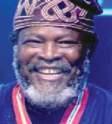
tion of African fashion and ARISE Play Originals Awards Contenders.
“Your footprint in the media and media-associated industry has been truly transformative. And so I celebrate you on this your birthday and wish you many more years in good health of your continued innovative career.”
Akpabio, in a congratulatory message by his Special Adviser on Media and Publicity, Hon. Eseme Eyiboh, described Obaigbena as a pillar of
recapitalisation process successfully. She also disclosed some of the bank’s future plans, which include driving financial inclusion, expanding corporate and retail banking through technology and other state-of-the-art digital platforms, and establishing a fintech subsidiary, ZenPay, to drive profitability. Additionally, the bank intends to expand to France and other Francophone African countries.
Umeoji explained, “For us at Zenith, we won’t be left out. We are planning to go to the market to raise capital, and as it stands, Zenith Bank has the least amount of capital to raise. We are looking to raise N230 billion because we are already at N270.7 billion. That is the least capital to raise among our peers. We believe that Zenith Bank has what it takes.
“We have the capacity, the network, the balance sheet, the human capital, and the track record to achieve that. We are planning for the future, and the technology we have now is the best in the entire industry. It will help us to have a seamless process and integrate.”
media development in Nigeria.
He said Obaigbena revolutionised modern journalism practice in the country, describing him as a trailblazer, astute businessman, and entrepreneur.
Part of the statement read, “On behalf of my family, constituents and the National Assembly, I wish to heartily rejoice with a trailblazer, an astute businessman and entrepreneur, and a respected son of the Niger Delta and Nigerian of repute, Chief Nduka Obaigbena, on the occasion of his 65th birthday.
“I am very proud of the Duke of Owa Kingdom for his ingenuity, vision and developmental strides in journalism and media, generally, both locally and internationally. My brother, I must say that you have raised the bar in the media industry and set a standard that is worth upholding.
“As you turn 65, it is my prayer that God Almighty will bless you with more decades of excellent health, strength and wisdom to continue to contribute your quota to the growth of journalism and media practice and
Also speaking, the Chief Financial Officer/General Manager, Dr Mukhtar Adam, pointed out that in the last five years, the bank’s Compound Annual Growth Rate (CAGR) in revenue has grown by over 27 per cent. “This continues to grow year-on-year. Within this period, at some point, Nigeria went into recession, but we forged ahead, worked very hard, and continued to deliver growth. Within the last five years, our profit before tax has also grown cumulatively by about 28 per cent. This is a market where, at some point, government instruments – treasury bills – were paying one per cent, two per cent, three per cent. But we forged ahead to grow the numbers and provide stable returns of at least 28 per cent.”
Zenith Bank recently emerged as the Best Commercial Bank, Nigeria, in the World Finance Banking Awards 2024, retaining the award for the fourth consecutive year. The bank was also named Best Corporate Governance, Nigeria, for the third year running in the World Finance Corporate Governance Awards
the development of Nigeria, generally. Happy birthday and congratulations.” Mbah described Obaigbena as a disruptive innovator in the African media industry.
In a congratulatory message, the governor called Obaigbena “a bold entrepreneur, who dares to dream big”. The message read, “Hearty congratulations to a media entrepreneur par excellence, who has proven himself a disruptive innovator in the Nigerian and African media space, contributing immensely to the advancement of the industry.
“Over the years, you have proven yourself an insightful and trailblazing media mogul, who dares to dream big and has a tremendous staying power to nurture the dreams to fruition.
“From politics to economy, sports, entertainment, among others, you have positively impacted virtually every sphere of our national and, indeed, African life.
“This is, therefore, wishing you a happy birthday and many more returns in good health and excellence. Congratulations!”
2024. The awards, published in the Summer 2024 issue of World Finance Magazine, recognise the bank’s robust financial performance, superior customer service, sustainability initiatives, and corporate governance practices. Commenting on the dual honours, Umeoji had said, “These awards highlight our steadfast dedication to excellence, adherence to global best practices, and our persistent effort to deliver superior value to all stakeholders through innovative products and services. Receiving these awards consecutively for multiple years signifies the commitment of our staff, the loyalty of our customers, and the support of our shareholders. We remain devoted to setting industry benchmarks and driving excellence across all aspects of our operations.” Umeoji had also expressed delight at the recognition and dedicated the awards to the Founder and Chairman, Dr. Jim Ovia, CFR, for his impactful leadership in establishing a robust and flourishing institution.

08033025611
The decision of the 10th Senate leadership to shift plenary period which used to be between 10am and 2pm, to 11am and 3pm, caused a mild drama on the floor of the Senate last Thursday, reports Sunday Aborisade
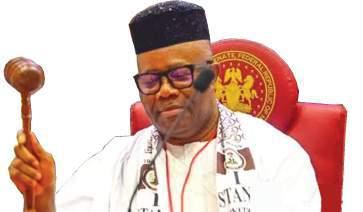
The Senate last Thursday amended its Order Paper to henceforth hold Plenary from 11am to 3pm after the Senate Leader, Senator Opeyemi Bamidele, had raised two motions at the commencement of plenary.
One of the motions was an amendment to the standing rules which proposed that the Senate shifts the timing it’s sittings on Tuesdays, Wednesdays and Thursdays from 10am to 11am, and close by 3pm like their counterpart in the House of Representatives.
The Senate Leader also moved his second motion on Standing Committee’s Amendment of order 96 to create the Senate Committee on Reparation and Repatriation.
However, the second motion was stepped down as senators opted to debate on the issue of sitting time.
While lending his voice to the issue, Senate President, Senator Godswill Akpabio had indicated that the most urgent motion was to align the time of resumption of plenary with what is obtainable in the House of Representatives.
He suggested that the motion should be separated
and that the first one to be taken should be the time of sitting.
However, the immediate past President of the Senate, Dr Ahmad Lawan while making his contribution, disagreed with Akpabio.
Lawan said, “I don’t know the basis at the moment for which we want to shift our sitting from 10 to 11 and end at 3pm, for me, we have more energy, our eyes are clearer in the morning and one hour into the day, probably we would have lost some energy.
“If we work between 10am and 2pm, if we sit in the plenary between 10am and 2pm, our committees would do better. If we don’t have any reason except we have to synchronize with the House, I think we need to look at it again.
“However, if we have other reasons that we must change, that is fine. If it is just to synchronize with the House that may have their reasons for sitting at 11 and close by 3pm but here I don’t see the reasons.”
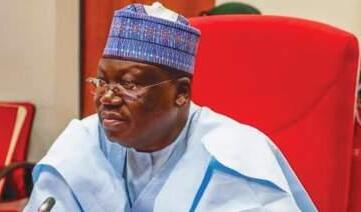
Responding, Akpabio threw it back at Lawan that the idea of the Senate sitting by 11am started during his time as the President of the 9th Senate especially during the period of the COVID-19.
But Lawan instantly reacted by saying it was adjusted as a result of the COVID-19 pandemic that the time was tinkered with from 10am to 11am adding that they also had to cut down on the number of days for plenary.
Akpabio then replied and said, “Our rules said 10am but we came to meet the tradition of 11am, the only thing that we changed was to add additional day because during that COVID-19 period we were sitting twice a week.”
He said, “I said no, since there is no more COVID we should sit three times in a week and we maintained what we saw, 11am but now we are saying that we have not been able to justify the 11am sitting unless it reflects same on our rules.
“The Idea of (closing by) 3pm in my view is not correct because it does not mean you must sit till 3pm, it simply means if we don’t have much to do we can close at 1pm or 2pm to enable our colleagues to go for committee sittings and other
matters related to the proceedings of the Senate such as clearances and all that.
“The only aspect of it is to legalise it so that people don’t have the impression that you are sitting at 11am while the rule says 10am.
THISDAY checks revealed that since the inauguration of the 10th Senate in June, 2023, plenary session that was originally scheduled to start by 10am usually starts from 11am due to the leadership habit of lateness to the federal parliament.
Rule 8 sub-section (2) of the Senate Standing Rule (as amended) states: “On Tuesdays, Wednesdays and Thursdays, the Senate shall meet at 10:00 a.m. and unless previously adjourned shall sit until 2:00 p.m., unless before a substantive motion had been moved by the Leader of the Senate or a Senator acting in that capacity “that this Senate do now adjourn” and if such a motion be moved and if the question thereon has not previously been determined, at 2:00 p.m. the President of the Senate shall adjourn the Senate without question being put.”
However since the coming on board of the current leadership of the 10th Senate, the plenary has always been held from 11am to 3pm.
To mark his first year in the 10th Senate, Senator Osita Izunaso who represents Imo West Senatorial district returned home recently to present his score card to his constituents, Tony Icheku reports.
Lawmaking and representation are among the basic functions of legislators and to best advance the interests of constituents lawmakers need regular engagements with constituents through town hall meetings, and other public interactions to gather updates and feedback so as to be properly guided in advocating on their behalf.
When Senator Osita Izunaso held a Town Hall meeting/briefing on Saturday, July 6, 2024, it was for him to present his score card of his first year performance in the Senate.
Izunaso described his outing so far in the Senate as a session of promises kept, maintaining that he has been a strong voice for his constituents, effectively representing their interests. He said: “Within the first three months, I moved a motion in the Senate asking for political solution for the release of Nnamdi Kanu”. The significance of this motion is not lost on his constituents who live daily in fear and uncertainty due to fragile security situation the continued incarceration of the IPOB leader has created not only in Imo West or Orlu zone of Imo State, but across the five States of the South-East. He assured that discussions for the release of Kanu is ongoing at the highest level in the country Izunaso further added that within the period under review, he had sponsored and supported sensitive motions and bills on education, healthcare and the economy that aims to guarantee improved socio-economic status of the people.
Perhaps, his motion for the creation of Orlu State found more resonance with the people. He reminded them that he promised to agitate for the creation of Orlu State and noted that his bill which has passed first reading has set the process in motion.
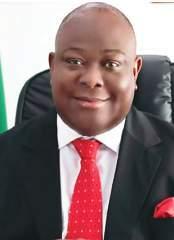
He pointed out that with 12 local government areas already, the proposed State has great chances of being created. But taking a historical tour of how old Anambra and Imo States were carved out to produce additional three States, the lawmaker
explained that some LGAs may be carved out from Anambra State to form the proposed State. Other moves towards the realisation of the proposed State is the formation of Movement for Creation of Orlu State which would be inaugurated soon.
Another bill, Izunaso said would impact significantly on the people is the South East Development Commission bill which he said is awaiting Presidential assent.
The lawmaker specifically proffered his interventions aimed at promoting economic growth, infrastructure development, and social welfare of his senatorial district.
He mentioned projects already taken off or soon to be flagged off to include the construction of 1000-seater ultra modern conference halls across the 12 LGAs as well as the ‘Light Up Orlu’ project to provide street lights in the district. He also disclosed that several schools and hospitals have been earmarked for rehabilitation.
Projects targeting individuals include award of 200 scholarships to students; Training of 12,000 youths, 1000 per LG in Artificial Intelligence; Distribution of 1,200 bags of fertilisers to farmers; Training of interested individuals in modern agricultural methods and fisheries and an on-going Revolving Credit Scheme for Women, which so far has enrolled 375 beneficiaries.
Izunaso also announced that he had entered into a partnership with the Michigan State University, USA which will have significant rub off on the Kingsley Ozumba Mbadiwe University, the second State-owned university located in the senatorial district.
According to him, specific benefits of the partnership include two scholarships (one for persons with
disability) per annum for Orlu students and one technical scholarship per annum to run in perpetuity.
On industrialisation and job creation, the lawmaker lauded the $1 billion Gas Plant being built by Governor Hope Uzodimma using an AFREXIM Bank facility, a project he predicted would trigger off similar projects including gas plants for conversion of gas to electricity. He submitted that with 200 trillion standard cubic feet of gas, Imo State has the highest deposit of gas in Nigeria.
For more interaction with his constituents, Izunaso promised to henceforth hold live interactive session with them twice monthly.
Summing up, he disclosed that his greatest achievement so far is promoting collaboration between the Federal Government and imo state government.
Izunaso, who is Chairman of Senate Committee on Capital Market is not a newcomer to the National Assembly, having served in the Green Chamber before getting elected to the Senate.
His experiences and dedication are contributory to his firm commitment to ensuring that the Capital Markets evolve to benefit every one. His colleague, Senator Adetokunbo Abiru, the Chairman, the Senate Committee on Banking, Insurance, and Other Financial Institutions, described him as a Senator with great sense of cohesion, unity, and good understanding of Nigeria
The occasion which held at Nkwerre Country Club had in attendance movers and shakers in Orlu including traditional rulers, clergy, market women, captains of industry, business moguls, different cultural, youth and political groups including Justice P.C. Onunihu, a retired Chief Judge of the State and Chairman of the occasion.
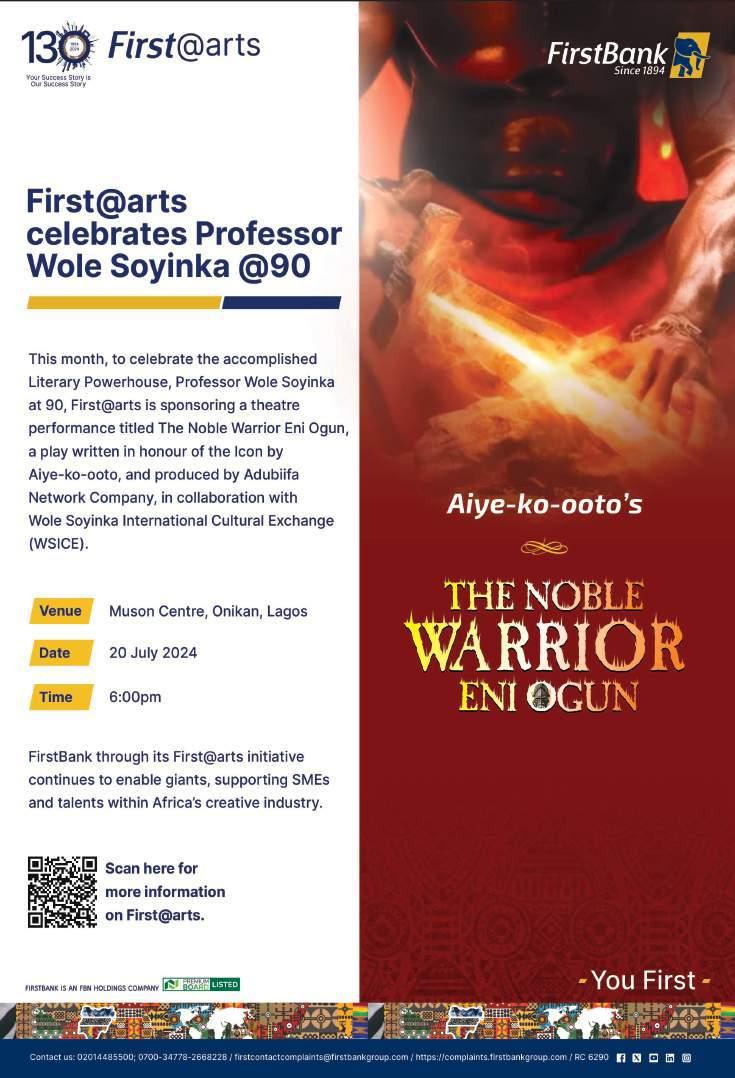
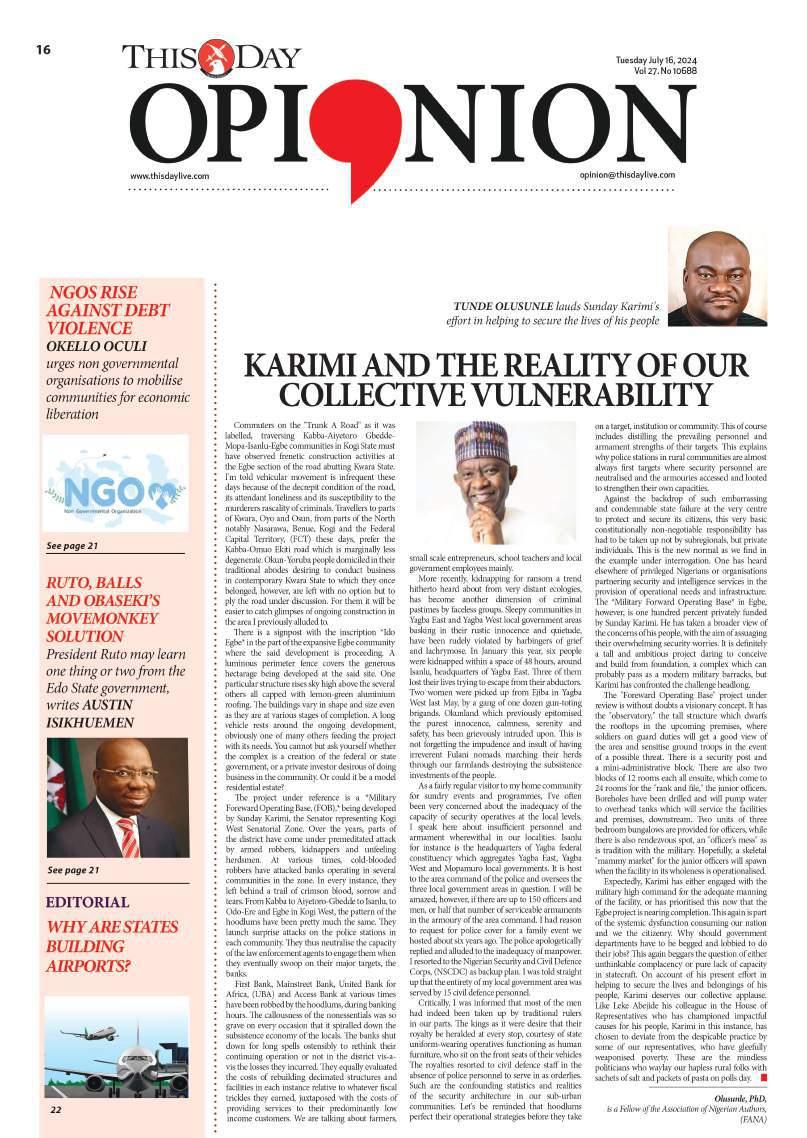

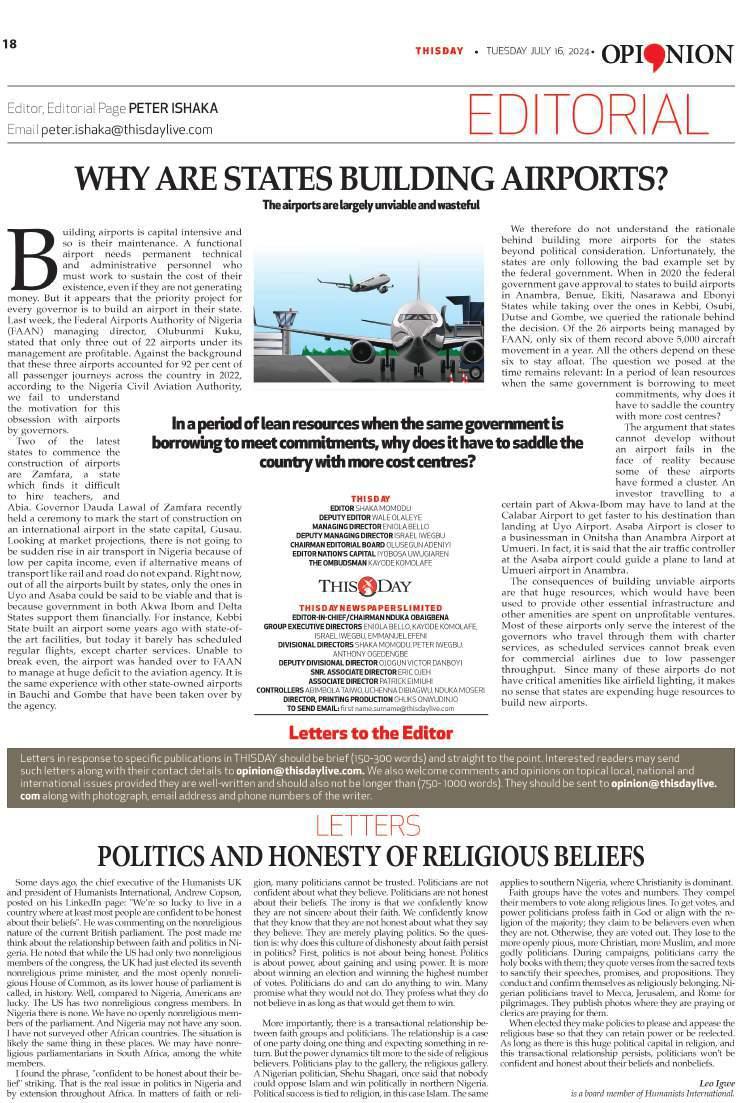
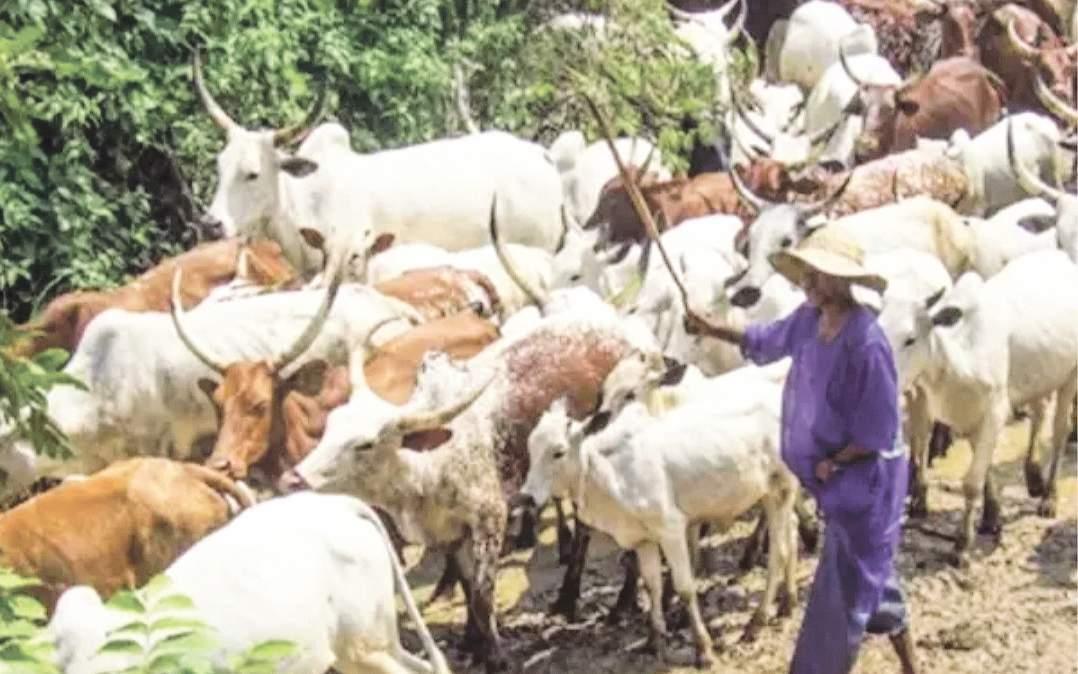
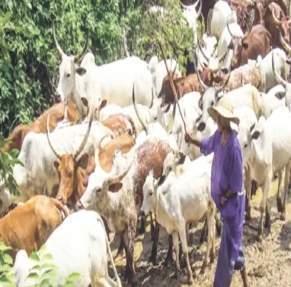
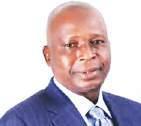
‘I call it Local Government Emancipation Judgement, because it has really emancipated the Local Government from the shackles of the past. And, I hope the Local Government Officials will look at it, as an opportunity to develop their various Local Governments.' - Prince Lateef Fagbemi, SAN, Attorney-General of the Federation and Minister of Justice, Federal Republic of Nigeria

‘It’s not creating the Ministry of Chicken Affairs, that will solve the problem.' - Dr Olisa Agbakoba, SAN, Past President, Nigerian Bar Association
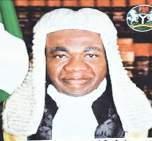
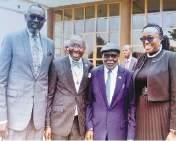
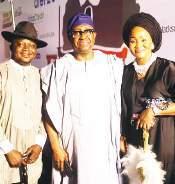
I congratulate my dearest trailblazing, intelligent and audacious Chairman, ‘the Duke’, Prince Nduka Obaigbena, CON, on his 65th birthday. Happy birthday to you, from all of us at ThisDay Lawyer. People have commented to me that “You mean Publisher is just 65?” It is because he has packed in a lot and achieved so much in the Media Space beyond his years, that some think he should be 80 or 90 years old, and not just the ‘tender age’ of 65 that he is! Congratulations Publisher. I wish you many, many more years, in good health, joy, peace and prosperity. Amen. Editor-in-Chief, I thank you for identifying those qualities in me, that I didn’t realise I had. Your Friend, IKEPS
Introduction
Imust admit that I have not yet had the benefit of reading the Supreme Court judgement in Suit No. SC/CV/343/2024 AGF v AG Abia & 35 Ors which was handed down last Thursday; we have only seen the highlights in the media. Nevertheless, the decision was welcomed by majority of Nigerians, with almost as much delight as what may have been felt when slavery was abolished in 1865. In the words of the Attorney-General of the Federation, Prince Lateef Fagbemi, SAN (AGF), he said: “I call it Local Government Emancipation Judgement, because it has really emancipated the Local Government from the shackles of the past”.
The essence of the third tier of Government, that is, the Local Government (LG) is to bring governance and development to the people at the local level. In 1976, Nigeria had 301 LGs, and by 1996, between the Ibrahim Babangida and Sani Abacha regimes, they created over 450 additional LGs. Today, we have 774 LGs.
Local Governments Were Once Autonomous Historically, it appears that under the Military, LGs were once fully autonomous, receiving their allocations directly from the Federation Account and handling their own funds. However, it may have been during the Babangida or Abacha regime, that it was discovered that LGs had somewhat mismanaged their funds - some were heavily indebted, owing their staff salaries for years, owing their Pensioners, with not too much to show in terms of development. Was it as a check and balance on the activities of LGs, or simply out of convenience, or because in the concept of Federalism, it is the State Government that appears to grant powers to the LG, that Section 162(5)-(8) of the 1999 Constitution of the Federal Republic of Nigeria (as amended in 2023)(the Constitution) was included in the Constitution, channeling State and Local Government funds into a joint account to be maintained by the State Government, thereby making the State Governments instead of the LGs, the direct receivers of the LG funds? Any amount standing to the credit of the LG in the Federation Account, was from then on to be allocated to the State for the benefit of the LG, and such funds along with those from the State Governments, to be paid into the State Joint Local Government Account for mandatory onward distribution to the LG Councils. However, Section 162(8) of the Constitution has been purportedly consistently abused by the Governors, who instead, are alleged to mostly handle these LG funds as they please, including withholding such funds from the LGs, spending them as they please, and using them as a tool of oppression to exert maximum control on this tier of government, thereby reducing them to a mere appendage, branch or stooge of the State Government instead.
The Supreme Court judgement, which has been hailed as a landmark decision by many, is said to have decided at least three major issues: 1) that all funds standing to the credit of the LGs in the Federation Account shall be paid directly to them, and not through the State; 2) that Governors do not have the right to dissolve democratically elected LG Councils, and replace them with Caretaker Committees (this has already been decided in a plethora of authorities like APC & Ors v Enugu State Independent Electoral Commission & Ors (2021) LPELR-55337(SC) per John Inyang Okoro, JSC); and 3) that no funds will be released to LG Councils run by Caretaker Committees, because they are not democratically elected. See Section 7 of the Constitution.
Some of the Issues for Determination in the AGF’s Originating Summons Concerning Payment of LG Funds
In his Originating Summons, the AGF had raised 15 issues for determination, the 11th -15th concerning the payment of funds standing to the credit of LGs in the Federation Account. The 11th question was whether States had the unrestricted and unbridled discretion to operate the State Joint Local Government
onikepo.braithwaite@thisdaylive. com onikepob@yahoo.com

“….the decision was welcomed by majority of Nigerians….The Naysayers argue that…LGs cannot be paid directly….as….this offends the principle of Federalism and instead, promotes more of a Unitary system of government…. The majority of the Supreme Court Panel….answered this question in the affirmative…. that, in view of the way and manner the State Governments had abused Section 162(6) & (8) of the Constitution…. LGs could/should be paid directly”
Account ‘whimsically’, and to the disadvantage of democratically elected LG Councils, rather than for their benefit. Clearly, the answer to that question is No.
The question in the 12th issue, was whether the amount standing to the credit of the LG Council in the Federation Account should be distributed to it, and if so, whether it could be distributed directly. The answer to the first part of the question is a definite Yes, as Section 162(5) & (8) of the Constitution provide that the LG funds should be distributed to them.
The answer to the second half of the 12th question, however, has generated some controversy.
The Naysayers argue that, the answer to this question is No, LGs cannot be paid directly from the Federation Account, as, for starters, this appears to promote more of a Unitary system of government as opposed to Federalism. Akin to the dissenting opinion in the case, on direct payment, they also believe that the concept of Federalism institutionalised in the Constitution subordinates the Local Government Councils to the States, and doesn’t provide for and/or accommodate a direct dealing/payment between the Federal Government and the Local Government Councils. Additionally, they are also of the view that Section 162(6) of the Constitution is unequivocal that such funds must be paid into the State Joint Local Government Account maintained by the State Government, for onward transmission to the LG Councils (Section 162(8) of the Constitution) and that an amendment of
Section 162(6) of the Constitution is required to implement any other payment procedure to the LG Councils directly. See the case of AG of Lagos v AGF (2004) LPELR-10 (SC).
The majority of the Supreme Court Panel however, didn’t see it the way the Naysayers do, and answered this question in the affirmative, appearing to be of the view that the way and manner the State Governments had abused Section 162(6) & (8) of the Constitution to the detriment of the LGs and the people, so much so that the LGs were starved of funds to function and bring development to the grassroots, the LGs could/should be paid directly. Though there may a strong argument in support of this point of view because of the interest of Nigerians, those not in support of the decision argue that because there has been an abuse of the provision by the State Governments, doesn’t mean that the Apex Court should have come to this decision to resolve the issue.
Undoubtedly, there may have been abuse of Section 162(8) of the Constitution by many State Governors, over the past 25 years of democratic rule. Secondly, the Supreme Court is not just a final court of appeal, it is first and foremost, a Policy Court that must take public policy and interest into consideration, in making interpretations of the law or handing down decisions. It can strike down repugnant provisions or Government actions. For example, in the 2022 case of AG Kaduna & 2 Ors v AGF Naira Redesign Case, it was decided in the interest of Nigerians who had suffered untold hardship from the Buhari administration’s
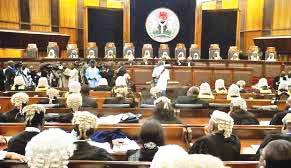
Supreme court of Nigeria
hurried and irrational currency redesign policy. Also see the case of Awolowo v Shagari & Ors (1979) LPELR-653(SC) per Andrew’s Otutu Obaseki, JSC on the use of the literal, mischief and golden rules of interpretation, where the Supreme Court held inter alia that: “The 3rd rule, the golden rule, allows for a departure from the literal rule when the application of the statutory words in the ordinary sense would be repugnant….”. It was indeed, a departure from the literal interpretation of the unambiguous Section 162(6) of the Constitution, to decide that the LGs could/ should be paid directly; but, it is obvious that the literal interpretation of that provision had been rendered repugnant by the improper implementation of Section 162(8), not because the provision itself is repugnant, but as a result of its abuse by State Governments; and the golden rule may have been applied in order to deliver justice to the people. Another argument for another day, may be whether the fact that there is abuse in the implementation of a law meets the threshold that may necessitate the departure from the literal rule for repugnancy of a law. See also Section 15(5) of the Constitution, on one of the Political Objectives of the State being to abolish abuse of power. The actions of the State Governments misusing or misappropriating LG funds (though vehemently denied by them), at the least, constitutes a gross abuse of power.
We are all aware that by virtue of Section 4(2) of the Constitution, the function of the National Assembly is to make laws for the peace, order and good government of Nigeria, and it appears that Section 162(6) & (8) of the Constitution may not have met this threshold on account of their improper implementation by State Governments. Could this have also informed the Apex Court’s majority position? Additionally, Section 16(1)(b) of the Constitution provides that the State should control the economy in a such manner, inter alia, as to secure the maximum welfare of the people, a goal that may not have been achieved by channeling LG funds through the joint account controlled by the State Government, necessitating the institution of this LG case.
Issues 14 & 15
The question in the 14th issue, was if the said funds are to be paid to the LG without delay. The answer is Yes. In AG of Lagos v AGF (Supra) per Sunday Akinola Akintan, JSC, the Supreme Court held that “It is clear from the above provisions of Section 162(6), that States are not to keep the allocation received on behalf of their local government councils as its own money….Any such breach would, in my view, be actionable in a court of law….”.
The final question in the 15th issue, was whether a LG Council isn’t entitled to direct payment from the Federation Account of the amount standing to its credit therein, where the State has persistently refused to pay same received by it to the LG. The Supreme Court majority must have answered Yes to this question, possibly for some the reasons I discussed above. We however, look forward to reading the judgement.
Now that the LGs have ostensibly gained their freedom from the State Governments, the debate as to what type of system Nigeria is practising - whether Unitary or Federalism, has been sparked off again. Be that as it may, Nigerians hope that LGs will use their new found financial autonomy wisely. Some sceptics do not believe that the Apex Court’s decision will bring much change, as they believe that the Governors are still firmly in control of the LGs.
Again, of what benefit would it be, if the LG Councils are paid directly, and they then turn around to misuse their funds, instead of ploughing the monies into developmental programmes in their areas for the benefit of the people? After all, the LG is a microcosm of our society.
There has been a call for the anti-corruption agencies like the EFCC and ICPC, to establish departments that monitor the expenditure of the LGs. Luckily, unlike the President, Vice President, Governors and their Deputies, LG Chairmen are not covered by the Constitution’s Section 308 Immunity from suit and legal process clause, which means that if they are caught dipping their fingers into the cookie jar, criminal proceedings can immediately be instituted against them.
Some are nevertheless, optimistic that this newfound independence will attract a better crop of qualified people to seek positions in the LG Councils, not just those whose only credentials are that they are appointees of the Governors. But, is there any assurance that this judgement will truly free the LGs from the clutches of the State Governors? Can LG elections be free, fair and transparent when they are conducted by State Electoral Bodies that are said to be mostly controlled by the Governors? Nevertheless, reservations or not, this judgement has been hailed as a step in the right direction. Only time will tell.
Facts
The suit was instituted as far back as 1958, before the Onitsha Judicial Division of the High Court of the former Eastern Region. As a result of the Nigerian civil war, it suffered several setbacks. After a full trial, judgement was eventually entered in favour of the Respondents on 17th June, 1977, coram Nnaemeka-Agu, J. The Appellants appealed against the judgement on the ground that it was delivered without jurisdiction, as His Lordship had been elevated to the Court of Appeal with effect from 15th June, 1977, two days before the judgement was delivered.
Although unsuccessful at the Court of Appeal, the appeal was allowed by the Supreme Court, which ordered that the case be tried de novo. The case, accordingly, went back to the High Court. At the hearing de novo, the Appellants raised an objection to the competence of the Writ of Summons that was used to initiate the suit in 1958. The issue was fought all the way to the Supreme Court, without success. Nwizu, J. eventually heard the suit to conclusion, and found in favour of the Respondents in the judgement delivered on 24th April, 2007. By the said judgement, the trial court held that the Respondents as Plaintiffs are entitled to the Statutory Right of Occupancy to all the land known as Isi-Agu land in Abo Ogidi.
Once more, the Appellants were dissatisfied with the judgement and filed an appeal to the Court of Appeal. The appeal was unanimously dismissed, on 28/7/2011. Further dissatisfied with the decision of the appellate court, the Appellants filed the instant appeal to the Supreme Court.
The Supreme Court adopted the following issues formulated by the Appellants in their Amended Brief of Argument, thus:
1. Whether in all the circumstances, the admission, use, reliance and acceptance of Exhibits B and C, being the evidence of four witnesses in a previous trial, accorded with the provisions of Section 34(1) of the Evidence Act, and the principle of a fair adjudication under our adversarial system.
2. Whether the conflicts of evidence of the parties regarding the features on the land in dispute, were properly resolved without a visit and or inspection by the trial Judge to the locus in quo (the land in dispute).
3. Whether the Plaintiff/Respondents had proved the various acts of ownership and possession, to sustain a declaration of title to the land in dispute.
4. Whether the Court of Appeal was right in upholding the finding of the trial court, that the case of the Appellants strengthened the case of the Respondents.
5. Whether this is a proper case for the Supreme Court to interfere with concurrent decisions of the lower courts.
Arguments
Counsel for the Appellants argued that the fact of the death of the witnesses whose testimonies in an earlier stage of this case are contained in Exhibits B and C should have been pleaded before the exhibits can qualify for admission as evidence at a later stage of this case; that since it was not so pleaded, the testimonies cannot be admitted as evidence under Section 46(1) of the Evidence Act, 2011. In support of his arguments, Counsel cited inter alia AYORINDE v SEGUNRO (2012) 11 NWLR (PT 1312) 460, and contended that the facts that establish the requirements in Section 39 and the proviso to Section 46(1) of the Evidence Act, must be pleaded before previous witness testimony can be admitted as evidence in a later proceeding. He argued further that such evidence is not relevant in a later trial, except for the purpose of cross-examination to discredit a witness in the subsequent proceedings. Counsel for the Respondents submitted otherwise. On the second issue, Counsel for the Appellants argued that it is preferable that a visit by the court to the locus in quo should be on the application of one or both of the parties and agreed to by all concerned, but the court is not precluded from deciding suo motu to visit the locus in quo, if, in its view, such a visit is necessary for arriving at a correct and judicious decision of the case before it. Counsel submitted that the state of the evidence clearly showed that the trial court should have made the visit to or inspection of the land in dispute, as there were ambiguities or conflicts in the evidence (based on their pleadings) which the visit or inspection would have helped to resolve. Counsel for the Respondents contended otherwise. He posited that the Respondents did apply for the trial court, to visit

In the Supreme Court of Nigeria Holden at abuja
On Friday the 15th day of december, 2023 Before their lordships
Kudirat Motonmori Olatokunbo Kekere-ekun Mohammed lawal Garba Ibrahim Mohammed Musa Saulawa Tijjani abubakar emmanuel akomaye agim justices, Supreme Court SC/393/2011
Between
1. OGBueFI PHIlIP OKadIGBO
2. KINGSley SaMuel elOBISI
3. leONaRd OKaFOR aPPellaNTS
4. auGuSTINe IKeZue
(SuBSTITuTed FOR: OBIaNWuNa OGBuuaNyIya NWaNKWO MuOKue udedIBIa CHIeZIe aNdReW OBIeCHINa MICHeal elOBISI, aNd CHIjI adIBe)
(By ORdeR OF THe COuRT ON 10/2/2003) FOR THeMSelVeS aNd ON BeHalF OF THe PeOPle OF uMueRI, OGBuNIKe)
And
1. GOZIe aNyaeGBuNaM (SuBSTITuTed FOR RaPHael aNyaeGBuNaM aNd udO OjeCHI
By ORdeRS OF THe COuRT ON 22/11/2007 aNd 11/06/2015 ReSPeCTIVely)
2. PaTRICK ONyeKWelu IReMeKa
3. eRICK CHuKWuMa
4. VINCeNT OKaKPu
ReSPONdeNTS
(added as 2nd, 3rd, and 4th Respondent by Order of the Court on 11/06/2015 for themselves and on behalf of the people of abo, Ogidi) (Lead Judgement delivered by Honourable Emmanuel Akomaye Agim, JSC)
the land in dispute. And, that the Appellants by relying on the very Exhibits B and C they had argued is not legal evidence, to argue that the Respondents applied for the trial court to visit the land in dispute is approbating and
“The fact of such previous testimonies already forming part of the record of Suit No. 0/7/1/1958 need not be pleaded in the pleading of the parties, before evidence of that fact can be led on it during the trial de novo”
of the parties, before evidence of that fact can be led on it during the trial de novo. The Apex Court further observed that PW1 testified in examinationin-chief that the said witnesses were all dead, as a foundation for seeking that their testimonies be admitted as evidence in the trial de novo, to prove the truth of the facts contained in them in keeping with Sections 39 and 46 of the Evidence Act 2011. Their Lordships held that it is not in every situation that a party who desires to rely on a witness testimony in a previous judicial proceedings must plead and prove the facts that establish the requirements in the Proviso to Section 46(1) of the Evidence Act 2011. The need to plead the fact establishing the requirements for admission of evidence given by a witness in a previous judicial proceedings, would depend on whether the previous judicial proceedings is in the same case at an earlier stage of it or in a separate and distinct case. If it is evidence given by a witness in proceedings in a previous case that is distinct from a pending case, then it cannot be admitted as evidence in proceedings in the pending case, unless the facts establishing the existence of the requirements of Sections 39 and 46 are stated in the pleadings in the subsequent case. So, it is only where the witness testimony was in judicial proceedings in a case separate or different from the latter case, that the facts of the existence of such witness testimony in a previous case, the similarities of parties and issues between that case and the latter one, and the fact that in the previous one, the adverse party had the right and opportunity to cross-examine the witness, must be pleaded in the subsequent case, before evidence of such facts can be admitted.
The Court proceeded to include for clarity that the previous statement of a witness recorded in a previous judicial proceeding can also be used in a subsequent judicial proceeding to cross-examine the same witness concerning that testimony in the previous proceeding by virtue of Section 232 of the Evidence Act 2011. The use of the previous statement of a witness under Section 46(1) of the Evidence Act, is different from the use of a previous statement under Section 232 of the Evidence Act 2011. Concerning the former, the previous statement must have been made in a judicial proceeding and the maker is not a witness in the subsequent judicial proceedings because he or she is not available to be called as a witness for the reasons stated in Sections 39 and 46(1) of the Evidence Act 2011. The Previous written statement of a witness under Section 232 of the Evidence Act applies to extra-judicial statement and statement made in a prior judicial proceedings, the maker must be called as a witness in an going judicial proceedings and the previous can be used only to cross examine such witness concerning such statement.
Issue one was resolved against the Appellants.
The court held that the Appellants raised this issue as a fresh issue, despite the trial court and the Court of Appeal both having thoroughly reviewed the pleadings and evidence from both parties. Their Lordships noted that the trial court evaluated the evidence, made factual findings, and determined the boundaries and features of the land in question, concluding that the Respondents proved their claim to the land, and the Court of Appeal concurred with this assessment. Their Lordships held further that the Appellants did not show that these findings were perverse, or that there was a serious legal breach causing injustice; instead, they argued that the trial court should have visited the land.
The Apex Court observed that neither party requested a visit to the land during the trial, indicating that the parties were clear about the land’s extent and its features. As such, the trial court was not obligated to visit the land, merely because the Appellants disputed the Respondents’ claims. The Supreme Court therefore, held that the judgement of the trial court demonstrated a clear understanding of the disputed area, making a visit to the land unnecessary - EBOADE v ATOMESIA (1997) 5 NWLR (PT 506) 490.
reprobating. More so, the trial court did not see the need for it to visit the locus in quo. The Supreme Court discountenanced issue 3, on the ground that it sought to reopen the determination of the factual issue already determined by the concurring decisions of the lower courts. Since the Appellants were not contending that the concurring decisions are perverse or wrong in any respect, it was accordingly dismissed. The Apex Court, however, took arguments on issues 4 and 5 and pronounced on same.
Court’s Judgement and Rationale Deciding the first issue, the Supreme Court noted that the testimonies in Exhibits B and C were given by witnesses in the first trial proceedings in this case. They remained part of the records of this case, showing the history of the case from the date of commencement of the suit. The fact of such previous testimonies already forming part of the record of Suit No. 0/7/1/1958 need not be pleaded in the pleading
The Supreme Court addressed issues four and five by noting that the Respondents, as Plaintiffs, based their claim to the Right of Occupancy of Isi-Agu land on a long history of possession and acts of ownership from time immemorial. Their Lordships consequently, held that the Appellants woefully failed to demonstrate from the pleadings and evidence placed before the trial court, at both the initial trial and the trial de novo, by the parties, that the concurrent findings that the Respondents had proved their case of possession and exercise of acts of ownership from time beyond memory, are perverse or to have occasioned miscarriage of justice.
Appeal Dismissed.
C.I. Okafor, Esq with C.F. Obi, Esq for the Appellants. K.O. Kama, Esq for the Respondents.
Reported by


The CJN spoke at a workshop with the theme: “Judicial Independence and Judge Craft,” organised by the National Judicial Institute (NJI) in collaboration with the Forum Against Counterfeiting (FAC), in Abuja.
The CJN said despite significant progress made in attaining judicial independence, more still needs to be done.
He said: “Ongoing and sustained efforts, are still required to address the challenges faced. We will not relent in seeking better options and actions, that will ensure that the Nigerian Judiciary remains a strong, impartial and independent arbiter of justice and the rule of law”.
The CJN added that Judges must also boost their capacities, as a way of restoring confidence in the Judiciary.
He said: “The act and science of judging requires deep and contextual understanding of the law, commitment to do justice, and the innate ability to apply legal principles to complex and often vexatious issues without fear or favour”.
“I must also reiterate that the substantive requirements of judicial independence, judge craft and the art of judging are built around public expectations for Judges to decide matters before them fairly, impartially, and on the basis of facts.
“Such decisions must go in accordance with the law, without restrictions, improper influences, inducements, pressures, threats or interference, directly or indirectly, from any quarter of for any reason.”
Global Chairman of FAC, Chief Anthony Idigbe, SAN, spoke on the use of technology in case management to achieve efficiency. He referred to Grudin’s Law, which suggests that when those who benefit from a technology are not
those who do the work, the technology is likely to fail or be subverted.
According to him, digital transformation is not about technology, but people and processes. He gave tips as to how the people issues in digital transformation in the Judiciary, can be resolved.
Idigbe, Senior Partner at Punuka Attorneys and Solicitors, said FAC is focused on promoting the rule of law generally, but with a particular focus on anti-counterfeiting.
NJI Administrator, Justice Salisu Abdullahi, described the pursuit of justice as the cornerstone of any thriving democracy.
He said: “It is essential that our judicial system operates with utmost efficiency and effectiveness, to uphold the principles upon which our nation was founded”.
“In this light, concerted efforts must be made towards the timely resolution of cases, the streamlining of legal procedure and the elimination of unnecessary delays.
“It is imperative that we ensure that justice is not only done, but is done in a manner that respects the rights and needs of all parties involved, as swift justice instills confidence in our legal system.
“The theme of this workshop could not have come at a better time than now, as it is designed to afford the Justices and Judges the opportunity to appraise the judicial system and consequently, suggest conventions for improvement.
“As society evolves, we must continue to be dynamic and pragmatic, in order to adequately address the conflicts that will inevitably arise, bearing in mind that the only constant thing in life is change.
“In order to achieve efficiency and effectiveness, we must invest in technology, case management, continuing judicial education and access to justice, among others.”
Hon. Justice Amina Augie,
JSC (Rtd) noted that the power of the Judiciary lies in the confidence the people have in its activities and decisions, which every Judge must protect.
“We need to be able to show that justice is not only done, it is seen to be done, and that in the judgement you write, in whatever you are doing, they are able to see and trust that you are
doing the right thing, and that you are deciding fairly”, she said. She added that it is the process of creating the type of judgements that sustain public confidence in the system, that constitutes the art and craft of judging.
Drawing from her experience, Justice Augie noted that judgement writing is tedious and requires commitment on
the part of a Judge, to be able to weave together all the issues involved in a case and deliver a lucid verdict. She cautioned against Judges allowing others to write judgements for them, noting that a Judge’s judgement reflects who he is.
A Judge of the National Industrial Court, Justice Nelson Ogbuanya, urged the Judiciary to reassess its
communication strategies to change some public perceptions that are misconceived.
He said: “The Nigerian Judiciary gained notoriety for adjournments and delays, not because every court or every Judge is involved, but because that is the posturing that has been communicated and perceived by the people”.
The Nigerian Legal Awards said it will continue to reward hard work, high work ethics, and excellence even as it broadens its scope by creating more categories as the Awards get bigger. The founder of ESQ Training limited and organiser of the Nigerian Legal Awards, Lere Fashola disclosed this while speaking to journalists during the Award ceremony at the Landmark Event Centre in Victoria Island Lagos. Mr Fashola who could not hide his excitement said:
“I am so excited each time we do this, I am always very excited seeing the support, and then seeing the extensive work that Lawyers do in supporting businesses in Nigeria. Like we’ve always said, the Award is set up to celebrate the important contribution of Lawyers to businesses’’. He further disclosed that with the Awards, his organisation is looking for Lawyers and law firms that make an impact in all aspects of Nigeria, especially in the commercial sector.
“We look at impact that Lawyers are making, especially the major commercial law firms in Nigeria. We want to look at their contributions beyond just being enablers of business or courtroom practitioners, to supporting and strengthening businesses in Nigeria. And, that is why for the Award, all the time, what
we are looking at is impact and not the history of the firm. We are not looking at the size of the firm or the history of the firm, but the impact that they are making in the industry. Whether in the oil and gas sector, project finance, real estate, or intellectual property. Gone are the days when Lawyers were regarded as call centres. Now, we find that Lawyers are enablers of businesses. They are the partners to businesses, and it is to their credit that a lot of businesses are still staying afloat in this period of hyperinflation. So, we celebrate them, and seeing all the law firms and all the colourful outfits, it inspires me a lot’’.
Mr Fashola, also expressed his happiness over the 40 Under 40 Award, which recognises young Lawyers who are regarded as the future of the profession, because most of the past winners have gone on to display exceptional qualities as Lawyers.
“Most especially, even the 40 Under 40 Award, which recognises young Lawyers who are regarded as the future of the profession, the Award recognises exceptional young people who contribute exceptionally, and are seen as talents who, if well nurtured, will end up being some of the best Nigeria can offer the world.”
In her welcome address, Mrs Temitayo Samuel, the Co-Founder Esq. Training Limited, the organisers of the Nigerian Legal Award disclosed that: “These awards are more than just an athlete. They are a testament to the power of integrity and pursuit of excellence, and of unwavering commitment to upholding the highest standards of professionalism’’.
“Our mission here has always been to reward innovation, education, and tireless efforts of legal practitioners who play a pivotal role in our nation’s development. At the heart of the Nigerian Legal Award, is our commitment to transparency and integrity. We uphold the principles of fairness and impartiality in every aspect of our selection process.’’
The Nigerian Legal Awards catalyse promoting excellence and professionalism, within our profession. By recognising and celebrating outstanding achievements, these awards inspire legal practitioners to continually strive for greatness and uphold the highest standards of integrity.
Notable winners in this year’s awards include a former Attorney-General of the Federation and Minister for Justice, Chief Bayo Ojo SAN, who won the lifetime achievement award, and former Attorney-General and Commissioner for Justice,
Lagos State, Mr Olasupo Shasore, SAN, who got the Nigerian Legal Award in the field of Arbitration. Young Lawyer Must Work Hard - Chief Bayo Ojo, SAN, urged young Lawyers to work as hard, as they can, if they intend to get to the zenith of their profession, stressing in his message that the key is “Hard work, hard work, hard work”.
Chief Ojo SAN, who spoke to journalists after receiving his lifetime achievement award, said that Nigerian Lawyers have it within them to get to the very top of what they do, if they will face the reality and work as hard as they can. He added that: “What the certificates have given them, is an encouragement that the future can be bright. For those who work hard, they can also achieve great things.
Speaking in the same vein, the former Mr Olasupo Shasore, SAN, who got the Nigerian Legal Award in the field of Arbitration, disclosed that Nigeria has some of the best Arbitrators in the world. “We have some of the best Arbitrators in Africa, in Nigeria. Without a doubt, the leading Arbitrators internationally.”
Mr Shasore SAN, further lamented the lack of basic standard facilities, as the major reason why Nigeria has not been able to position itself as an Arbitration hub in Africa.


last September, He, President Bola ahmed Tinubu, GCFR, set up a Committee to examine, amongst other things, the issue of the incessant clashes between Herdsmen and Farmers. Following the recommendations from the Committee to provide sector-specific solutions to the long-standing crisis, the Committee presented the President with 21 recommendations, including the creation of a Ministry of livestock Resources, along with other measures, to help resolve the decades-long conflict between nomadic cattle Herders and Farmers in the country. Given the humongous cost of running the Government under the present dispensation, and Nigeria being in financial dire straits, not to mention the Tinubu administration’s commitment to the implementation of the Oronsaye Report which made recommendations for a cut in the cost of governance and downsizing, many have opined that the creation of an additional Ministry is absolutely unnecessary, particularly when a cohesive policy is required between agriculture and livestock, and this is easier to achieve under the umbrella of one Ministry, the Ministry of agriculture and Rural development. Dr Sam Amadi; Jide Ojo; Dr Akpo Mudiaga Odje and Emmanuel Onwubiko submit that idea of a new Ministry of livestock development is not only inexpedient, a duplication of efforts, but a waste of the nation’s scarce resources, and that it would not in any way resolve the never-ending Herder-Farmer attacks
Dr Sam Amadi
Either in search for a lasting solution to the Herdsmen violence on farming communities, or in a bid to get political mileage from the herdsmen crisis, President Tinubu announced the establishment of the Ministry of Livestock Development. In addition, he constituted a Special Committee on the herdsmen-farmer conflict cochaired by himself and Professor Attahiru Jega, former Chair of the Independent National Electoral Commission (INEC). These recent initiatives have drawn both criticism and applause from Nigerian analysts. It is important to take a closer
“But,
look at these initiatives, to appreciate their wisdom or lack of it.
Is setting up these initiatives a proper exercise of executive power by President Tinubu?

The first point to make is that, the President is fully within his power to create a new Ministry and to structure the Federal cabinet as he wishes. Section 5 of the
it is likely that the real reason for the creation of an expansive bureaucracy for livestock is politics, raw politics”
Constitution, vests the executive power of the Federation on the President personally. This power has three legal incidents. The first is that by virtue of Section 5 the President is the Chief Executive, the Commander-in- Chief, and the Sole Organ. As Chief Executive, the President supervises the Federal Government. This power is only subject to the express provisions of the Constitution, and any law that the National Assembly may make. Outside these restrictions, the President is uninhibited in managing the Federal executive.
Furthermore, the Constitution requires that the President appoints at least a person from the 36 States of the Federation as a Minister in the Federal Government. There is no other mandate, on the structure of the Federal cabinet. The President has unlimited discretion on the number of Ministries he can create and the staffing of the Ministries, as long as he complies with Federal character requirement under Chapter 2 of the Constitution, and any other law made by the National Assembly.
But, what is constitutional, is not necessarily prudent or effective. The exercise of Presidential power is not assessed only on the basis of legality, but also on the basis of effectiveness and reasonableness. Should the President at this time, set up a new Ministry to manage livestock business in Nigeria? How does such an act measure up to the President’s trumpeted policy of cutting down costs of governance? Does it make for effectiveness to sequester livestock management from the value chains and intersecting sectors of agricultural development in Nigeria? What evidence suggests that this is politics masked as administrative interventions?
Does the Size of Government Matter? There is an overwhelming concern, about the big size of the Federal Government. Like everything popular, the concern for size and cost of governance in Nigeria may not be precise and grounded in evidence and clear logic. Is the Nigerian public sector truly over-bloated for its size, complexities and developmental challenges? How do the number and size of Ministries add to that problem? It is arguable that Nigeria’s public
service is not too large for its size as a country, its complexities and challenges of development for a country with that level of aspiration for development. The concept of the size of a public sector, is also ideological. When we conceive the role of the State basically to be to provide security, enforce contracts and secure property rights, then we would settle for a small public sector made up of security officials and a few regulators in handful of Ministries. It is the ideology of libertarianism and free market fundamentalists who have a distrust for the public sector, because of their alleged tendency to distort market operations. But, egalitarians and other developmental State schools think that the role of the government extends beyond protecting security and enforcing contractual and property rights. They believe that government is necessary to correct market failures, and positive and negative externalities that result from them. Since market failures are rife and pervasive, the State is more than a night watchman. It needs to be expansive enough, for the challenge of development.
The size of government matters, because we assume that bigger means costlier. But, this may not be so. Small can still be expensive. It depends on cost centres. Anyone who knows about public service, understands that the true costs of government shows when you compare both the number of Ministries, manning levels, capital and recurrent budget of all of them.
We can economise on cost, by being prudent in public procurement. The bulk of the costs of governance in Nigeria, is mostly corruption and waste. Every four years the National Assembly discards all furniture, and procure new ones for the Legislature. This unnecessary expenditure, is driven by contract money. There are many vehicles that are not needed, the expenditure for official functions are not accounted for and reviewed for prudence and relevance. The point is that, costs are based on the structure and administrative character of the public service, not necessarily on the number of Ministries. That should be clear.
But, in spite of the foregoing argument, it does not make much sense for a Government that has asked a Special Committee to implement the Oronsaye Report on the rationalisation of the public service, to quickly create a Ministry to manage an important national issue that can be easily managed under an existing Ministry. It is the more acute form of executive incoherence and organisational contradiction.
One of the reasons for the failure of administrations, is that there is no serious commitment to public policy. Government easily and routinely announce seemingly radical policies that are aimed improving the quality of administrative actions, but easily undermine such policy through subsequent actions. This incoherence is the heart of State ineffectiveness. Alignment, coherence and comprehensiveness, should be the watchwords of administrative effectiveness.
How Important is Livestock De-
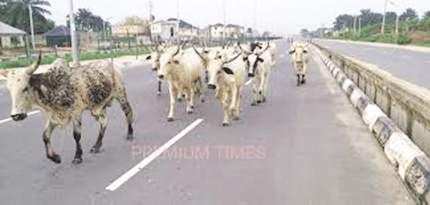
velopment?
Is it necessary to single out livestock development for special attention, in the 21st century of technological innovation and energy transition?
According to Professor Eustace Iyayi, the Registrar and Chief Executive of the Nigerian Institute of Animal Science, the Nigerian livestock industry is worth about N30 trillion. Nigeria spends about $1.5 billion on importation of diary products, because of insufficient local production. We have a deficit of about one million tons of milk. The diary shortfall, is about 60% of consumption. We have the third largest herds of cattle in Africa. So, the livestock industry has great potential to add to food sufficiency and export promotion. One can argue that by bringing singular executive attention to the issue of effective management of livestock in Nigeria, we may open a new source of foreign earning and enhance food sufficiency in the country. This is notwithstanding the job creation potential of the industry.
A supplementary argument in support of the new initiatives is that, it helps to deal with the problem of violent conflict between herders and farmers across Nigeria, especially in the Benue Valley. There is no doubt that herders-farmers violence, has cost the country so much. At recent count, it is estimated that about $1 billion is lost annually to herdsmen attacks on farming communities. This is huge. It calls for effective State intervention to remove the underlying causes of the attacks, and address the troubles faced by herdsmen that indirectly lead to these attacks. The proposition is that the Livestock Ministry will focus on controlling the spike in violence, and address the social, economic and environmental crises that are
“Secondly, there is already a Department in the Federal Ministry of Agriculture, that is in charge of livestock. Why not strengthen that Department, to make it more efficient and functional?….One does not need the clairvoyance of a Nostradamus, to know that it is squarely a duplication of the objectives and activities of the Ministry of Agriculture”
driving the southward movement of herders and the associated criminality and brutal attack. A Ministry seems to suggest that the Presidency has prioritised the crisis, and ready to invest resources and quality executive attention to it.
The proposition that the reason for a standalone Ministry for Livestock, is because of commitment to provide lasting solutions to herders-farmers conflicts, and drive the actualisation of huge economic potentials of livestock industry in Nigeria. But, it is likely that the real reason for the creation of an expansive bureaucracy for livestock is politics, raw politics. The timing is suspicious. Before now, the Government had not articulated any urgency to address the conflict. There have not been policy documents, outlining the great economic value of the livestock sector. Then suddenly, the Government rolls out two major initiatives, and tags a Prof Jega, a Northerner with immense credibility, as the co-Chairman. The fact that this announcement was made a few days after there was an outbreak of attacks in Mosques in Northern Nigeria, against Government’s assent to the Samoa Agreement.
Conclusion
The key point is that, whatever bona fides President Tinubu has about driving the economic optimisation of Nigeria’s potential in livestock business and the urgency of controlling the herder-farmer conflict, he has existing platforms to utilise, to mount any new Presidential action. There is no reason to create a new Ministry, to drive more coherent and effective actions on livestock development. Based on the pathology of public leadership and the established political disposition of the Tinubu administration and its wastefulness and incoherence, we can assume that the overriding consideration for these initiatives is politics. The new Ministry and the Committee will constitute large pots of meat for Politicians from the North, as we count down to 2027. 2027 is actually far. But, it looks that President Tinubu has shifted from governance gear to politicking gear, too soon.
Dr Sam Amadi, former Chairman of Nigerian Electricity Regulatory Commission
Creation of Ministry of Livestock Development is Needless Jide Ojo
“To enable Nigeria to finally take advantage of livestock farming, we have seen the solution and opportunity for this adversity that has plagued us over the years, and I believe the prosperity is here in our hands.” –President Bola Tinubu while announcing the creation of Federal Ministry of Livestock Development on Tuesday, July 9, 2024
Introduction

On Tuesday, July 9, 2024, President Bola Tinubu announced the creation of Federal Ministry of Livestock Development. Following the approval, he said the Federal Government is fully prepared to cover the cost of acquiring lands to ensure the peaceful co-existence of Pastoralists and Farmers. This came as he inaugurated the Renewed Hope Livestock Reform Implementation Committee at the State House, Abuja. While President Tinubu will chair the Committee, a former Chairman of the Independent National Electoral Commission, Attahiru Jega, is the Deputy Chairman. The Committee is expected to propose recommendations aimed at fostering a peaceful co-existence between herders and farmers, ensuring the security and economic well-being of Nigerians. The PUNCH of July 9, 2024 (online edition) reported that on September 14, 2023, the National Livestock Reforms Committee recommended that Tinubu create a “Ministry of Livestock Resources” to, among other deliverables, reduce the decades-long gory conflict between farmers and nomadic cattle herders nationwide. Former Kano State Governor and Chairman of the All Progressives Congress, Abdullahi Ganduje, disclosed
this to State House Correspondents shortly after he led the Committee in an audience with the President at the Aso Rock Villa, Abuja. It formed part of 21 recommendations captured in a document submitted to the President, to enhance the Federal Government’s holistic response to the lingering cases of bloodshed.
The document spelt details of the proposed solutions where the committee advocated a reform agenda examining conflict mitigation and resource management. “This agenda should include the establishment and resuscitation of grazing reserves as suggested by many experts and well-meaning Nigerians and other methods of land utilisation. Create the Ministry of Livestock Resources in line with practice in many other West African countries. In the alternative, Federal and State Governments should expand the scope of existing Departments of Livestock Production to address the broader needs of the industry,” it read.
Previous Efforts to Resolve Herders Versus Farmers Conflict
There is no gainsaying the fact that Pastoralists and Farmers’ conflicts have a long history, but became most pronounced under the immediate past administration of President Muhammadu Buhari. In the Kaduna, Benue, Plateau, Nasarawa and Taraba axis alone, hundreds, if not thousands of people, have been killed and millions displaced from their ancestral lands and homes as a result of this lingering crisis. The creation of the Ministry is the latest attempt by the Nigerian Government, to address the decades-long conflict between herders and farmers over access to land, pasture and water.
In the past, previous governments have reeled out a draft of measures including reforestation, Great Green Wall, building of dams for irrigation, importation of grass, creation of grazing routes, the highly controversial Rural Grazing Area (RUGA), Cattle Colony and an 82-page National Livestock Transformation Plan (2019 – 2028). According to International Crisis Group, “In 2019, Nigerian authorities launched a tenyear National Livestock Transformation Plan to curtail the movement of cattle, boost livestock production and quell the country’s lethal herder-farmer conflict. But, inadequate political leadership, delays, funding uncertainties and a lack of expertise could derail the project. Covid-19 has exacerbated the challenges”. It is believed that if the NLTP can be overhauled, it still provides the best roadmap and blueprint to resolving the Pastoralists and Farmers age-long conflict.
What is the definition of livestock? According to the Britannica online dictionary, livestock includes both beef and dairy cattle, pigs, sheep, goats, horses, mules, asses, buffalo, and camels; the raising of birds commercially for meat or eggs (that is, chickens, turkeys,
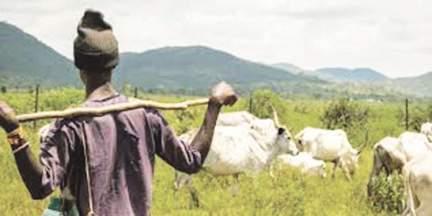
ducks, geese, guinea fowl, and squabs) is treated separately. This means that, not all animals are covered by livestock. Poultry farming and fisheries, are exempted. It just doesn’t make much sense, to treat only a section of the animals preferentially.
Secondly, there is already a Department in the Federal Ministry of Agriculture, that is in charge of livestock. Why not strengthen that Department, to make it more efficient and functional? If that department is well resourced, and is given the mandate to implement the National Livestock Transformation Plan, with appropriate Key Performance Indicators and adequate funding, it should be able to deliver.
Thirdly, President Tinubu already has a bloated cabinet with about 34 Ministries and 48 Ministers. The performance of many of these Ministers has been largely lacklustre, in the past 11 months of their being in office. In the face of dwindling economic resources, inability to resolve the new national minimum wage for workers, huge debt portfolio and the Presidential order to reduce the Departments and Agencies in line with the Steve Oronsaye Report, it is baffling that the President will deem it fit to establish an additional Ministry. This new Ministry may well have two Ministers, which will then bring the number of the cabinet to 50!
The other issue here is that, creating a new Ministry mid-year will present funding challenging for proper take off. This is because, the Ministry was not captured in the 2024 FG budget. The new Ministry will need office space, full complement of staff, equipment,
“…. some States, particularly Benue State have outlawed open grazing, which is in sync with international best practices and modern civilisation…. we need Mr President to muster the political and legal will, to outlaw open grazing within Federal territories/ routes, as the States outlaw same…..”
and office furniture. Thus proper take off of the new Ministry, may not be until next year. Furthermore, the new bureaucracy being created will substantially increase the overheads and cost of running this Government. I don’t think there will be value for money, creating this new Ministry. Furthermore, it is doubtful if the State Governors are carried along in the FG plan. Interestingly, the FG has no square metre of land anywhere in Nigeria. By virtue of the 1978 Land Use Act, all lands are vested in the State Governor who holds it in trust for the people. Part of the challenge NLTP faced under ex-President Buhari, was the unwillingness of most of the Southern State Governors to give part of their State’s land for the take off of ranching. Resuscitating the already obliterated grazing routes of the 1960s in 2024 will be problematic, as the land in question may have been used for residential housing or building purposes having been parcelled out to beneficiaries. I do hope the plan of the Federal Government to acquire land from the States, will yield positive results.
If the Federal Government is establishing a new Ministry with the aim of resolving the farmers-herders conflict, what is the President doing to support other forms of animal husbandry, in particular, rabbitry, poultry and fisheries. Farmers in these sectors too, need to be encouraged to contribute meaningfully to the food security agenda of the Tinubu Administration. I am of the considered view that if the Federal Government of Nigeria can get the buy-in of the sub-national government vis States and Local Governments, it will achieve greater success in its food security agenda.
Conclusion
I understand the burning desire of President Tinubu, to resolve the conundrum surrounding the herders – farmers conflict in Nigeria. However, creating an additional layer of bureaucracy, will not solve the lingering and protracted challenge. FG should try to fashion a bottom-up approach to resolving this age-long dispute, and not vice versa. Reforestation of the deforested Northern part of Nigeria and making the herders embrace modern techniques of livestock farming, will yield better results than just creating an additional
Ministry.
Jide Ojo, Development Consultant; Author; Columnist and Public Affairs Analyst
New Livestock Ministry: A Necessary Evil? Or A National Pastime?
Dr Akpo Mudiaga Odje
Like a whirlwind, Nigerians were woken up by the breaking news that, President Bola Tinubu, GCFR, had announced the establishment of Ministry of Livestock Development responsible inter-alia, for addressing issues of the farmer and herders.
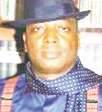
Instructively, Mr President thus, made the pronouncement during the inauguration of the “Renewed Hope Livestock Reform Implementation Committee”, apparently also set up for the purpose of addressing farmer and herders squabbles.
Establishment of a New Ministry for Livestock Development
These unfolding events, seem to suggest that the Federal Government is now embarking on establishing a Ministry of Livestock Development to fulfil the demands of some interests, who have been agitating for this Special Agency.
Indeed, Mr President also mandated the new Ministry to develop livestock and their products, to enhance our chain of food supply and national agricultural development. The new Ministry is expected to boost export opportunities, agricultural productivity and economic growth.
The Minister of Finance and allied Government Departments, have been directed by Mr President to ensure the seamless facilitation of the new Ministry.
As an aside, Mr President also declared that the new Ministry is also to look into the matter of ranching that has been on the front burner of national issues.
Ministry of Livestock Development: A Duplication of the Ministry of Agriculture
Hitherto, our nation had always had in existence a Ministry of Agriculture and therefore, is at a loss as to where to situate this new Ministry of Livestock Development.
One does not need the clairvoyance of a Nostradamus, to know that it is squarely a duplication of the objectives and activities of the Ministry of Agriculture.
It would have been much better if this new Ministry of Livestock Development was added as a new Department under the Ministry of agriculture, to stem expected bureaucratic clashes of objectives and jurisdiction between the two Ministries.
Above all, the cost of establishing this new Ministry will be heavy on the lean resources available in the current implementation of the dualistic budgets of 2023 and 2024, as “miraculously” approved by the National Assembly. This, no doubt is another unnecessary financial strain on our economy.
Still on the economic front, the 2023 budget has suffered poor funding to the tune of about one trillion Naira already! So one wonders where the resources will come from, to fund this fresh Ministry which is a very gigantic project?
Oronsaye Report Recommends Merging and Downgrading of MDAs, Whilst the Same Government is Establishing New Ones
We recall this Administration declared its intention to implement the above Oronsaye Report piecemeal, in order to drastically cut down the huge costs of running government. And yet, the same Government is now establishing new MDAs, like the Ministry of Livestock Development.
It is thus, incongruous with its own policy as a Government. Presidential Committee Dedicated to the Reform of the Livestock Industry and the New Ministry of Livestock Development
We recall also that Mr President, in September, 2023 approved the establishment of the above Committee for the same purpose! And, apparently the above Committee will run alongside the New Ministry of Livestock Development and indeed, the Ministry of Agriculture!
Its simply frightening indeed!
The Federal and State Governments must not shy away from the antidote to these recent upsurges in farmers and herders’ clashes in Nigeria. The axiomatic fact is that it is the livestock of the herders, that go after the crops of the farmers. The reverse has never happened, except by way of retaliation from the farmers, after the herders must have destroyed their farms and crops therein. In this connection, some States, particularly Benue State have outlawed open grazing, which is in sync with international best practices and modern civilisation. Open grazing is the fundamental problem, leading
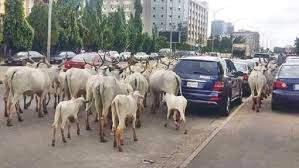
to the clashes between farmers and herders
Nothing more!
And, here is where we need Mr President to muster the political and legal will, to outlaw open grazing within Federal territories/routes, as the States outlaw same within their demographic jurisdiction.
No amount of the establishment of a Ministry of Livestock Development or Livestock Development Committee, can reduce, let alone, stop the farmers and herders’ clashes. Mr President, Sir, open grazing by armed wielding herders, is the fundamental reason for the clashes and nothing more.
Developing livestock and establishment of a Ministry in that respect, without adequate regulatory laws and enforcement to tackle open grazing, will further exacerbate the already volatile situation on ground at the moment. Security Agencies, Especially the Military are Required to Curtail Herders and Farmers Clashes, and not the Creation of a New Ministry in that Respect
The issue as regards herders and farmers clashes, requires total and decisive enforcement of the outlawing of open grazing throughout Nigeria, and not the creation of this new Ministry. These herders are comprehensively armed, and as such, detect the farms to invade and even those to kill, whenever there is resistance.
So, the establishment of a Ministry for their development will even be counter-productive, and be used as a facade to cause more havoc.
Mr President should therefore, proclaim a ban on open grazing, whilst adding this new Ministry as a department to the Ministry of Agriculture to implement ranching for the herders. Anything less, as
“Equal opportunity, for loans or subsidy, for development of livestock and crops, be given to herders and farmers….In addition to technological solutions, addressing the immediate security challenges should be a top priority….Integrating traditional conflict resolution mechanisms with formal legal systems…. Encouraging economic diversification in rural areas….”
in this instance, will be hopelessly ineffective and a fleeting illusion never to be attained in this clime.
Way Forward
1. Instead of creating a new Ministry of Livestock Development, the Federal Government should add same as a special department to the Ministry of Agriculture.
2. That department should also be specifically engrossed with implementing ranching in Nigeria. This will reduce the huge costs required to establish a new Ministry, and also promote efficiency.
3. The Federal and State Governments should outlaw open grazing throughout Nigeria.
4. Security agencies, especially the military, should be facilitated to enforce the ban on open grazing.
5. Registration and identification of all herders in Nigeria; their nationalities, State and Local Government of origin.
6. Farmers should also be equally registered by the Federal and State Governments, with the location of their farms and crops recorded by the department of livestock development.
7. Equal opportunity, for loans or subsidy, for development of livestock and crops, be given to herders and farmers.
8. A comprehensive database of all herders and farmers in Nigeria be created, to identify both categories in the country. Their biometrics, be taken as a condition precedent for recognition and Government support.
9. Co-opting the head of Myetti Allah and leader of Farmers Association of Nigeria, into the architecture for the enforcement of ranching.
10. Immediate arrest and prosecution of any herder whose livestock is responsible for destroying farmlands of farmers.
11. Products from livestocks should be well packaged for consumption and export, by the department of livestock development under the Ministry of Agriculture.
12. Assemblage of veterinary doctors, professionals and animal experts to ensure the health status of these livestocks, to boost productivity and prevent diseases as well.
Conclusion
It is our modest view, that new Ministry of Livestock Development should be downgraded to a department
of the Ministry of Agriculture, with a clear mandate to develop and regulate through ranching, livestock development and their products. This will aid efficiency, and drastically reduce any further financial affliction on our now severely drained economy.
Dr Akpo Mudiaga Odje LLD, LLM (Merit)(London), BL; Constitutional Lawyer; Member of the British Council
New Ministry of Livestock: A Questionable Approach to Addressing Security Challenges
Emmanuel Onwubiko
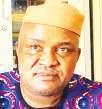
The recent establishment of a new Ministry of Livestock Development by President Bola Tinubu, has ignited a significant and contentious debate. This new Ministry is purportedly designed to address the ongoing and severe violence, perpetrated by armed herders against farmers. While the Government presents this initiative as a solution to the crisis, critics argue that it will not effectively address the root causes of the violence, and might even exacerbate existing issues. This scepticism is compounded by the Ministry’s announcement coinciding with reports of continued attacks on farms, highlighting the urgent need for a more direct and effective response to these security threats.
The violence inflicted by armed herders on farmers is not a mere conflict, but a serious issue of terrorism. This violence, characterised by intimidation, destruction of property, and loss of lives, targets agricultural communities that are often left helpless in the face of these attacks. Unlike conflicts where both parties have grievances, these attacks are unprovoked acts of terrorism aimed at destabilising farming communities and undermining agricultural productivity. Therefore, the creation of a new Ministry appears to be a misguided approach, that does not address the immediate and pressing
needs of the affected communities.
Proponents of the new Ministry argue that the unique challenges of the livestock sector and herder-farmer conflicts, justify a dedicated Ministry. They believe a specialised focus can lead to innovative solutions, and substantial livestock management and dairy production improvements. The new Ministry aims to provide targeted interventions, such as establishing ranches and grazing reserves, which could mitigate conflicts by reducing competition for land and resources.
The Tinubu administration contends that by fostering the development of the livestock sector, the Ministry could potentially transform it into a significant economic contributor, creating jobs, enhancing food security, and reducing poverty in rural areas. They believe that this focused approach is necessary, for sustainable development and peace in affected regions.
However, some civil society organisations, such as the Human Rights Writers Association of Nigeria (HURIWA), have condemned the creation of the Ministry, arguing that it rewards violence by armed herders. HURIWA claims the new Ministry legitimises groups accused of terrorising farmers, and questions why a similar focus isn't given to farmers themselves. They advocate for compensating farmers for losses, and ensuring justice for those affected by violence.
HURIWA also criticises the perceived favouritism towards the Fulani ethnic group, which is predominantly involved in cattle herding. This perception could exacerbate ethnic tensions, and undermine efforts to foster national unity. The organisation calls for transparency in the Ministry’s operations, and accountability for any misuse of resources.
The establishment of the Ministry of Livestock Development, comes at a time when Nigeria is grappling with significant economic challenges and increasing calls for government downsizing. With 48 Ministers in the current administration, many of whom are criticised for their lack of effectiveness, the addition of a new Ministry raises concerns about fiscal responsibility and bureaucratic efficiency. The Government is already facing scrutiny for the performance of its existing Ministries, many of which are perceived as underperforming. In this context, expanding the bureaucracy by creating a new Ministry seems counterproductive. Critics argue that the Government should prioritise streamlining existing structures and ensuring that current Ministries are functioning optimally, before considering additional layers of administration.
President Tinubu had previously committed to implementing the Oronsaye Report, which advocates for the downsizing and reform of Nigeria’s public service. The Oronsaye Report is a comprehensive document that recommends dissolving redundant agencies, reducing the number of Ministries, and

streamlining operations to enhance efficiency. The creation of a new Ministry appears to contradict this commitment. Why is the President speaking from both sides of his mouth? Why promise to implement the Oronsaye Report, which aims to reduce the number of agencies, only to establish a new one? This apparent inconsistency raises serious concerns about the Government’s dedication to its reform agenda, and its ability to follow through on its promises.
Furthermore, the financial implications of establishing a new Ministry cannot be ignored. Nigeria is currently experiencing economic strain due to declining oil revenues, increasing public debt, and other economic pressures. In this challenging economic environment, the creation of a new Ministry appears particularly imprudent. The Government’s financial resources could be better utilised by revitalising and streamlining existing Ministries, improving public services, and addressing more immediate issues such as education, healthcare, and infrastructure. Adding another layer of bureaucracy could divert resources away from these critical areas, and exacerbate the country’s financial challenges.
Establishing a new Ministry entails significant costs, from salaries to infrastructure. In an economy facing multiple challenges, allocating resources to a new Ministry seems financially imprudent. Nigeria's high public debt and dwindling Government revenue exacerbate financial strain, leading some to label this move as a "political juxtaposition and financial misadventure".
Increased bureaucratic overheads, can also lead to inefficiencies. Effec-
“Why is the President speaking from both sides of his mouth? Why promise to implement the Oronsaye Report, which aims to reduce the number of agencies, only to establish a new one?….The global trend in agricultural management suggests that integrating livestock and crop production within a broader framework, is more effective than creating separate Ministries”
tive governance requires streamlined administration, and adding another Ministry may complicate policy implementation and coordination. This concern is particularly pertinent, given Nigeria’s already bloated bureaucracy and its inefficiencies.
Integrated agricultural policies are essential, for effective land use planning and conflict resolution. Separating livestock development could fragment these policies, leading to disjointed solutions. Policies regarding land use and resource management, must be coordinated between the Ministry of Agriculture and the new Ministry of Livestock Development to avoid conflicting directives.
The global trend in agricultural management suggests that integrating livestock and crop production within a broader framework, is more effective than creating separate Ministries. Countries like India, Brazil, and Australia manage livestock within their broader agricultural policies, ensuring a cohesive and integrated approach. Nigeria could benefit from adopting a similar model, which would avoid the fragmentation of policies, and enhance overall agricultural management. Fragmented approaches, such as creating a new Ministry solely for livestock, risk creating disjointed policies that may fail to address the complex and interconnected issues facing the agricultural sector.
Technological advancements could also play a crucial role in addressing the violence perpetrated by armed herders. Investments in satellite imaging, drones, and digital platforms for communication and conflict resolution could provide valuable data-driven insights and enhance resource allocation. These technologies could help monitor grazing patterns, prevent encroachment on farmlands, and facilitate better communication between farmers and herders. Integrating technological solutions into agricultural management could offer more effective and sustainable approaches, to addressing the security challenges and improving overall productivity.
In addition to technological solutions, addressing the immediate security challenges should be a top priority. Effective law enforcement is essential for combating the terrorism perpetrated by armed herders. This includes strengthening security forces, enhancing surveillance, and ensuring that perpetrators are held accountable for their actions, not creating a new
Ministry for them. The Government must focus on practical measures that directly address the violence and provide justice for victims, rather than creating additional bureaucratic layers that do not contribute to immediate security solutions.
Engaging local communities in dialogue and decision-making processes, is also crucial for sustainable conflict resolution. Policies and interventions should be culturally sensitive, and widely accepted by the affected communities. Integrating traditional conflict resolution mechanisms with formal legal systems, can provide comprehensive solutions and promote long-term peace. Encouraging economic diversification in rural areas can reduce dependence on farming and herding, providing alternative livelihoods, and reducing competition for land. Promoting agro-processing industries and other rural enterprises, can create jobs and boost local economies.
Conclusion
In conclusion, while the establishment of the Ministry of Livestock Development aims to address critical issues, it raises significant concerns about bureaucratic redundancy, financial strain, and fragmented policy implementation. The Government should prioritise practical and effective measures to combat the terrorism inflicted by armed herders, and streamline existing structures to ensure efficient governance.
The creation of a new Ministry, as it stands, risks deviating from the principles of reform and efficiency. Nigeria needs a cohesive, wellcoordinated approach to governance that integrates livestock development within the broader agricultural framework, leverages technological advancements, and engages local communities. Only through such an approach, can the country address its security challenges and pave the way for sustainable development. The Government must ensure that its interventions are inclusive, equitable, and transparent, to build trust and foster national unity.
Emmanuel Onwubiko, Head, Human Rights Writers Association of Nigeria (HURIWA); former National Commissioner, National Human Rights Commission of Nigeria

Photo





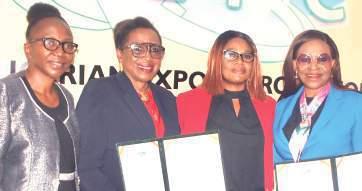

John Humphrey is His Majesty’s Trade Commissioner, HMTC, for Africa. As HMTC for Africa, he works closely with the wider diplomatic network and other colleagues to coordinate the UK government effort to promote UK trade and investment across the African continent given that he has full responsibility for all Department for Business and Trade (DBT) work in Africa including the growing the overall bilateral trade and investment relationship between the UK and Africa; improving market access for British companies, including small- and medium-sized businesses (SMEs); and developing finance and trade policy. In his first ever visit to Nigeria since his appointment in 2022 as HMTC, amongst other things, he exclusively shared plans to boost the volume of trade deals with Africa, His Majesty’s wider prosperity agenda, as well as the partnership with Nigeria to unlock new opportunities and drive sustainable development for both nations, with Chiemelie Ezeobi
As His Majesty’s Trade Commissioner for Africa, what are the plans to boost the volume of trade deals with Africa, especially in Nigeria?
Africa matters. We want to foster opportunities for mutual-long term benefit. By 2050, Africa’s population will reach 2.4 billion - a quarter of the world’s population - with a median age of just 19. African markets will grow in real GDP terms by nearly 5% per annum between now and 2050.
We have nine trade agreements with 18 African countries, and a further 34 countries, including Nigeria, have access to the UK’s market through the Developing Countries Trading Scheme.
And we already have close ties with Nigeria.
The UK-Nigeria Enhanced Trade & Investment Partnership, which launched in February 2024, aims to strengthen bilateral trade and investment relations between Nigeria and the UK by prioritising specific sectors and areas of economic co-operation.
Our approach has always been built on understanding African buyer needs, helping to match real projects with UK companies and UK capability. And this process works. We have supported about100 substantial deals over the last year or so. We have also built a team that has extensive UK sectors expertise, to offer African buyers a better set of links into UK companies, and more expertise on UK solutions. We are also increasing our activities with UK SMEs interested in Africa.
In helping British businesses export and invest in Africa, a responsibility you have been handling since 2022, what have been the challenges and how have you been navigating it?
From Cairo to Cape Town, the African continent is evolving and changing rapidly. However, African markets can be complex and bureaucratic, with businesses facing multiple hurdles and unpredictable business environments. In the last ‘ease of doing business’ survey, the average score for Africa was just over 50, compared to the global average of 63.
To navigate through these challenges, we’re supporting African countries to remove longstanding barriers which limit economic activities. We have a network of colleagues across Africa who focus on building these partnerships and collaborating with relevant stakeholders to navigate through and improve the business environment.
Covid-19 and the sovereign debt crisis that many African countries continue to face have impacted our activities, and we have worked patiently in these circumstances to increase awareness of the great opportunities that Africa offers. We have also engaged our African partners in Governments on improvements that can be made to ease access into African markets and are forging partnerships to help to drive this work forward. The Nigeria ETIP is an example of the progress that we can make together when we share priorities and match African buyer needs.
Given the global economic crisis, especially in Africa, do you think this has affected HMG’s “wider prosperity agenda”?
Many countries around the world have experienced challenging economic circumstances, which has been further exacerbated by Covid-19 and the wars in Europe and the Middle East. Despite this, HMG’s commitment to supporting economic development and global prosperity remains resolute.
The UK is a leading investor in Africa, and we have seen strong progress in creating new investments from the UK – in some of the most important sectors that will spur Africa’s growth – in:
• renewable energy (e.g. Gridworks projects being finalised in Mozambique, Uganda and Ethiopia)
• agriculture (e.g. United Green in Ethiopia and upcoming in Zimbabwe, Angola, potentially Ghana)
• mining (e.g. De Beers has increased its exploration supporting potential further investment in Botswana, Rio Tinto has increased furnace
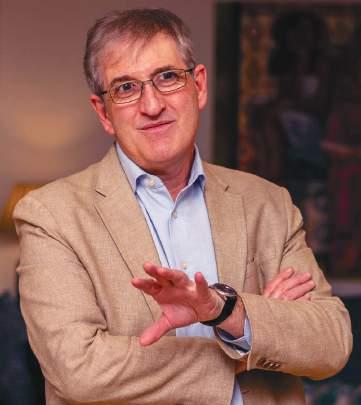
and energy investments in SA etc).
With your regional responsibility to Africa, on your visit to Nigeria, are there any trade and investment policies that are coming to Nigeria, and how will this partnership unlock new opportunities and drive sustainable development for both nations?
Deeper, closer partnership is what matters. For example, more trade missions in key sectors like construction and targeted engagements to meet Nigeria’s needs. I’m very pleased that Nigeria has firmed up its regulatory environment for international partnerships in education – this will lead to new partnerships between universities here in Nigeria. And there is so much scope across many sectors,with the Afreximbank hospital investment in Abuja a great example of a new partnership with Kings College Hospital NHS Foundation Trust. We also see new opportunities in listing on the London Stock Exchange to help raise the capital companies need to grow.
Can you share the regional trade plan deliverables, especially as the region is important in global markets?
We want to use trade and investment to drive forward economic growth. Nigeria will be a key partner in allowing us to achieve this mission, and we’re looking forward to working with businesses who share these ambitions. Our mission is to drive forward sustained incremental growth over the years to come, in terms of new export contracts and business investments made across our key sectors –
aerospace, agriculture/food, healthcare, FPS, mining, infrastructure, renewable energy, and education. All these sectors that are vitally important for Africa’s growth.
While continuously trying to strengthen trade ties with Africa through various initiatives such as the UK’s new Developing Countries Trading Scheme, can you shed more light on how the scheme intends to boost international commerce?
The DCTS is the UK’s simpler and more generous preferential trading scheme for developing countries. It benefits 65 countries which collectively export over £20bn in goods to the UK each year and came into force on 19 June 2023.
The DCTS has been designed to boost trade with developing countries, to support their development, build the markets of the future and strengthen our economic security.
The DCTS cuts tariffs, removes conditions and simplifies trading rules for developing countries that are home to 3.3bn people.
As an independent trading nation, we have been able to implement one of the most generous preferential trading schemes in the world, surpassing those of the EU and USA.
Under the Developing Countries Trading Scheme, which African countries have been offered quota and tariff-free to access to the UK market, and what was the selection criteria for?
33 out of 37 DCTS recipients have duty-free quota-free access to the UK under the DCTS’s Comprehensive Preferences Scheme. Nigeria,
Algeria, Cape Verde and Congo have at least 92% duty free quota free access. The full list can be found via https://www.gov.uk/guidance/preference-tiersunder-the-developing-countries-trading-scheme#findout-your-country-preference-tier.
The UK is one of the largest economies in the world with a diversified economy, how do you intend to make this trade process become more seamless and build value chain?
You are right that the UK is a major exporter –4thoverall and 2nd largest in services and a major investor in global terms. We plan to increase trade by supporting new businesses to enter African markets, from SMEs in the UK with new products and services, to large firms and new investors. We also want to strengthen the links between the City of London and Africa, helping African companies to raise finance for their businesses. As you know, UK firms such as Unilever, Diageo and the many others that have a presence in Africa, all have a strong reputation for building local value. This could be in terms of local production, links in with the science base, or in employment and Governance standards. UK production in mining is important too, through the activities of Rio Tinto and Anglo American.
What other benefits are there for Nigeria as a Commonwealth nation, do they benefit from lower trade costs?
The Commonwealth’s 56 members include many of the world’s fastest growing economies, with a combined market worth of $13.1 trillion in 2021 and projected to reach $19.5 trillion in 2027. Thanks to shared language, cultural ties and similar legal systems, Commonwealth members benefit from an average of 21% reduction in trade costs and 27% higher investment flows when trading bilaterally with other Commonwealth members (the “Commonwealth advantage”). To capitalise on this, the UK will work to enhance cooperation and boost intra-Commonwealth trade.
On your visit to Nigeria, you have engaged with different stakeholders. How did you position the UK as an investment hub in Africa that will reflect the shared goal of economic growth and prosperity for both nations?
The UK is one of the most popular destinations for international investment. Our stock of investment into the UK – assets owned by foreign companies –is worth more than $3trn, which is larger than France and Germany combined (UNCTAD WIR 24). This number reflects the appetite of the UK economy for international investment. Repeated investments and expansions over many years show that the UK is one of the most investable economies in the world. Not only is it a great place to raise finance, but also to help build a global business. Kuda Bank is a great example of a fintech that has benefited greatly from having a presence in both Nigeria and the UK, taking advantage of UK markets to accelerate international growth. There is real growth in African interest for investing in the UK, and we will help them to grow those businesses, in ways that will reinforce their success back home.
ABOUT
John Humphrey is His Majesty’s Trade Commissioner, HMTC, for Africa. Prior to joining the Department for Business and Trade (DBT), he was the Group Chief Executive Officer of Kent HoldCo Limited (KHL) and between 2012 and 2019, he was with the UK Hydrographic Office (an MOD Trading Fund).
From 2015, he was Chief Executive and Accounting Officer. Before that he was Chief Commercial Officer and Deputy Chief Executive. Earlier in his career, John worked in the technology sector in a variety of commercial, general management and executive roles in the UK and overseas.
He is a Younger Brother of Trinity House and was until recently a Lay Trustee of the Royal College of Speech and Language Therapy.
Oluchi Chibuzor
Chief Executive Officer of Optiva Capital Partners, Dr. Jane Kimemia, has received global acclaim after being honored with the prestigious Pan African Entrepreneur of the Year award at the African Achievers Awards, held at the House of Lords, Palace of Westminster, UK Parliament.
Now in its 14th edition, the African Achievers Awards celebrate African excellence by recognising and honoring notable individuals and organisations across various industries that significantly contribute to the continent’s growth and development.
This esteemed event serves as a platform to showcase Africa’s excellence, innovation, and resilience, challenging stereotypes and promoting a positive image of the continent.
A statement explained that Kimemia received the Pan African Entrepreneur of the Year award for her exceptional leadership at Optiva Capital Partners, a premier wealth management firm and Africa’s largest provider of second citizenship and residency services.
Upon receiving the award, Kimemia expressed her deep gratitude, stating, “I am deeply honored to accept the Pan African Entrepreneur of the
Year Award. This recognition is a significant milestone, reflecting the collective efforts of many at Optiva Capital Partners.” She thanked the selection committee for the honor and acknowledged Mr. Franklin Nechi, Chairman of Optiva Capital Partners, for the opportunity to serve. Dr. Kimemia also commended her team, saying, “Your unwavering dedication and passion are the driving forces behind our success. This award belongs to all of you.”
Optiva Capital Partners’ journey has been filled with challenges, transforming from an insurance brokerage a decade ago into a full-fledged wealth management company. Navigating complex regulatory landscapes and building trust in diverse markets, Dr. Kimemia and her team have gained valuable lessons that have strengthened their resolve to excel. Today, the company proudly reflects on the significant impact it has made and the lives it has touched.
In her welcome address, the Rt. Honourable Baroness Verma, Host and Member of the House of Lords of the United Kingdom, expressed her joy that Africans have taken up the responsibility to shape the continent by telling their stories as they should be told,
not as others want to see them.
“I’m glad to say that the people of Africa have taken their destiny into their own hands. They want to shape the continent as they see it, not as others believe it should be,” she stated. “We are celebrating the honorees today because they are inspirational figures, and their stories need to be showcased. A lot of work has been done by these individuals in their countries, and it is important to tell their stories to the world through the African Achievers Award,” she added.
Delivering her keynote address titled, “Africa’s Sustainable Future: Redefining its Global Identity,” Her Royal Majesty Olori Atuwatse III, Queen Consort of Warri Kingdom, Nigeria, emphasized the importance of the continent continuing to propagate positive cultural and traditional values with the goal of reshaping its identity. She called on all African countries to collaborate on various fronts to improve the continent’s overall well-being. “We must come together, trade together, build solutions together, and speak with singularity on the global stage. We must stop saying what Africa does not want and begin to articulate who we are and what we want for ourselves and for our continent,” she declared.
Kemi Olaitan in Ibadan
One of the country’s leading indigenous quick service restaurants, Sooyah Bistro, has opened another branch in Ibadan, marking its 10th location and the first outside Lagos State.
The newly opened office is located on 93, Moshood Abiola, in Ring Road area of the ancient city.
The Oyo State Commissioner For Energy, Seun Ashamu, while performing the official opening ceremony, described the new branch as another mission accomplished by the Founder and Chief Executive Officer of Sooyah Bistro, Mrs. Olamidun Ogundoyin.
He said the expansion of the restaurant to Ibadan is a testament to the enabling business environment and the growth potentials of the state, stating that as Commissioner for Energy he recognizes the importance of entrepreneurship and innovation in driving economic development.
“I encourage Sooyah Bistro
to continue providing excellent services and creating opportunities for our citizens. I also urge the management to explore ways to partner with our government to promote tourism and economic growth in Oyo State,” he said
The Speaker of the state House of Assemblyand husband of the CEO, Hon. Adebo Ogundoyin, in his remarks, said the ceremony was a momentous occasion, which marks a significant milestone in the journey of Sooyah Bistro, noting that he has had the privilege of witnessing the hard work and dedication that has gone into building the brand.
According to him, “Today, we celebrate not just the opening of a new branch but the realization of a vision to bring people together through good food and warm hospitality. Sooyah Bistro’s commitment to quality and excellence is a testament to the entrepreneurial spirit that drives our state forward. I commend the team for their tireless efforts
and congratulate them on this achievement.”
The Founder and CEO of Sooyah Bistro, Mrs. Ogundoyin, in her own remarks, said the restaurant is thrilled to bring its unique brand of ethnic cuisine to Ibadan, a city that shares its values of culture, community, and entrepreneurship, stating that its goal is to celebrate Nigerian food and culture nationwide and internationally.
She maintainedthat Sooyah Bistro’s expansion to Ibadan is another dream come true and mission accomplished, noting that the restaurant is ready to further explore the business friendly environment of Ibadan as it is known for quality and will not renege on this.
“I started Sooyah Bistro in 2018 with a Suya Mallam and N20,000 worth of stock. We have grown this far— not through loans or investments but organically because of how much our Suya Family love our food and support the brand,” she said.
Kingsley Aliamaka
Sims Nigeria Limited, has launched a sister-company focused on delivering uninterrupted power-supply solution to Nigerians called Sims Power.
The launch showcased an impressive lineup of global brands, like Royal, Su-kam and Huawei.
The launch, according to the company, was graced by the presence of prominent figures in the industry, with the Chairman of Sims Nigeria Limited, Mr.
Simeon Eyisi, leading the lineup of participants.
Also present at the event are CEOs in Green Energy and e-commerce sectors, the representatives of Su-kam and Huawei, and the management and staff of Sims Nigeria Limited.
At the event which holds high potential for the Nigerian Green Energy industry, Eyisi in his opening remarks, praised the birth of Sims Power, highlighting the importance of alternative power supply in Nigeria and congratulated Sims

Power. While expressing his enthusiasm for the company, he stressed the joint responsibility to drive technological improvement and availability across Africa.
He further stated that Sims Power would empower Nigerians through sustainable solar solutions by providing alternative power to residential and commercial customers.
He said: “Sims Power seeks to deliver better air, reduce health hazards, and critically reduce pressures on the national grid across Nigeria.”
Kayode Tokede
The Nigerian stock yesterday opened the new week strong as investors’ renewed interest in Presco Plc and 28 others to push market capitalisation by N167.23billion.
Specifically, the Nigerian Exchange Limited All-Share Index (NGX ASI) gained 295.00 basis points or 0.30 per cent to close at 99,966.28 basis points from 99,671.28 basis points it opened for
trading.
Also, market capitalisation rose by N167.23 billion to close at N56.608 trillion from N56.441 trillion it close for trading last week.
The upturn was driven by price appreciation in large and medium capitalised stocks amongst which are; Presco, MTN Nigeria Communications (MTNN), Zenith Bank, United Capital and Ikeja Hotels.
As measured by market breadth, market sentiment
was positive, as 29 stocks gained relative to 16 losers. Cutix emerged the highest price gainer of 9.96 per cent to close at N5,08, per share. Ikeja Hotels followed with a gain of 9.45 per cent to close at N6.95, while Royal Exchange advanced by 8.96 per cent to close at 73 kobo, per share.
SUNU Assurance went up by 8.40 per cent to close at N1.29, while Red Star Express appreciated by 8.15 per cent



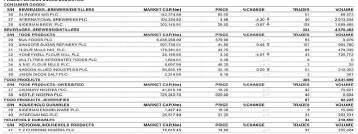

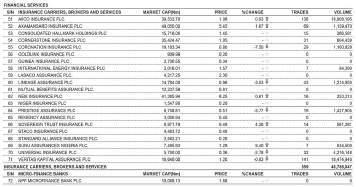
to close at N4.38, per share.
On the other side, Chellarams led others on the losers’ chart with 9.76 per cent to close at N3.70, per share. Abbey Mortgage Bank followed with a decline of 7.04 per cent to close at N2.51, while Jaiz Bank shed 5.78 per cent to close at N2.12, per share.
Ellah Lakes lost 5.36 per cent to close at N3.00, while International Breweries depreciated by 4.20 per cent to close at N3.88, per share.
The total volume of trades decreased by 13.89 per cent to 362.430 million units, valued at N7.368 billion, and exchanged in 8,405 deals. Transactions in the shares of Guaranty Trust Holding Company (GTCO) led the activity with 66.901 million shares worth N3.065 billion.
Access Holdings followed with account of 44.495 million shares valued at N854.417 million, while FCMB Group traded 26.736 million shares valued at N203.084 million.
Japaul Gold & Ventures traded 21.447 million shares worth N41.679 million, while UACN traded 20.326 million shares worth N287.791 million. Looking forward, analysts at United Capital Plc, stated that “the equities market is expected to show mixed performance as investors adopt opportunistic investment strategies. We foresee selective buying of fundamentally strong stocks continuing into the upcoming week.

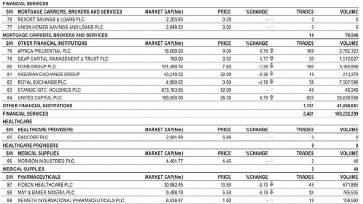

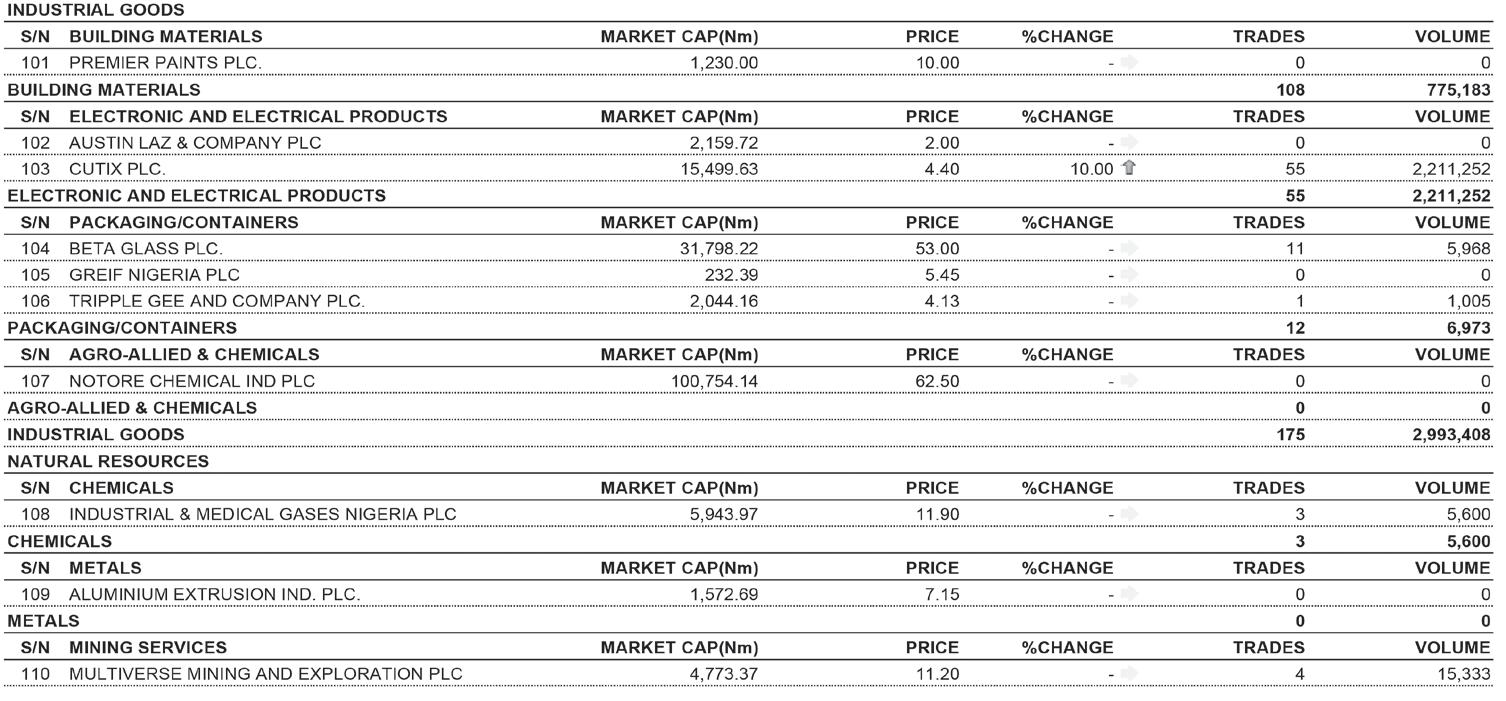

Bekeme Olowola
Introduction
In Nigeria’s oil-rich regions, the role of women has traditionally been marginalised despite their potential to drive significant societal change.
The Petroleum Industry Act (PIA), designed to enhance the governance and developmental benefits of oil resources, offers a promising framework for addressing gender disparities. This article explores the ripple effect of women’s inclusion in Nigeria’s oil industry, leveraging key findings from the PIA Research Report conducted by CSR-in-Action. By examining the impact of empowering women in oil-producing communities, we can understand how their participation leads to broader societal benefits, driving sustainable development and equity.
Background
Nigeria’s oil industry, primarily concentrated in the Niger Delta region, plays a crucial role in the national economy. The states of Akwa Ibom, Delta, and Rivers account for about 90.1% of the country’s total oil production. Despite the wealth generated, these regions face significant challenges, including environmental degradation, economic inequality, and social unrest. Historically, women in these communities have been excluded from decision-making processes, limiting their ability to contribute to and benefit from oil-related development initiatives.
The PIA was enacted in 2021 to address these issues by improving the management of oil resources and ensuring that host communities receive a fair share of the benefits. A critical component of the PIA is the establishment of Host Community Development Trusts (HCDTs), which are designed to fund and execute projects for the sustainable development of oil-producing areas. The PIA emphasises gender inclusion, requiring women’s representation in community committees and decision-making bodies.
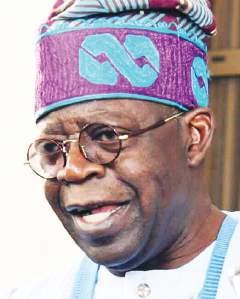
community, Delta State, being aware of the Act.
• Women’s Representation: Only 36.2% of respondents reported women’s representation in community committees. The inclusion of women in decisionmaking processes was minimal, with just 5% of respondents in Oleh community reporting women’s participation in oil company activities.
respectively. Empowered women contribute to household financial stability, which in turn supports better education, health, and overall well-being for their families.
2. Health and Well-being: The inclusion of women in community committees and health initiatives has a direct impact on family health and well-being. In Rivers State, 24.0% of respondents in Buan community reported that Shell had improved maternal health, while 21.0% noted similar contributions from Chevron. Women’s involvement in health-related decision-making ensures that community health needs are adequately addressed, leading to improved maternal and child health outcomes.
3. Education and Literacy: Educated women are more likely to invest in their children’s education, creating a cycle of improved literacy and educational attainment. In Rivers State, 45.0% of respondents in Buan community affirmed that Shell had improved education and literacy rates. By participating in scholarship committees and educational initiatives, women ensure that more children, especially girls, have access to quality education.
4. Reduction of Poverty and Hunger: Women’s inclusion in economic activities and decisionmaking helps reduce extreme hunger and poverty. In Mkpanak community, Akwa Ibom State, 15.0% of respondents reported that Mobil’s presence had led to a reduction in extreme hunger and poverty. Empowered women are better positioned to advocate for and implement sustainable development projects that address food security and economic disparities.
(HCDT).
3. Limited Representation: Women’s representation in community committees and decision-making bodies is still limited. The PIA Research Report indicates that only 36.2% of respondents reported women’s representation in such committees, which restricts their ability to influence community development projects.
4. Economic Constraints: Economic barriers, including lack of access to resources and financial support, prevent women from fully participating in economic activities and community leadership roles. Addressing these constraints is crucial for enhancing women’s economic empowerment.
Recommendations and Solutions
To maximise the benefits of women’s inclusion in Nigeria’s oil-producing communities, the following recommendations are proposed:
1. Enhancing Awareness and Education: Implement community awareness campaigns to educate residents about the PIA, the HCDT, and the importance of gender inclusion. Workshops, seminars, and information sessions can help bridge the awareness gap.
2. Promoting Gender-Inclusive Policies: Ensure strict enforcement of the PIA’s gender inclusion provisions. Oil companies and community leaders must be held accountable for implementing policies that promote women’s participation in decision-making processes.
Key Findings from the PIA Research Report
Recently, CSR-in-Action initiated research to investigate the implementation of the PIA as concerns the current state of women’s inclusion in Nigeria’s oil-producing communities. The study, conducted in Akwa Ibom, Delta, and Rivers States, utilised a multi-stage sampling method, involving structured questionnaires, Key Informant Interviews (KIIs), and Focus Group Discussions (FGDs).
Key findings include:
• Low Level of Implementation: 70.6% of respondents reported a low level of implementation of community support provisions as outlined in the PIA.
• Awareness and Participation: Only 35.7% of respondents indicated the existence of an advisory committee for the HCDT, and a mere 8.0% were members of community committees. Awareness of the PIA was notably low, with only 9% of men and 22% of women in Oleh
• Economic and Social Benefits: In Akwa Ibom State, 28.5% of respondents in Ekpene community experienced positive effects from Mobil, including increased family productivity, income, and improved health conditions. However, in Delta State, the presence of Shell and Chevron had not significantly increased family productivity or income.
Impact of Women’s Inclusion on Society Empowering women in oil-producing communities has a profound ripple effect, extending beyond individual benefits to foster broader societal change.
The PIA Research Report highlights several key areas where women’s inclusion can drive positive outcomes:
1. Economic Empowerment and Family Productivity: Women’s participation in economic activities and decision-making processes leads to increased family productivity and income. In Akwa Ibom State, for instance, Mobil’s involvement has positively impacted family productivity and income, as reported by 22.5% and 18.0% of respondents,
5. Environmental Stewardship: Women play a crucial role in environmental conservation and management. Their inclusion in community committees ensures that environmental concerns, such as oil spillage and land degradation, are addressed. Despite low representation, women in Ugborodo community, Delta State, have reported involvement in compensation processes for oil spillage, highlighting the need for greater inclusion to enhance environmental stewardship.
Challenges and Barriers
Despite the recognised benefits of women’s inclusion, several challenges and barriers persist:
1. Cultural and Societal Norms: Traditional gender roles and cultural biases often hinder women’s participation in decision-making processes. In Kwawa community, Rivers State, 80.5% of respondents reported that women were not included in the Host Community Bodies because they were too shy to indicate interest, or were persuaded by their husbands to refrain from pursuing leadership positions.
2. Lack of Awareness: Awareness of the PIA and its provisions remains low among community members. This lack of awareness hampers the effective implementation of gender-inclusive policies. For example, only 0.5% of the population in Kwawa community, Rivers State, were aware of the Host Community Development Trust
3. Supporting Women’s Economic Empowerment: Provide women with access to financial resources, training, and support to engage in economic activities. Microfinance programmes, entrepreneurship training, and vocational education can empower women economically.
4. Encouraging Cultural Shifts: Address cultural barriers by promoting gender equality and challenging traditional norms that restrict women’s participation. Community dialogues and engagement with traditional leaders can foster a more inclusive environment.
5. Strengthening Women’s Representation: Increase the number of women in community committees and leadership roles. Quotas and affirmative action policies can ensure that women are adequately represented in decision-making bodies.
Conclusion
The inclusion of women in Nigeria’s oil industry has a significant ripple effect, driving economic, social, and environmental benefits that extend beyond individual communities. By addressing the challenges and barriers to women’s inclusion and implementing targeted recommendations, Nigeria can harness the full potential of its oil industry to drive sustainable development and gender equity. The journey towards a more inclusive and equitable oil sector is essential for the well-being and prosperity of Nigeria’s oil-producing communities.
•Olowola, Chief Executive, CSR-in-Action, and Convener, Sustainability in the Extractive Industries (SITEI) Conference.
its resilience and doggedness had earned it global recognition and commendation.
the sacrifices, victories
and contributions of the Nigeria Army to national development, he noted that the contributions of the Nigeria Army to national unity, integration and development could
not be overemphasised.
Lagbaja, who spoke at the interdenominational service held to commemorate the Nigeria Army day held at the Cathedral Church of
We’ll strengthen bilateral relationship with Lagos - High Commissioner
Christ, Anglican Communion, Mayo Dasa in Jalingo, commended the officers and men of the Army for their invaluable contributions and sacrifices to the country.
Government, said his administration will continue to improve the Ease of Doing Business and provide a safe and secure environment for businesses to thrive in Lagos State. Governor Sanwo-Olu spoke during a courtesy visit by the High Commissioner of India to Nigeria, Mr. Balasub Ramanian, at the Lagos House, Ikeja.
when the fellows of the Lateef Jakande Leadership Academy visited India last month for their internship.
The Governor acknowledged the support of the High Commissioner of India to Nigeria and other officials
He said, “There have been several decades of relationship between India and Nigeria even before our independence. India and Nigeria have so much in common that they have learned and will continue to learn from each other. We will continue to create a mutually beneficial partnership between the two countries.
“For us to take the first set of the Lateef Jakande Leadership Academy fellows to India wasn’t a difficult decision at all. We looked at the economy that has similar issues and challenges with us but have taken their own issues forward and begin to make good sense of it. We saw that in India and I told them that is where you need to go because that is the only place you will see it, feel it and also learn
Represented by the Commander, 6 Brigade, Nigeria Army, Jalingo, Brigadier General Kingsley Uwa, Lagbaja stressed that the Nigeria Army under his command was determined and committed to delivering on its constitutional responsibilities to the country.
“My command philosophy seeks to transform the Nigerian Army into a well-trained, equipped, and highly motivated force towards achieving our constitutional responsibilities within a joint environment. We would not rest on our oars in reinforcing national security, the rule of law, and the economic prosperity of Nigeria.”
He disclosed that the theme of
this year’s celebration, which was the 161st edition, “Transforming the Nigeria Army: Imperative for Combating Contemporary Security Challenges Within a Joint Environment” highlighted their responsibilities to national unity, integration and development. He reiterated that one of the cardinal purposes of celebrating the Nigeria Army Day was to thank God for His preservation in the past year, celebrate the officers and men of the army, honour the fallen heroes and seek God’s continuous blessings, protection and grace in the years ahead.
He enjoined Nigerians to continue to pray for the repose of the souls of officers, who paid the supreme price while defending the country as well as pray for wounded Soldiers as they recover.

Stories by Emmanuel Addeh in Abuja
Nigeria’s crude oil production increased by 16.7 million barrels in the first six months of 2024, compared to the same period last year, a THISDAY analysis of data from the Nigerian Upstream Petroleum Regulatory Commission (NUPRC), has shown.
Although still significantly lower than the expected production during the period, this was a 7.3 per cent growth in crude oil production put side by side the output for 2023.
However, the computation of the data from the industry regulator excluded blended and unblended condensate, which are outside the calculation of the Organisation of Petroleum Exporting Countries (OPEC).
At an estimated average Brent crude oil price per barrel of $85 in 2024, it showed that
the country may have made an additional gross amount of $1.41 billion compared to the same period last year.
But despite the improvement, it was still not enough to drag Nigeria out of its economic woes as the country continues to borrow to counter the prolonged reduced foreign exchange inflow into the economy.
Nigeria gets over 80 per cent of its foreign exchange earnings from the export of crude oil and is therefore highly negatively impacted by either falling crude oil production or prices in the international market.
For a long time, crude oil prices have stabilised at over $80 per barrel, but Nigeria has failed to markedly raise output during the period.
The country has blamed oil theft, massive oil assets vandalism, deteriorating infrastructure in the country’s Niger Delta as well as years of
The Transmission Company of Nigeria (TCN) has commissioned a 60 MVA power transformer in its Katsina facility, expected to add 48MW to the national grid.
Disclosing this in a statement, the TCN said:
“The Katsina sub-region of the TCN commissioned a 60MVA power transformer on Friday, July 12, 2024,

underinvestment for its persistent inability to raise production significantly.
Nigeria in recent times has resorted to borrowing to augment the little inflow of foreign exchange into the country’s FX market, first taking foreign loans of $1.71 billion to boost FX into the country in the first nine months of 2023.
In August last year, Nigeria’s state-oil firm, the Nigerian National Petroleum Company Limited (NNPC) announced that it had secured a $3.3 billion crude oil repayment loan from Cairo-based AfreximBank that will support the government’s reforms to stabilise the exchange rate market.
Recently, the Board of the World Bank approved a $2.25 billion loan for Nigeria to shore up revenue and support economic reforms that have contributed to the worst costof-living crisis in many years for
Africa’s most populous country.
But the data detailing Nigeria’s production for the first six months of 2024 showed that the country’s output hit 235.9 million barrels during the period, while it was 219.2 million barrels in the same period the previous year.
A breakdown indicated that in January, Nigeria drilled 44.2 million barrels; 38.3 million barrels in February; 38.1 million barrels in March; 38.4 million barrels in April as well as 38.7 million barrels and 38.2 million barrels in May and June respectively.
On the other hand, in 2023, the country produced 39.2 million barrels OPEC oil in January; 36.1 million barrels in February and 39.2 million barrels in March.
In April last year, the output dropped to 30.1 million barrels; 36.8 million barrels in May and 37.8 million barrels in June.
Despite repeatedly targeting
in its 132/33kV Kankia Transmission Substation.
“As a result, Kankia substation now has more available bulk electricity for Kano Distribution Company (Disco) to
offtake and distribute to its customers in Kankia and environs. The commissioned transformer added 48MW to the national grid.
“This commissioning

a production of 2 million bpd crude oil for years, the country has failed to meet its OPEC quota, which was slashed from 1.74 million bpd last year to the current 1.58 million bpd.
To put it in proper context, Nigeria, Africa’s biggest crude oil producer, also owns the second largest reserves of the resource on the continent.
It also has over 209 Trillion Cubic Feet (TCF) in gas reserves, but is hardly able to get the required quantity out of the ground as a result of lack of investment and several bottlenecks in the sector.
At the weekend, the Minister of State, Petroleum Resources (Oil), Senator Heineken Lokpobiri, announced that to further ensure that the oil produced in Nigeria is well accounted for, the federal government had awarded contracts to ensure the full metering of Nigeria’s 187 oil flow
stations as well as a software to track the movement of Nigeria’s oil in the high seas.
“As part of our steps to ensure that we have proper accountability, the Federal Executive FEC approved the metering of all our production. And we have 187 flow stations in the country, littered across the Niger Delta area, so that we will be able to properly account for what we produce and what we export.
“It’s a major development that never happened in this country. And this project is meant to be completed within six months, within 180 days,” the minister disclosed.
He said that an advanced cargo policy was being implemented, pointing out that for Nigeria to account for what it produces, it will now be able to see the loading of every cargo of crude oil up to the point of destination.
further attests to TCN’s commitment towards further increasing its capability to wheel more bulk electricity to distribution load centres nationwide.”
According to the company in the week of July 4, 2024, Nigeria’s electricity generation stood at a 4,723.30mw peak, a decline from 4,800mw recorded on May 3.





Stories by Emmanuel Addeh in abuja
The tech sector’s decarbonisation goals are challenged by Artificial Intelligence (AI) power demands, with Google reporting a 48 per cent increase in carbon emissions over the last five years, a BBC report has said.
AI and electric vehicles are expected to add significant electricity demand to the US grid, potentially leading to energy shortages and increased energy bills.
The growth of AI has come on so strong and so fast that it threatens to destabilise the energy industry, the economy, and the
climate, the report said.
“AI-powered services involve considerably more computer power - and so electricity - than standard online activity, prompting a series of warnings about the technology’s environmental impact,” the BBC reported.
Indeed, a recent study from scientists at Cornell University found that generative AI systems like ChatGPT use up to 33 times more energy than computers running task-specific software. Furthermore, each AI-powered internet query consumes about ten times more energy than traditional internet searches. This runaway increase in power
The Chief Executive Officer of the Federal Mortgage Bank of Nigeria (FMBN), Shehu Osidi, was at the weekend conferred with the fellowship of the Association of National Accountants of Nigeria (ANAN).
At the event which took place at the FMBN headquarters in Abuja, the Managing Director said the award was not just a personal honour, but a testament to the hard work of the team at the bank.
He stated that the association had long been a pillar of excellence and professionalism in the field of accounting, stressing that
the honour reflected the values being upheld at the FMBN. Osidi listed the values as: Integrity, accountability, and a relentless pursuit of excellence.
He explained that it was a reminder of the importance of the work of the bank in promoting financial stability and transparency in the housing sector and ensuring that every Nigerian has access to affordable housing.
“I also want to acknowledge the conferment of this fellowship as a recognition of the positive trajectory we are now beginning to witness in FMBN within the short period of assumption of office of the current executive management,” he added.
consumption as AI picks up speed poses a direct threat to the tech sector’s ability to make good on its decarbonisation promises.
While Google hasn’t budged from its net-zero by 2030 goals,
the company has admitted that, “as we further integrate AI into our products, reducing emissions may be challenging.”
“Altogether, the global AI sector is expected to be
responsible for 3.5 per cent of the world’s electricity consumption by 2030. In the United States, data centres alone could consume a whopping 9 per cent of electricity generation by 2030.
“That represents a two-fold increase of current levels. That punishing growth rate will have major implications for national energy security, not to mention the economy, “it added.
Dike Onwuamaeze
The Origin Tech Group (OTG) will collaborate with the Federal Ministry of Agriculture and Food Security to drive Nigeria’s integrated food security systems code-named Greener Hope Agricultural Productivity Programme (GHAPP).
This followed the Federal Executive Council’s approval of an Agro-Development Syndicated Facility (ADSF) that would enable the OTG to power Nigeria’s integrated
food security systems through a revolutionary large-scale agricultural mechanization.
The Minister of Agriculture and Food Security, Senator Abubakar Kyari, stated that the project would develop an integrated food security systems by combining food production, logistics and market hubs spanning 150,000 hectares across the country.
Kyari said: “It will provide irrigation equipment, mechanisation equipment, and land clearing for large farms ranging from a minimum of
2,000 hectares to a maximum of 25,000 hectares per cluster.”
The minister also stated that in addition, the programme is projected to create about 1.5 million jobs and drive down food prices by about 25% per cent, adding that it could be likened to a Marshall programme for food production.
The programme, which is intended to achieve its objectives within three years starting from 2024, has a funding timeline of 10 years and would focus on crops of
immediate coverage. President Bola Tinubu hinted about the GHAPP as a cardinal project of his administration during his visit to Minna, Niger State. Tinubu said: “The GHAPP is a crucial platform for addressing the challenges in Nigeria’s agricultural mechanization.”
He underscored the administration’s dedication to transforming Nigeria into an economy of opportunities, ensuring food security, and supporting local industries.
Wood Mackenzie has said that solar will account for 59 per cent of new renewables between 2024 and 2033, with China expected to drive the growth, accounting for half of new solar deployment over the projected time period.
Solar developers are expected to install 3.8 TW (AC) of global capacity between 2024 and 2033, according to the latest forecast from Wood Mackenzie.
The analysts predict that new wind and solar installations will reach a combined 5.4 TW, taking the cumulative global total of the two technologies to 8 TW by 2033.
new capacity set to come online.
Vice President of global renewables research at Wood Mackenzie, Luke Lewandowski, said the growth was expected despite inflation, grid constraints, and permitting challenges.
“Global demand for renewables has reached unprecedented levels, driven by country-level policy targets, technology innovation, and concerns over energy security,” he explained.
between 2024 and 2033. Growth will be driven by China, which is expected to account for 50 per cent of new capacity.
Principal analyst of distributed PV at Wood Mackenzie, Juan Monge, said ultra-low module prices intensified the rate of solar deployments in Europe and China last year and will continue to do so in the near-term.
Group Business Editor
Eromosele abiodun
Deputy Business Editor
Chinedu Eze
Comms/e-Business Editor
Emma Okonji
Asst. Editor, Money Market
Nume Ekeghe
Senior Correspondent
Raheem akingbolu
(Advertising)
Correspondents
Emmanuel addeh (Energy)
KayodeTokede(CapitalMarkets)
James Emejo (Finance)
Ebere Nwoji (Insurance)
Reporters
Peter Uzoho (Energy)
Ugo aliogo (Development)
Since February, he said that the agenda set by the management had begun to bear the expected fruits, with a remarkable reduction in expenditure while revenue and income had been growing steadily.
While noting that the bank was recalibrating how it conducts its business across all facets, he expressed gratitude to the FMBN team for their dedication and hard work, which have been instrumental to the achievements.
In his remarks, the ANAN President, James Neminebor, said the FMBN was a key driver of the economy in Nigeria, stressing that ANAN is one of the oldest professional bodies in the country.
He stated that ANAN was faced with so many problems, including unpaid subscriptions.
Energy storage capacity, excluding pumped hydro, is also expected to grow by more than 600 per cent over the same time period, with almost 1 TW of
Emma Okonji
Neural AI, a Lagos-based startup that provides essential support to organisations intending to build and deploy Large Language Models (LLMs), has developed and launched a composable, ready-to-use data and AI compute infrastructure called REACTOR.
With the launch, Small, medium, or large businesses looking to explore how Generative AI (GenAI) can enhance their operations without the complexity of technical setups, can now heave a sigh of relief.
General Manager of NeuRaL AI, Chidera Anyanebechi, told journalists that NeuRaL AI’s REACTOR would simplify
“Energy storage will have the most balanced geographic footprint over the outlook due in part to its important role in helping to make renewable power available,” he added.
If Wood Mackenzie’s predictions are accurate, cumulative installed global solar capacity will nearly quadruple
everything with no selfhosting required, no need to construct and manage complex infrastructure and no operation of machine learning pipelines, caching, or query engines.
The startup also said that with REACTOR, companies would not require management of tens to hundreds of gigabytes of data nor expensive AI engineers or operations teams necessary.
“What we have developed is assuring businesses that no expertise in data science or machine learning is needed to benefit from GenAI. AI has become a leveler for all businesses irrespective of size. We handle all the heavy lifting for you,” Anyanebechi further said.
According to her, the
“Ultimately, maximising solar PV capacity, and wind power capacity for that matter, in the next 10 years will depend on additional technology developments: from expanding grid infrastructure to incentivising flexibility solutions, transportation and heating electrification,” added Monge.
Wood Mackenzie said yearon-year increases in installed
comprehensive Neural AI architecture gives the user access to a dedicated “Metal Vault” within its virtual compute cluster data center (REACTOR) which includes a dedicated IP and a user-friendly interface.
“We manage everything for you, from initial setup to ongoing maintenance. We will guide you through the entire process shown in the diagram and provide training for your team on how to use the system.
“All this is available starting at just N99k per month (excluding VAT).
Regardless of your industry or company size, from a team of 5 to a workforce of 5000, we can demonstrate how GenAI RAG can help your business achieve more,” she added.
solar will continue until 2026, at which point it forecasts a two-year slowdown due to an expected pause in development activity, before the next round of planned procurement drives higher deployment. Earlier this year, it predicted strong yet flat growth in annual solar deployment through to 2032. Wood Mackenzie said the global energy storage market is on track to reach 159 GW/358 GWh by the end of this year. It predicted that 926 GW/2,789 GWh will be added by the end of 2033 – a 633 per cent increase from the current level. China is expected to remain the global leader, with an average of 42 GW/120 GWh in annual capacity growth forecast over the next 10 years, PV Magazine said.
“She also said: “If your company is based in Lagos, we invite you to host us for a 1-hour GenAI adoption workshop tailored to your specific environment and use cases, completely free of charge. For companies outside Lagos, we can arrange a virtual session.”
The NeuRaL AI GM added that developers and software companies who are looking to build AI apps for their customers can leverage REACTOR to host their custom model trained on their own data for the monthly fee of 99k.
“We don’t charge per token as a lot of others do which brings down the cost considerably. It’s a win-win situation,” Anyanebechi said.
Eben Joels is the Managing Partner, of Stransact Chartered Accountants and Audit, an RSM correspondent firm in Nigeria. In this interview with Akanbi Festus and Adedayo Adejobi, he spoke on wide-ranging issues including why the federal government should be worried about the exit of multinationals from Nigeria, banks recapitalisation and the role of the CBN, how to mitigate inflation rates, and why multiplicity of taxes and other levies across the subnational makes the whole ideal and idea of ease of doing business a mirage, among others. Excerpts
The inflation rate, almost at 40 per cent, has practically affected the standard of living with the excruciating cost of goods and services. What can be done to mitigate this?
Amultifaceted approach is necessary. Tighter monetary policies to curb excessive money supply have not worked. Raising interest rates and increasing reserve requirements for banks have also not worked. I believe the government should focus on stabilizing the exchange rate by boosting foreign reserves and reducing dependency on imports. This is the time to strengthen the agricultural sector through subsidies and support programs to improve local food production so that we can look forward to reduced food prices.
On the fiscal policy front, the Nigerian government should be more efficient in public spending and curb wastage. Investing in infrastructure, particularly in transportation and energy, can lower the cost of doing business and reduce the prices of goods and services. Implementing social safety nets and targeted subsidies for essential goods can help alleviate the immediate burden on low-income households. Encouraging competition in key sectors, like telecommunications and energy, can also drive down prices through market forces. Fostering an environment that supports local manufacturing will create jobs and boost incomes.
With the state of infrastructure near comatose, Nigeria is forever grappling with power outages and other intractable problems in different areas. How much does the government need to invest in infrastructure to set the country on the path of progressive growth and socioeconomic development?
The government needs to make substantial investments in infrastructure. Estimates suggest that Nigeria requires approximately $3 trillion in infrastructure investments over the next 30 years to bridge the existing gaps and support its growing population. Immediate priorities should include significant allocations towards the power sector to resolve the chronic power outages that stifle business operations and daily life. Investment in renewable energy sources, upgrading the national grid, and expanding electricity access can transform the energy landscape, fostering industrial growth and enhancing the quality of life.
In addition to power, the government must prioritize investments in transportation, healthcare, and education infrastructure. Modernising and expanding the road network, railways, and ports will improve connectivity, reduce transportation costs, and enhance trade efficiency. Similarly, upgrading healthcare facilities and educational institutions is crucial for building a healthy and skilled workforce. Public-private partnerships (PPPs) can play a vital role in mobilizing the required capital and ensuring efficient project execution. By committing to comprehensive infrastructure development, Nigeria can create a more conducive environment for economic activities, attract foreign investment, and achieve sustained socioeconomic progress.
The organised labour in Nigeria called a strike recently and they have reduced their minimum wage demand to N250,000 per month while the Federal Government has offered N60,000, what do you think the minimum wage should be?
Determining an appropriate minimum wage in Nigeria requires balancing the needs of workers with the economic realities of businesses and the government. Given the significant gap between the organized labour’s demand of N250,000 per month and the Federal Government’s offer of N60,000, a middle ground must be sought. A reasonable minimum wage should consider the current inflation rate, cost of living, and the need to sustain businesses without causing undue financial strain. A new minimum wage is useless if it is not accompanied by policies aimed at boosting economic growth and productivity, which can support higher wages in the long term. Implementing measures to reduce inflation, such as stabilizing the exchange rate and improving domestic production, can help sustain wage increases. Additionally, enhancing social services, such as healthcare and education, can reduce the overall financial burden on workers. By adopting a holistic approach that includes a fair minimum wage and supportive economic policies, Nigeria can work towards a more equitable and sustainable economic environment for its workforce.
Fresh Graduates in Nigeria continue to complain about a lack of opportunities, and that you need to know some highly placed person to get a job, what do you think we can do as a country to

drive job growth for young people?
To drive job growth for young people in Nigeria, it is essential to create an enabling environment that fosters entrepreneurship and supports small and medium-sized enterprises (SMEs). We have a society where we worship big men without paying attention to their source of wealth. We define success as having a lot of cash in your bank account irrespective of whether that cash is from a criminal enterprise. Therefore the emphasis for many young people today is how to make quick money. It is not so much as to develop a skill to sell. For this reason, we produce a ton of unemployable people. People with the wrong values.
I still believe that there is always room for merit. For example, we are a top destination for the best-graduating students of most Universities around us and you do not need to know anyone to work with us. You only need to be competent and be armed with the right mindset- a continuous learning mindset, and of course, the right values.
Diageo, owner of Guinness Plc, is pulling out of Nigeria and has sold its 58% equity in the business to Singapore-based Tolaram. What is your thought on this, and what does it portend for the immediate future?
Diageo’s decision to withdraw from Nigeria and sell its stake in Guinness Plc to Tolaram indicates that it sees better opportunities elsewhere or perceives challenges in the Nigerian market that outweigh the potential benefits. This move might reflect a strategic shift in Diageo’s global portfolio or a reassessment of its investment priorities. Very clearly, Diageo has fashioned a more profitable way to derive income from Nigeria without having to deal with the harsh operating environment for businesses.
Tolaram Group probably sees this acquisition as an opportunity to solidify its presence in Nigeria. It already operates in Nigeria primarily through its subsidiaries in various industries, such as Dufil Prima Foods Plc, which produces the popular Indomie instant noodles, and the Lekki Deep Sea Port project.
The acquisition of Diageo’s stake in Guinness PLC indicates that it sees value in the Nigerian market and is willing to invest in it. Tolaram may bring a different perspective and strategy to the table, potentially leading to changes in how Guinness PLC operates in Nigeria. It could also signal increased competition or consolidation within the Nigerian beverage industry. While Diageo’s exit raises questions about the attractiveness of the Nigerian market for multinational companies, Tolaram’s investment suggests continued interest and opportunities for growth in the region.
Should we be worried about the exit of multinationals from Nigeria?
The departure of multinational companies from any country should ordinarily raise concerns. Such exits can impact employment, economic growth, and overall stability. These multinationals are some of the few places where you can find best practices in the recruitment, training, and compensation of personnel. They are some of the few companies where graft is not enshrined. Many Nigerian-owned businesses are not committed to best practices. However, it’s essential to understand the reasons behind these exits. They are driven by various factors such as economic challenges, regulatory issues, and security concerns, leading to strategic business decisions by the companies to exit the market.
Addressing these underlying issues could potentially attract and retain multinational investments. The government should focus its efforts on improving the business environment, enhancing security, providing regulatory clarity, and promoting economic diversification, which can mitigate the negative effects of multinational exits and encourage future investments.
The new recapitalisation for banks has been hotly debated because of some of the clauses. Do you think the Central Bank of Nigeria means well for the banking sector?
Overall, whether the CBN means well for the banking sector depends on the balance it strikes between strengthening financial stability, promoting competitiveness, and ensuring that the needs of the economy, businesses, and consumers are adequately addressed. Open dialogue and collaboration between the CBN, banks, regulators, and other stakeholders are crucial in navigating these challenges and achieving positive outcomes for the banking sector and the broader economy. Overall, I will be hopeful. The last round of capitalization spurred the capital market and boosted the economy. I hope this will be the same result.
Most banks still have a high percentage of Non-Performing Loans in their books despite measures taken by the CBN to reduce this. What can be done to make the banks solvent, so that they will not have to carry too much debt burden?
To address the persistent challenge of high non-performing loans (NPLs) in Nigerian banks, a multi-faceted approach is necessary. Firstly, banks should prioritise proactive risk management practices, conduct thorough credit assessments, and implement stringent monitoring mechanisms to identify potential defaults early on. This involves restructuring loans for struggling borrowers and adopting robust recovery strategies to mitigate losses effectively.
Simultaneously, regulatory bodies like the Central Bank of Nigeria (CBN) should enhance supervision and enforcement of prudential regulations, ensuring that banks maintain adequate capital levels to absorb potential losses and remain resilient in the face of economic volatility. Additionally, improving credit information systems and promoting economic diversification away from volatile sectors can reduce systemic risks and enhance banks’ stability, ultimately mitigating their debt burden and fostering a healthier banking sector. The CBN should above all mandate regular stress testing. Mandatory reporting of impairment indicators regularly should be considered.
Do you think Heritage Bank’s licence revocation is well-timed? Some think it might trigger a run on other banks, and drive panic
The timing of Heritage Bank’s license revocation by the Central Bank of Nigeria (CBN) is a critical decision with potential ripple effects. While the CBN likely has specific reasons for taking such action, including concerns about the bank’s financial stability or regulatory compliance, the timing must consider its broader impact on the banking sector’s stability.
Revoking a bank’s license can indeed trigger concerns among depositors and investors, potentially leading to a run on other banks and inducing panic in the financial system. Therefore, the CBN must carefully manage communication and ensure transparency to mitigate any spillover effects and
restore confidence in the banking sector. Additionally, the CBN should continue to provide reassurance about its commitment to maintaining financial stability and supporting affected depositors to prevent widespread panic and systemic disruptions.
The Central Bank of Nigeria (CBN) has dissolved the Board and Management of Union Bank, Keystone Bank, and Polaris Bank. What is the difference between the case of these banks and the case of Heritage Bank?
The CBN appointed new management teams to stabilise these banks and safeguard the interests of stakeholders. In contrast, Heritage Bank has not faced a similar intervention from the CBN rather, its license was revoked. I suspect this is because the degree of financial health and governance in Heritage Bank may be such that it cannot be salvaged.
The Naira has faced the toughest battle since it became a legal tender in Nigeria some four decades ago. The value has been completely eroded with its unprecedented crash in the foreign exchange market. Do you think the CBN is doing enough to hedge the Naira against the dollar so far, with the recovery strategy? And, can these efforts be sustained?
The Central Bank of Nigeria (CBN) has implemented several measures to hedge the Naira against the dollar, including interventions in the foreign exchange market, adjusting the monetary policy rate, and introducing various forex management policies. Despite these efforts, the Naira has continued to depreciate significantly, indicating that the current strategies might not be sufficient to combat the underlying issues affecting the currency’s value. Structural economic challenges, such as dependence on oil exports, limited foreign reserves, and a high import bill, especially the continued importation of petroleum products continue to exert pressure on the Naira.
Stabilising the Naira will require a multifaceted approach that goes beyond short-term interventions. The CBN must focus on diversifying the economy, enhancing domestic production, and improving the overall business environment to reduce reliance on foreign exchange. Additionally, policy consistency and transparent communication are essential to restore confidence among investors and market participants.
Among the challenges bedevilling businesses in Nigeria, is the multiplicity of taxes and other levies across the subnational making the whole ideal and idea of ease of doing business a mirage. What concrete measures can be put in place to ease the affairs of businesses to boost productivity and efficiency within the business ecosystem in the country?
To address the challenge of the multiplicity of taxes and levies that hinder businesses in Nigeria, a comprehensive tax reform is necessary. The government should streamline the tax system by consolidating various taxes and levies into a single, simplified tax regime. This can be achieved by implementing a harmonized tax policy across federal, state, and local levels to eliminate overlapping and redundant taxes. Establishing a centralized tax collection system would reduce administrative burdens on businesses, making compliance easier and more efficient. Additionally, providing clear guidelines and ensuring transparency in tax policies can help businesses better understand their tax obligations and plan accordingly. Furthermore, the government can enhance the ease of doing business by improving regulatory frameworks and reducing bureaucratic red tape. By creating a more business-friendly environment, Nigeria can stimulate productivity, attract investment, and ultimately drive economic growth.
There is much talk about Tax Reform in Nigeria. If the current President will stay in office for eight years, what do you think he should focus his tax reforms on?
If President Bola Tinubu remains in office for eight years, his tax reform efforts in Nigeria should focus on broadening the tax base and improving tax collection efficiency while crashing the tax rate. Broadening the tax base should mean having a tax system that requires every Nigerian to file a tax return with the centre. I will propose a Federal Income tax for individuals at a nominal rate and cause the states to share data with the Federal Inland Revenue Service. This will make the State Internal Revenue Services more efficient.
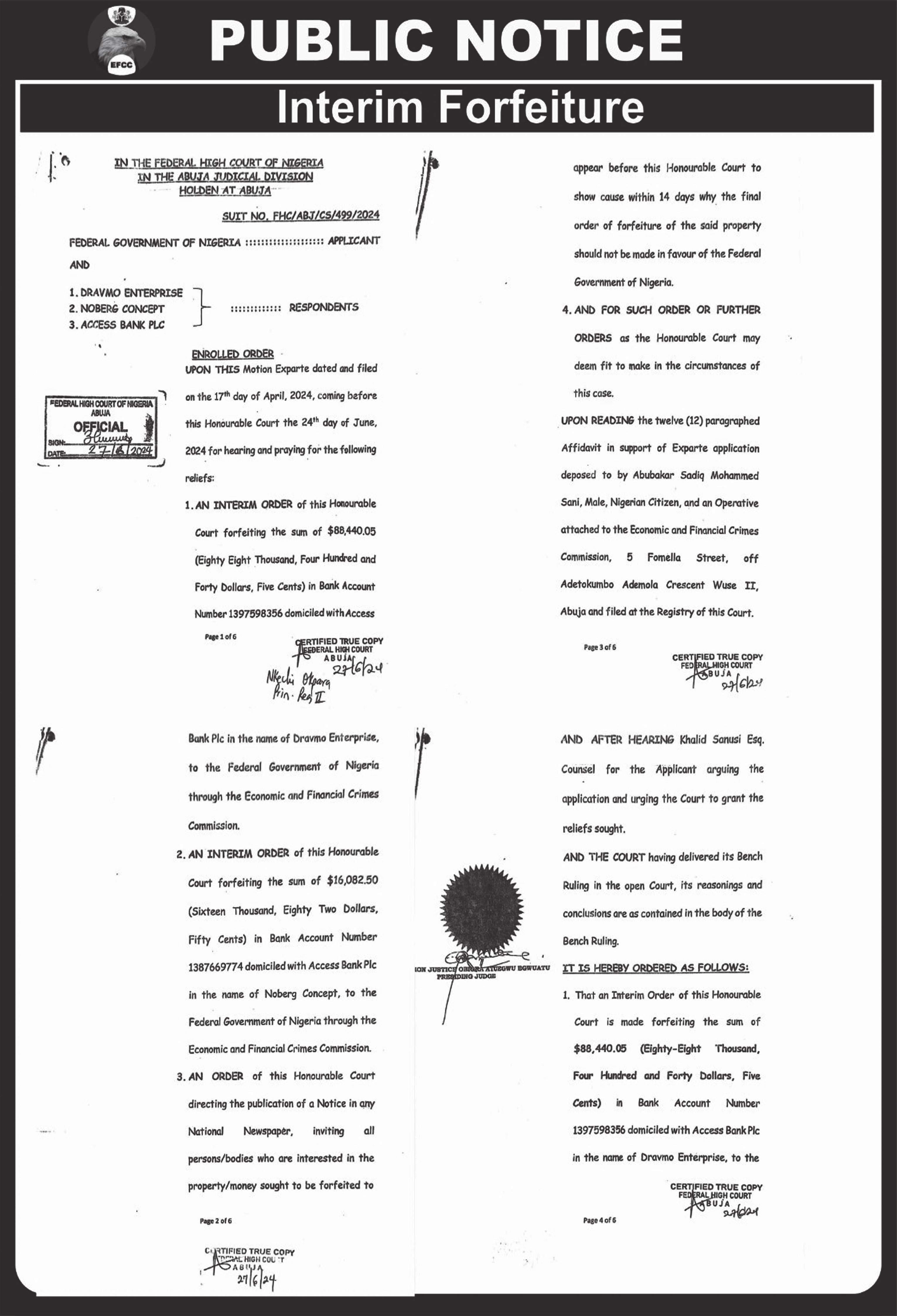

L-R:Chairman, Association of Licensed Telecommunications Operators of Nigeria (ALTON), Engr. Gbenga Adebayo; President, Nigerian Guild of Editor (NGE), Mr. Eze Anaba; Lead Consulting Strategist, DigitalSENSE Africa/ Editor, ITREALMS Media, Sir Remmy Nweke; President, Guild of Corporate Online Publishers (GOCOP), Ms Maureen Chigbo, Chairman, 2024 Nigeria DigitalSENSE Forum (NDSF) on Internet Governance for Development (IG4D)/ Executive Director, Media Rights Agenda, Mr. Edetaen Ojo; Managing Director, Condata Systems Limited, Dr. Chris Nwannenna; President/Founder, DNS Women Nigeria, Mrs Nkem Nweke; Managing Director, Wizyhub Technologies Limited, Mr. Francis Uzor, and Managing Director, Welcome Center Hotels, Mr. Jeff Fischer, at the award ceremony to mark NDSF@15 with the theme: IG4D: Innovative Digital Economy and Safer Civic Space in Nigeria at Airport Road, Lagos…recently
In line with its usual custom of rewarding loyalty, Africa’s Global Bank, United Bank for Africa (UBA) Plc, is set to launch the “UBA Legacy Promo” as part of activities to mark its 75th year anniversary.
The bank in a statement said the landmark campaign has been specially designed to celebrate UBA’s rich legacy spanning over 75 years, as well as its longstanding commitment towards rewarding its loyal customers in a grand style.
“The UBA Legacy Promo which will run for a period of six months beginning from July 2024, will see the bank doling out of N200m in cash prizes as well as other consolidation prizes to its teeming customers from various categories.
“This promo is open to several categories of Account holders including Bumper Account holders, Savings account, Kiddies & Teens Account holders as well as Nextgen account holders.:
“Specifically, 75 customers will win the star prize of N1 million each during the promo, while 75 other customers will each win N500,000. 75 customers will win N250,000 each, while another
75 customers will each win N100,000,” the statement reads.
“In the promo, 75 Kiddies, Teens, and NextGen customers will receive N200,000 in scholarship rewards and N180,000 in pocket money rewards respectively, just as many more customers will win N10,000 monthly cash prizes. Other consolidation prizes including shopping vouchers, loaded prepaid cards, and additional exciting rewards.
“To qualify for the promo, Bumper customers are expected to have a minimum of N 5,000 operating balance and multiples of N5,000 will give the customers a higher chance of winning. Customers under the savings category are expected to save a minimum of N 100,000 monthly, while multiples of N100,000 will give them more chances of winning.
“Kiddies & Teens Account holders will however need to maintain a standing instruction of N10,000 monthly to qualify for the scholarship reward, while NextGen customers, are expected to maintain a minimum of N5,000 and get a debit card to qualify for
the N180,000 pocket money reward,” it added.
UBA’s Group Head, Retail & Digital Banking, Shamsideen Fashola, expressed his excitement about the promo and said the bank is always excited to reward loyalty while encouraging the savings culture amongst its customers.
He said, “The UBA Legacy Promo is a testament to our enduring commitment to our customers. For 75 years, UBA has been at the forefront of banking innovation, and this promo is another way we are showing our appreciation and continuing to build on our legacy of trust and excellence.”
UBA’s Group Head, Marketing & Corporate Communications, Alero Ladipo, who emphasised the significance of the campaign, said, “As we mark this monumental anniversary, the UBA Legacy Promo not only celebrates our rich history but also reinforces our dedication to enriching the lives of our customers. We are thrilled to offer these fantastic rewards as a thank you for their unwavering loyalty.”
Dike Onwuamaeze
The Sundry Markets Limited, owners of Marketsquare, a leading indigenous retail chain in Nigeria, has been listed in the Financial Times’ “Africa’s Fastest Growing Companies 2024.”
The Financial Times’ ranking, which was done in conjunction with the Statista, highlighted companies that have shown exceptional growth even in the midst of economic hardships.
It said that while many African economies grappled with postpandemic recovery, Sundry Markets stands out for its ability to overcome both pandemic challenges and the continent’s broader economic struggles.
The Founder and Chief Executive Officer of Sundry Markets, Mr. Ebele Enunwa, said: “It is a pleasure to be listed amongst the top companies across Africa for 2024. Getting listed has shown that we are moving in the right direction. From a humble
beginning in 2015 and now, we have gained recognition across the continent. Sundry Markets has employed direct and indirect 5,000 people pan Nigeria.
“This accolade from the Financial Times underscores Sundry Markets’ commitment to growth, innovation, and excellence, reinforcing its position as a leading player in Africa’s retail industry.
Sundry Market currently has 31 stores located across 14 cities in Nigeria.”
A week after receiving the Engineering and Innovation meritorious award at the Nigerian Excellence Awards in Public Service (NEAPS), the Executive Vice Chairman of the National Agency for Science and Engineering Infrastructure (NASENI), Mr. Khalil Suleiman Halilu, has been honoured with the prestigious ‘Royal African Young Leadership Award’ by the Ooni of Ife, His Imperial Majesty Ooni Adeyeye Babatunde Enitan Ogunwusi, Ojaja II. The award was presented at the 4th edition of the Royal African Young Leadership Forum held on Saturday, July 13, 2024, in Ile-Ife, Osun State. The event organized by the palace of the progenitor of the Yoruba race, celebrates the achievements of outstanding young African leaders contributions to their communities and industries.
During the presentation, His Majesty, the Ooni of Ife, commended Khalil Halilu’s exemplary
leadership at NASENI, emphasizing how his visionary leadership and innovative approaches are propelling Nigeria towards a technologically and industrially advanced nation.
The Ooni noted that Halilu’s outstanding performance is a source of immense pride for the youth of Nigeria and is crucial for the country’s economic prosperity. He also expressed gratitude to President Bola Ahmed Tinubu for recognizing illustrious young Nigerians, mentioning other notable appointees such as the Director-General of SMEDAN, Mr. Charles Odii, the Minister of Youth, Dr. Jamila Bio Ibrahim, and the Minister of Youth (State), Ayodele Olawande Wisdom.
“These young men are part of the government of our dear country. I want to use this opportunity to celebrate you and appreciate the President for putting you into government,
thereby making your individual contributions to the development of Nigeria,” Ooni said.
Reacting to the award shortly after the presentation, the EVC/ CEO of NASENI expressed gratitude for the recognition, stating, “I am honoured to receive this award from His Majesty, the Ooni of Ife. Previously, I admired the Royal African Young Leadership Forum Award on social media. Being acknowledged in this way underscores His Majesty’s commitment to recognizing and celebrating the positive impact individuals make in their respective endeavours.”
Halilu further emphasized the importance of collaborative efforts in driving technological innovation and industrial growth in Nigeria. He reiterated his commitment to continuing the work that NASENI is doing to advance the country’s technological infrastructure and enhance its global competitiveness.

Dr Alim Abubakre, founder of TEXEM, UK, who is on the advisory board of the London Business School Advisory Board of the African Society, shares insights in this interview on TEXEM, UK’s ‘Revitalise Your Organisation: Inspire Sustainable Growth In A Recovering Economy’ executive development programme. It is scheduled to take place at Wheatbaker, Ikoyi, Lagos. This programme features world-renowned professor Paul Griffith, the world’s first professor of management to lead a team in launching a rocket, and Abubakre. Excerpts:
What are the most pressing challenges that leaders and their organisations in Nigeria face today?
Leaders and organisations in Nigeria today face a multifaceted array of challenges, underscoring the complexity and dynamism of both the global and local environments. The key issues include economic volatility, policy changes, infrastructural deficiencies, and a rapidly evolving technological landscape. The financial turbulence, exacerbated by fluctuating oil prices and currency instability, has significantly impacted business operations and strategic planning. Moreover, policy inconsistencies complicate this environment further, making long-term planning difficult and increasing operational risks.
Infrastructural deficiencies, particularly in power and transportation, pose significant hurdles. Reliable infrastructure is the backbone of any thriving economy. Its absence forces businesses to allocate substantial resources to mitigate these challenges, often at the expense of innovation and growth. Additionally, the rapid pace of technological change presents both an opportunity and a threat. While it offers the potential for significant competitive advantage, it also requires substantial investment and a willingness to adapt continuously. Many Nigerian organisations need help with integrating new technologies due to limited access to capital and a shortage of skilled talent.
Drawing parallels from India, which has faced similar infrastructural and technological challenges, Nigerian leaders can see a path forward. Through targeted investments in infrastructure and technology, coupled with policy reforms, India has created a more conducive business environment, advancing significant economic growth and development. Nigerian leaders can adopt and adapt strategies from India’s experience to address these challenges.
How does the ‘Revitalise Your Organisation: Inspire Sustainable Growth in a Recovering Economy’ programme specifically address these challenges?
The ‘Revitalise Your Organisation’ programme is meticulously designed to equip leaders with the tools and strategies necessary to navigate and thrive amidst these challenges. By leveraging a comprehensive and interactive learning methodology, the programme ensures that participants gain practical, actionable insights tailored to the Nigerian context. We begin by cultivating a change-ready culture. This module focuses on building a culture that is resilient and adaptable to change. Through games and role play, participants learn to lead transformational change, inspiring an environment ready to embrace new opportunities and technologies.
The programme also emphasises digital dominance. Here, we explore strategies to harness digital technologies for sustainable success. Participants engage in group discussions and case studies highlighting how businesses in other developing countries, like Kenya with its mobile money revolution, have leveraged technology to drive growth.
Understanding the intricacies of a recovering economy is crucial. Through peer-to-peer learning and self-reflection exercises, leaders develop strategies to mitigate risks associated with economic volatility and make informed decisions that drive growth. This programme also underscores the importance of purposeful leadership. By examining case studies from countries like Brazil, where purposeful leadership has transformed organisations, participants learn to inspire and align their teams toward a shared vision.
Brazil’s economy has faced significant ups and downs, yet companies like Natura have thrived by adopting purposeful leadership and sustainability practices. Nigerian leaders can adopt similar strategies to navigate economic turbulence and drive sustainable growth.
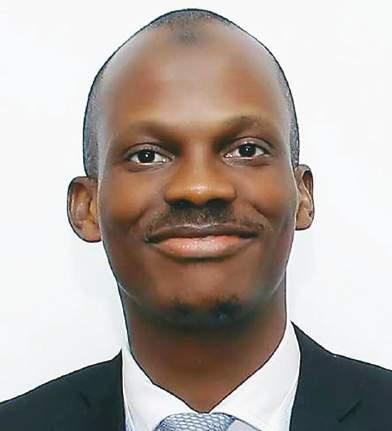
Can you elaborate on how this programme will help leaders enhance their decision-making capabilities in a turbulent environment?
Decision-making in a turbulent environment requires a blend of analytical rigour, strategic foresight, and adaptability. The ‘Revitalise, Your Organisation’ programme is designed to enhance these capabilities through a multifaceted approach. Participants learn to apply theoretical concepts to practical situations by analysing real-world scenarios and engaging in role-play. This experiential learning approach helps in understanding the complexities of decisionmaking under uncertainty. Participants undergo assessments to identify their decision-making strengths and areas for improvement. Peer-topeer learning sessions provide an opportunity to learn from the experiences of others, promoting a collaborative environment where diverse perspectives are shared. Observation practice and self-reflection exercises help leaders critically evaluate their decision-making processes, recognise biases, and improve judgment. In South Africa, companies like Discovery Limited have successfully navigated a turbulent environment by fostering a data-driven decisionmaking and continuous learning culture. Nigerian leaders can similarly benefit from adopting these practices to enhance their decision-making capabilities.
How does fostering a change-ready culture contribute to sustainable growth in an organisation?
A change-ready culture is fundamental to sustainable growth, ensuring an organisation can
adapt to evolving market conditions, technological advancements, and regulatory changes. Fostering such a culture involves several key elements. Leaders must demonstrate a commitment to change and innovation, setting a clear vision, communicating effectively, and leading by example. Engaged employees are more likely to embrace change. This can be achieved through continuous learning opportunities, recognising contributions, and fostering a collaborative work environment. Implementing agile processes allows an organisation to respond quickly to changes in the market. This involves iterative planning, regular feedback loops, and a focus on customer-centric innovation. In China, companies like Alibaba have thrived by fostering a change-ready culture. Alibaba’s emphasis on innovation, customer focus, and agility has enabled it to navigate the rapidly changing e-commerce landscape and sustain growth. Nigerian organisations can learn from this approach to cultivate a culture that supports sustainable development.
What role does purposeful leadership play in driving organisational growth and transformation?
Purposeful leadership is the cornerstone of growth and transformation. Leaders who embody a strong sense of purpose and inspire their teams to align organisational goals with societal needs and drive long-term success. Purposeful leadership involves articulating a clear vision that aligns with the organisation’s values and societal impact, providing direction and motivating employees to work toward common goals. Purposeful leaders prioritise ethical considerations in their decision-making
processes, building trust with stakeholders and enhancing the organisation’s reputation. By integrating sustainability into the core strategy, leaders ensure that growth is not only profitable but also beneficial to the broader community and environment. In Rwanda, leaders have driven national transformation through purposeful leadership. The country’s emphasis on sustainability, innovation, and social impact has spurred economic growth and improved quality of life. Nigerian leaders can adopt similar strategies to drive organisational growth and transformation. To glean more actionable insights, they can attend the forthcoming TEXEM programme.
How can leaders effectively navigate the complexities of a recovering economy?
Navigating the complexities of a recovering economy requires strategic foresight, resilience, and adaptability. Leaders can effectively manage this by staying informed about economic trends and indicators and continuously monitoring market conditions, regulatory changes, and global economic developments. Implementing robust risk management frameworks helps in identifying potential threats and developing mitigation strategies. This includes diversifying revenue streams, managing debt effectively, and maintaining liquidity. Forming strategic partnerships can provide access to new markets, resources, and expertise. Collaborative ventures can enhance competitiveness and drive growth. In Indonesia, businesses have successfully navigated economic recovery by leveraging strategic partnerships and focusing on economic intelligence. For instance, Indonesia’s tech sector has flourished through collaborations with international firms and investments in local talent. Nigerian leaders can similarly benefit from strategic partnerships and a keen understanding of the economic landscape.
What practical steps can leaders take to inspire their teams and drive sustainable growth?
Inspiring teams and driving sustainable growth involve a combination of visionary leadership, effective communication, and continuous development. Clearly communicate the organisational vision and how each team member contributes to achieving it, creating a sense of purpose and direction. Provide employees with the resources, autonomy, and support they need to innovate and excel. Empowered employees are more engaged and productive. Encourage continuous learning and development through capacity development programmes, workshops, and mentorship. A culture of learning enhances adaptability and innovation. Recognise and reward contributions and achievements, boosting morale and motivating employees to strive for excellence.
In Vietnam, companies like VinGroup have inspired their teams and driven sustainable growth through effective communication, employee empowerment, and a strong focus on learning and development. Nigerian leaders can adopt these practical steps to inspire their teams and achieve sustainable growth. In conclusion, the ‘Revitalise Your Organisation’ programme is a strategic initiative designed to equip Nigerian leaders with the skills and insights necessary to overcome current challenges and drive sustainable growth. By learning from successful examples in other developing countries, leaders can create strategies that are effective and tailored to the unique Nigerian context. This programme promises to be a transformative experience, fostering visionary leadership and inspiring sustainable success. Revitalise your organisation and encourage sustainable growth in a recovering economy. Embrace new ideas, master them, and leave our workshop empowered to implement them. Leveraging TEXEM’s proven methodology, this programme ensures actionable insights and fosters determination to build better leaders and organisations.
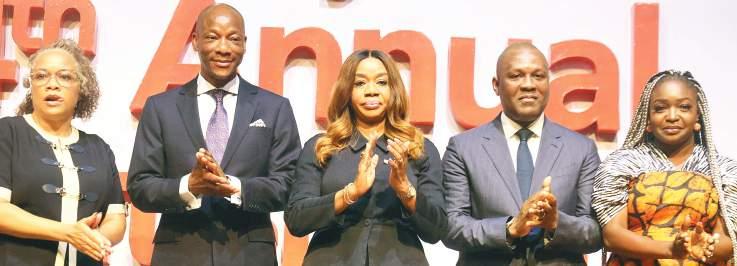
Following the recent Supreme Court ruling on the financial autonomy for Local Government Areas (LGAs), the Federal Ministry of Health and Social Welfare yesterday, said it was pushing an initiative that would enable both entities at the sub-national levels pull resources to sustain operations of the Primary Health Centres (PHCs).
This comes as for the second time in less than a week, Oyo State
Governor, 'Seyi Makinde, yesterday expressed his opinion on the Supreme Court judgment, declaring that his government would not allow people of the State to suffer from the fallout of the judgment. The move by the Federal Ministry of Health and Social Welfare, came just as the Nigeria Governors Forum (NGF) - the umbrella body for all the 36 state governors said it would make its position known on the matter tomorrow.
Speaking at the Inaugural Quarterly Performance Dialogue
with State Commissioners of Health in Abuja, yesterday, Coordinating Minister of Health and Social Welfare, Prof. Mohammed Ali Pate, said the ministry hopes to leverage on an earlier compact agreement signed with the states which ensured that not only federal government but the States are a key part of the National Health System.
He said the National Health Act envisioned a national health system with the federal government leading the States and local governments through the Federal Ministry of
Health and Social Welfare in the drive to provide better healthcare for Nigerians.
Based on the Act, Pate said all State Governors and the Minister of the Federal Capital Territory (FCT) had signed a compact with the federal government on December 12, 2023, to work collaboratively towards improving population health outcomes for all Nigerians.
With the reality of the Supreme Court judgement, Pate said even local governments would be required to join in signing to the collaborative
ndubuisi francis in Abuja
Increasing demand for data transmission, processing and storage for new technologies like Blockchain, Artificial Intelligence (AI), Fifth Generation (5G) mobile networks and Internet of Things (IoT) are worsening greenhouse gas (GHG) emissions globally, the just-released 2024 digital economy report, has revealed.
Although developing countries also bear the brunt of the environmental costs of digitalisation, they are reaping fewer benefits, the report said,
The report, with the theme, "Shaping an Environmentally Sustainable and Inclusive Digital Future", which was anchored by the UN Trade and Development (UNCTAD), formerly known as United Nations Conference on Trade and Development, explained that the information and communications technology (ICT) sector emitted an estimated 0.69 to 1.6 gigatons of CO2 equivalents in 2020, corresponding to 1.5 per cent to 3.2 per cent of global GHG emissions.
It noted that the report underscored the urgent need for environmentally sustainable and inclusive digitalisation strategies.
Stating that digital technology and infrastructure depend heavily on raw materials, the report observed that the production and disposal of more and more devices, along with growing water and energy needs were taking an increasing toll on the planet.
"For example, the production and use of digital devices, data centres and information and communications technology (ICT) networks account for an estimated 6 per cent to 12 per cent of global electricity use.
"Developing countries bear the brunt of the environmental costs of digitalisation while reaping fewer benefits. They export low value-added raw materials and import high value-added devices, along with increasing digital waste.
"Geopolitical tensions over critical minerals, abundant in many of these countries, complicate the challenges,” it said.
The report called for bold action from policymakers across the world, industry leaders and consumers, urging a global shift towards a circular digital economy, focusing on circularity by design through durable products, responsible consumption, reuse and
recycling, and sustainable business models.
According to the report, annual smartphone shipments have more than doubled since 2010, hitting 1.2 billion in 2023, adding that IoT devices are projected to surge 2.5 times from 2023 to 39 billion by 2029.
"New data from 43 countries, representing about three quarters of global GDP, show business e-commerce sales grew nearly 60 per cent from 2016 to 2022, to reach $27 trillion. This growth is taking an increasingly heavy toll on the environment.
"The digital economy is resource intensive. A two-kilogramme computer
requires 800 kilogrammes of raw materials. A smartphone, from production to disposal, requires about 70 kilogrammes.
"While the production phase is the most impactful – generating some 80 per cent of smartphone GHG emissions – environmental harm occurs throughout the lifecycle of devices and ICT infrastructure, including through e-commerce.
"Digital waste is growing faster than collection rates. Waste from screens and small IT equipment rose 30 per cent between 2010 and 2022, reaching 10.5 million tons. Improper disposal leads to pollution and other health and environmental hazards.
In a renewed effort to end the menace of crude oil theft, the Nigerian Navy yesterday said it was set to launch Operation Delta Sanity 11 in the Niger Delta region.
The Commanding Officer, FOB, Ibaka, Capt. Uche Aneke, disclosed this while donating educational materials to Saint Paul’s African Primary School in Mbo Local Government Area of Akwa Ibom State.
Aneke said the Operation Delta Sanity 11 was Chief of Naval Staff, Vice Adm. Emmanuel Ogalla’s strategy toward ending the menace of crude oil theft and flushing out all forms of criminal elements in
the region.
He explained that the donation was part of the efforts to kick-start Operation Delta Sanity 11 and foster civil relationship with host communities.
He further stressed that the donation was also to enlighten on the economic and environmental effects of illegal oil bunkering and smuggling of petroleum products as well as the security consequences on the Nigerian maritime environment.
Aneke said the Civil Military Cooperation (CIMIC) exercise, which involved educational outreach and community services among others, is used to drive the message in a non-kinetic line of operation.
He emphasised that under the current leadership of the Chief of Naval Staff, such community services would be constant and sustained.
The Navy used the visit to deliver a sensitisation lecture to the female pupils of the school on the theme: "The impact of Girl-Child Education on the Community Development With Focus on the Ibaka Community,"
Aneke urged the female pupils to take their academics seriously and observe good hygiene.
“Parents of girls of school age who are out of school within the community are also encouraged to enrol in school for a brighter future,” he said.
initiative.
The Minister explained that, "the initiative aligned with the Health Sector Renewal Investment Initiative and the Sector-Wide Approach that we have adopted.
"It embodies the spirit of cooperative federalism mandated by the National Health Act of 2014, which calls for shared responsibility and collaboration among all health providers across various levels of government, the private sector, and development partners."
According to Pate, the initiative was not just about cooperation; but also about accountability.
“We have agreed to hold each other accountable, learn together and work together through regular performance dialogues and evaluations.
"This is not an inquiry but a collaborative effort to use data to understand what is working, what is not, and where improvements are needed.
“Even if the initial quality of some data is low, the journey of learning and improvement is what matters," he said.
Speaking on the agenda of the performance review meeting Pate said: "We discussed with the commissioners the implication of the Supreme Court judgement on local government autonomy. We clarified that this is an evolutionary process, that before 2011, Nigeria had a very fragmented healthcare system.
“And there was a policy approved by the Council on health on the primary health care under one roof, which accelerated the creation of state primary health care agencies, state health insurance agencies on this federal government working with the states."
The Minister said the National Health Act created a mechanism to the Basic Health Care Provision Fund in 2014, adding that in 2023, process, President Bola Tinubu upscaled that into a sector-wide program to ensure that states are a key part of the National Health System.
He added that local governments by law are also part of National Health System.
"So we are all operating in the context of cooperative federalism where all hands are on the deck and our dividend partners have joined in that we have raised grant resources to provide incentives to the states to contribute their counterparts.
"And with this development, even local governments will be required to step up and will measure each other's performance and Nigerians should be able to tell which state which local government is doing its
part from the federal government," he said.
Pate, said the report from the review meeting showed improvements in some areas, while others showed data quality deficit. Also, most of the stakeholders including reports from various states highlighted challenges in the area of data reporting, human resource deficiency, and immunisation shortfalls.
In his remarks, the NGF Health Advisor, Dr. Ahmad Abdulwahab, said emphasis should be on how to ensure that the country generates quality data to assist in various health sector interventions.
He added while the NGF was encouraging states to constantly carry out quality data assessment, it believes that the best way forward was for the country to ensure data reporting direct from the various health facilities to reduce errors.
On the implications of the Supreme Court ruling reinforcing local government autonomy, Abdulwahab said the Forum has been studying the judgement as it relates to the laws of the land and would make its position known tomorrow.
Meanwhile, Makinde, yesterday declared declaring that his government would not allow the people of the state to suffer from the fallout of the judgment.
He maintained that the judgment has created a constitutional lacuna that would throw up different challenges at the local government level, stating that though he was not opposed to transparency in the councils, the Supreme Court judgment "is not a silver bullet that will wash away Nigeria's problems.”
Makinde, stated this yesterday, during an Advisory/Consultative Committee Meeting comprising stakeholders in the local government system.
He said he convened the meeting of all relevant stakeholders in the local government system so that they would outline the major challenges at the councils and develop solu- tions that would ensure a seamless implementation of the process in a way that would ensure Oyo State’s people do not suffer.
According to the governor, his administration knows and has been doing what was right, including conducting two council elections to ensure caretaker committees don't man the affairs of councils, clearing of backlog of debts owed workers and pensioners at the council level and fixing of infrastructure deficit in the PHCs and the inner roads. Continues online
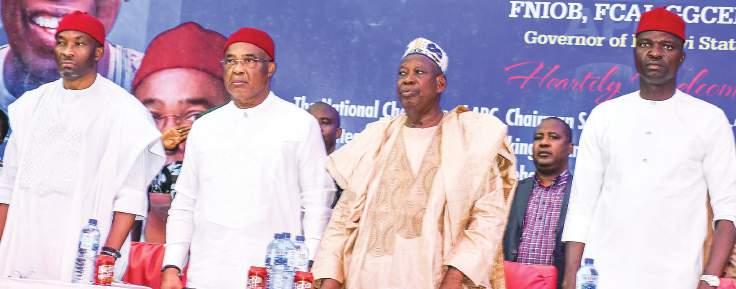
L-R: Deputy Speaker, House of Representatives. Benjamin Kalu; Governor of Imo State/ Chairman, South-East Governors Forum, Senator Hope Uzodimma; National Chairman, All Progressives Congress (APC), Dr. Abdullahi Umar Ganduje and Ebonyi State Governor, Francis Ogbonna Nwifuru, during the APC South East Stakeholders meeting held in Abakaliki Ebonyi State ... weekend
The Labour Party’s (LP) Directorate on Mobilisation and Integration has warned the Nigeria Labour Congress’ (NLC) National Transition Committee (NTC) to stop demarketing the party and Peter Obi, its 2023 presidential candidate.
This was as the Directorate maintained that Julius Abure remains the authentic National Chairman of the LP confirmed by the Independent National Electoral Commission (INEC) and the party’s highest decision-making organ.
The LP Directorate urged the NLC’s NTC to be responsible enough
to respect the reconciliation move initiated by Obi or seek redress if they have any case.
The Directorate was reacting to an unsigned statement purportedly released by the NLC NTC where it had allegedly described Abure as the former National Chairman of LP.
The statement had further directed
party stakeholders to boycott the planned Congress organised by LP in Anambra, Imo, Delta and the Federal Capital Territory (FCT).
But the LP Directorate on Mobilisation and Integration, in a statement yesterday, by its Director General, Marcel Ngogbehei, described the statement by the NTC as childish,
malicious and misleading, noting that the NLC does not have the authority to setup any transition committee for any party in the country.
Ngogbehei, said the action was alien in law, and if true, they should test their constitutionality in court.
The Directorate further stated that the NTC had been notorious for its
Commendations have continued to pour in for OrderPaper Nigeria over the release of its expository work on the significance and impact of the transition of political actors from the legislature to the executive (FLEX) on democracy and public service delivery in the country.
Former minister of education and founder of the School of Politics, Policy and Governance (SPPG), Dr. Obiageli 'Oby' Ezekwesili, issued a signed statement of commendation to OrderPaper, describing the work as a timely and insightful contribution on a unique facet of leadership recruitment.
She noted: “As Nigeria strives for effective governance and democratic consolidation, it is imperative to understand how the recycling of politicians between these branches of government influences and impacts decision-making processes, policy formulation, and overall governance
effectiveness.
“OrderPaper’s FLEX publication offers a comprehensive analysis that gives critical stakeholders in the democratic project detailed insights into the growing trend of incumbent and past legislators assuming executive roles.
“The work underscores the importance of scrutinising such practice and its real and perceived outcomes on governance and democracy in our dear country.”
According to her, “with the growing interest of citizens in governance, FLEX serves as a strident call to action for enhanced performance tracking of recycled politicians and, ultimately, the governments that they serve.
“Its findings have direct implications for our democratic system, urging us to be more vigilant in our political processes.”
While commending OrderPaper
for its “commitment to promoting informed discourse on matters of national importance while executing its mandate to bridge the gap between the people and parliament,” Dr. Ezekwesili said emphatically: “I have no doubt that FLEX significantly contributes to a deeper understanding of Nigeria's political landscape, shedding light on crucial aspects of our governance.
“It underscores the importance of democratic accountability and transparency in our leadership recruitment processes, making it an invaluable resource for policymakers, academics, and the general public.”
In a similar vein, celebrated veteran journalist and versatile media entrepreneur and innovator, Dapo Olorunyomi, highlighted the role of FLEX in supporting democratic accountability in both the legislative and executive arms of government.
He described the work as
excellent and a giant step in the creation of knowledge “to support democratic accountability. This is something that can create a more accountable executive branch if the important work of percolating the legislative branch of the ethos of democratic accountability endures and succeeds.”
On his part, Dr. Chido Onumah, Coordinator of the African Centre for Media & Information Literacy (AFRICMIL), stated that the publication is uniquely and timely in emphasising the need for a national dialogue on the implications of the transition of politicians between the two branches of government.
In his statement, Professor Adebayo Olukoshi, governance expert and distinguished professor at the Wits School of Governance, Wits University, South Africa, commended OrderPaper's dedication to advancing democratic governance
The Edo State Governor, Mr. Godwin Obaseki, has approved the disengagement of the Commissioner for Health, Dr. Samuel Alli, with immediate effect.
In a statement, the Secretary to the State Government, Osarodion Ogie, also announced the appointment of Dr. Roland Igbinoba as Special Adviser to the Governor on Special Projects.
“The Edo State Governor, Mr. Godwin Obaseki, has approved the disengagement of the Commissioner for Health, Dr. Samuel Alli, with immediate effect. He is to hand over all government documents and resources in his possession to the most senior civil servant within the Ministry of Health.
“The government thanks him for his service and wishes him well in his future endeavours,” he stated.
Ogie added: “The governor is resolute on his finishing strong objective and will remove any obstacles that may hinder optimal service delivery to the people in the remaining four months of his administration.
“The governor has also approved the appointment of Dr. Roland Igbinoba as Special Adviser to the Governor on Special Projects, who will support the government in fast-tracking the conclusion of developmental projects across the State.”
Meanwhile, the Edo State Government has ranked first, beating 34
other Nigerian States and tying with Anambra State on BudgIT’s 2024 Q1 fiscal transparency league table.
BudgIT said the assessment, which is available on its website, “focused on the availability and comprehensiveness of key fiscal documents, the functionality of state websites and e-procurement portals, and the timeliness of publications.”
It noted that in Q1 2024, the fiscal transparency across Nigerian States varied significantly, impacting their rankings on the States’ Fiscal Transparency League (SFTL) table.
The ranking had Edo and Anambra leading the pack with a 93 per cent score out of 100 per cent Ekiti (92 per cent), Jigawa (92 per cent), and Ebonyi (87 per cent)
completing the top five. At the bottom were Benue (42 per cent), Kebbi (42 per cent), Bayelsa (40 per cent), Borno (32 per cent) and Imo (31 per cent) in descending order.
On Edo State’s performance, BudgIT said: “Having a tie and sharing similar strengths with Anambra, it needed a better arrangement of documents on their website.”
The key indicators for the ranking are the Medium-Term Expenditure Project (MTEF), Proposed Budget, Approved Budget, Citizens’ Budget, Budget Implementation Reports, Audit Reports, Accountant General’s Report/Financial Statement, e-procurement Portal, and State’s website with fiscal repository.
through informed analysis, noting that the work “can be used as a tracking tool for performance and accountability in governance.”
FLEX is OrderPaper’s latest Quarterly Policy Review (QPR) which examines the dynamics of Nigeria’s leadership recruitment pipeline and implications for governance.
The work underscores that President Bola Tinubu's administration has engaged the FLEX phenomenon in an unprecedented fashion by appointing the largest number of ex-legislators into his government in the history of civilian rule in Nigeria.
divisive nature and urged Nigerians and supporters of the Labour Party to ignore their antics.
He further urged LP stakeholders not to be distracted by the ill attitude of the NTC and ensure that they fully attend the upcoming party congresses as announced by the Abure-led National Working Committee (NWC).
The LP also accused the NLC NTC of working with the government to demarket, weaken and prevent opposition parties like LP from holding the government accountable.
“NTC has become a destructive agent seemingly working for the government to eliminate any perceived opposition structures in the country; the citizens are groaning under government policies that has left the Nigerian workers poorer; rather than the current NLC to learn from the Oshiomole years of courageous leadership and engage the government to protect the interests of Nigerian workers and the citizens at large.
"They are busy meddling into political party affairs, attempting to demarket the only true opposition party in the country,” the statement said.
Michael Olugbode in Abuja
The Nigeria Security and Civil Defence Corps (NSCDC) Commandant General's Special Intelligence Squad (CG-SIS) has arrested three suspects for vandalism of pipeline, oil theft and illegal dealing in petroleum products at Umuodo and Umuajuloke communities in Omuma, Rivers State.
The CG's SIS Commander, Apollo Dandaura, during a briefing yesterday said the arrest was made possible through sustained intelligence that an illegal oil refinery was cited at the crime scene.
He said that this made his command to sweep the area, leading to the discovery of a large quantity of illegally refined petroleum products suspected to be Automotive Gas Oil (AGO) or diesel. He said: “Based on credible intelligence, we swung into action and arrested three suspects at the crime scene with large quantities of illegally refined AGO already stored inside metallic drums while others
were inside cellophane bags."
He disclosed the names of the arrested suspects as: Happiness Nwankwo, 45 years who claimed to be an indigene of Omuma in Rivers State, Nnoma Nwankwo, 30 years also from Rivers State and Favour Amadi from Omuma in the same Rivers State.
The commander said: “Some exhibits recovered at the point of arrest were numerous drum ovens containing stolen and syphoned crude oil undergoing processing, industrial hoses used to tap into well-heads to syphon crude oil, large quantities of stolen crude oil stored inside cellophane bags and kegs, many metal and plastic buckets, wheelbarrows, shovels and galvanised metal pipes".
The CG-SIS commander hinted that investigations had commenced to unravel the involvement of the three suspects and who their sponsors are. He said that at the expiration of a thorough investigation, whoever is found culpable would have their time in court.
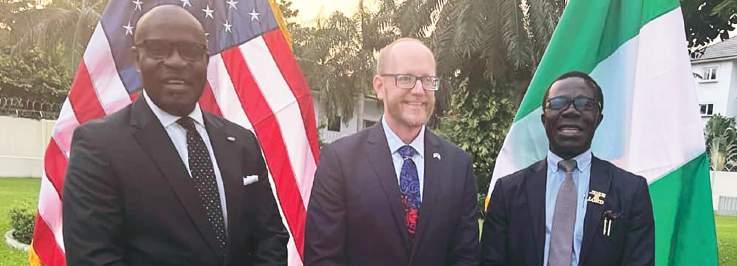
L-R: General Manager, Marketing and Corporate Communications, Coscharis Group, Mr. Abiona Babarinde; United States of America Consul General to Nigeria, Mr. William Stevens; and President/CEO, Coscharis Group, Dr. Cosmas Maduka, at the 248th Anniversary of USA Independence held at the residence of the United States Consulate General to Nigeria in Lagos, supported by Coscharis/Ford... recently
James sowole in Abeokuta and Adedayo Akinwale in Abuja
Leader of Afenifere, a pan-Yoruba socio-political group, Chief Reuben Fasoranti, has celebrated the Nobel Laureate, Professor Wole Soyinka, on his 90th birthday, describing him as a facilitator of noble causes.
Similarly, Ogun State Governor, Dapo Abiodun, awarded scholarships to nine students, who performed creditably well in an essay competition to mark Soyinka’s 90th birthday.
Fasoranti, in a statement by National Publicity Secretary of Afenifere, Jare Ajayi, said Soyinka, in his activities and carriage, exuded the characteristics of a catalyst that made things happen.
The statement read, “In Soyinka’s case, what he precipitates are things that would ennoble the people and positively project humanity further.
“Pa Fasoranti recounted numerous occasions when the literary scholar has interrogated the prevailing systems in the interest of the public.
“The actions of Professor Wole Soyinka in and outside the academics are always geared towards enhancing humanity. This, he always did by way of calling the attention of those concerned to relevant issues.
“He was never shy of physically taking the lead – or be part of those who lead – in progressive agitations.”
According to the statement, Fasoranti also said, “With these and some of his accomplishments, he is certainly one of those who are
regarded in the pantheon as 'Eni ti Ori sa da' – the Special Breed!”
Meanwhile, speaking at the 2024 edition of the Wole Soyinka International Cultural Exchange Programme held at Soyinka's ARI residence, Ijegba, Abeokuta, yesterday, Abiodun said the lucky students would also be given a laptop each for their efforts.
Abiodun emphasised that the gesture was to encourage the beneficiaries to keep writing as well as motivate other students to participate in the next edition
of the competition. Describing the Noble Laureate as the most celebrated black African, who had excelled in his chosen career, Abiodun stated that as the key to change and prosperity in
Nigeria and around the world, it was imperative to engage the youth and ensure that their thinking and goals were oriented towards progress for the motherland and humanity.
emmanuel Ugwu-nwogo in Umuahia
Abia State would partner the federal government for the reconstruction of the Ikwuano-Ikot-Ekpene federal road that links Abia and Akwa Ibom States.
Akpabio's loyalists want chief whip punished Senate spokesperson says he won't be sacked Lawan clears air on controversial comments
There is tension in the Senate as some northern senators have allegedly moved against the Chief Whip, Senator Ali Ndume, over his recent comments on the current hardship being faced by Nigerians.
Ndume had during an interview with journalists alleged that President Bola Tinubu had been caged and was not aware of the acute hunger being experienced in the country.
Also during a debate on high cost of food items caused by middle men in the distribution chain, on the floor of the Senate, last week, former Senate president, Ahmad Lawan, also alleged that the entire food reserve in the country was empty.
The development, according to sources in the red chamber, did not go down well with some senators, who felt both Ndume and Lawan, portrayed Tinubu and his administration in bad light.
However, strong indications emerged yesterday that there was grand plot to punish Ndume and Lawan just the way their colleague, Senator Abdul Ningi, was treated some months ago.
The Borno South lawmaker is a principal officer of the 10th upper legislative chamber, so those moving against him believed he should have been more careful.
A source among the aggrieved senators, who was not happy with the Anti-Tinubu comments from
Ndume, said yesterday they were planning a motion to punish the Borno South lawmaker
They were said to be putting pressures on the President of the Senate, Godswill Akpabio in a serious dilemma, urging him to move against Ndume.
Another source however said the forces against Ndume actually wanted him suspended.
Ndume was the Director-General of the Stability Group which ensured the victory Akpabio as President of the Senate in June 2023.
The development is causing serious tension as the move against Ndume could polarise the Stability Group and ultimately affect Akpabio's Senate presidency.
A source among the senators said, "Two pronged punishments are being considered."
He said, First, Akpabio would be told to orchestrate his removal as Senate Chief Whip and Senate Committee so that Ndume would be removed as vice chairman of the Committee on Appropriation."
However, it has been gathered that northern senators have warned against another plan to destabilise their caucus, barely a few months after Ningi was suspended.
One of the senators said, "Ndume didn’t criticise Tinubu, but only raised an alarm that he was being prevented from meeting with people who may tell the president the realities on ground."
Spokesperson for the Senate, Adeyemi Adaramodu, told journalists that the alleged planned plot against Ndume, existed in the imagination of some people.
" No one is planning to either remove Ndume as Chief Whip or suspend him just because he expressed his personal opinion.
"Senators from the majority caucus which cut across the six geopolitical zones endorsed his emergence as a principal officer, hence no group of senators could remove him just like that.
"There is no tension in the Senate. We are one and we are playing the roles expected of us as representatives of the people," he said.
Meanwhile, a non-political group, Concerned Northern Forum (CNF), has thrown its weight behind Ndume, through a statement by its the coordinator, Mallam Abdulkadir Kura.
CNF noted that it had no linkage with Ndume, as it is non-political, but it would always stand for any northerner who has courage in defending the masses, as enshrined in the constitution of the group.
Also, yesterday, Lawan, "strongly condemned and categorically denied a false and malicious report about the hunger and unbearable hardships in the country." Lawan, in a statement, said, "It is not only untrue but also deeply insensitive and divisive."
The former Senate president, in the statement, by his media aide, Ezrel
Tabiowo, said "the false report is a deliberate attempt to sow seeds of disunity amongst Nigerians.
"It is a clear fabrication designed by mischief makers to incite ethnic tensions and create political instability," he added
Chairman, Senate Service, Senator Sunday Karimi, had issued a statement on Saturday, to caution Ndume, to refrain from making derogatory statements against the President Tinubu's Government.
He likened Ndume's behaviour "to that of a loose cannon and emphasising the need for constructive dialogue and criticism in governance."
The Abia State Government would also join hands with the FG to realise the state airport project, which has been listed among the major projects to be executed by the present government.
Governor Alex Otti announced the planned partnership at the weekend while addressing the congregation at the church service of Christ Embassy along Library Avenue, Umuahia.
A government house press release issued on Monday by the chief press secretary, Ukoha Njoku Ukoha, said that Otti had worshipped at Christ Embassy on Sunday during an unscheduled visit to the church
"Just like we are partnering with the federal government on the airport project which will be advertised very soon, we are also partnering with the federal government on the Ikwuano Road - all the way to Akwa-Ibom, and I can assure you that very soon work will start there," the governor said.
Otti, who has developed the habit of worshipping with different churches each Sunday, explained said that his administration recognises the body of Christ as one, adding that all the church denominations united in supporting him.
His words: “This is an opportunity to thank you all for the support that you gave before the election, during the election and after the election. And, the body of Christ was united in saying enough is enough."
“So, we don’t discriminate because the body of Christ is one. You may have your different churches that you attend. That’s why you will see me in the Catholic Church, Methodist Church, Anglican and today I’m in Christ Embassy."
Otti said that it was important for him to thank the Church given the support he continues to receive from the body of Christ and also very important to thank God because it is God who made his emergence as governor possible.
In his sermon, Presiding Pastor Chika Alex, described Abia as a blessed state that was neglected and poorly governed for a very long period by past leaders who preferred to work for themselves instead of working for the people.
ikechukwu Aleke in Abuja
The Inspector General of Police, Kayode Egbetokun, has ordered an immediate suspension of the proposed enforcement of the e-CMR initially scheduled to commence on the 29th of July, 2024.
Egbetokun also noted that the suspension of the proposed implantation was to give ample opportunity for mass enlightenment and education of all citizens and residents on the process, benefits and effectiveness in solving the challenge of vehicle related crimes, and protection of individual and corporate vehicle ownership.
In a statement by Force Spokesperson, Olumuyiwa Adejobi, on behalf of the IGP, he urged the public to obtain the digitalised CMR certificate online.
"In light of this, we seek the understanding and support of all well-meaning Nigerians and residents to key into the e-CMR system. In the same vein, the IGP charges all Police officers to desist from requesting for e-CMR certificates as individuals found extorting or exploiting members of the public on the guise of not having e-CMR certificates will be sanctioned accordingly as the enforcement which will be done by only dedicated officers
has been suspended till further notice," Egbetokun said. He further explained that the police deemed it necessary to highlight the benefits and effectiveness of the e-CMR initiative, which was designed to ensure the safety and security of all types of vehicles, including motorcycles by collating data imputed into the system by vehicle owners and acting on such to flag the vehicles if reported stolen.
The police boss said the e-CMR would provide a firsthand database to the Force for curbing vehicular crimes as dedicated officers can access real-time comprehensive data of every vehicle on their tablets.
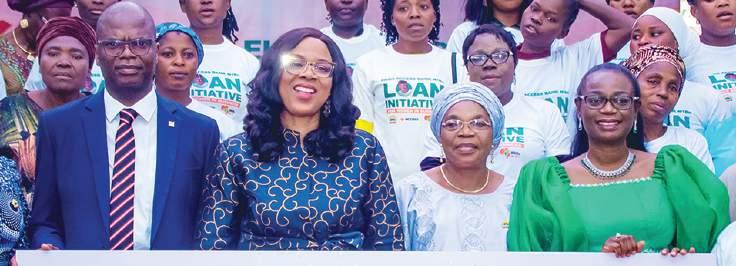
L-R: Regional Sales Director, Branch
Trade, Industry, Investment and Cooperatives, Ekiti
Blessing Ibunge in Port Harcourt
Members of the Rivers State House of Assembly, loyal to Minister of Federal Capital Territory (FCT),
Nyesom Wike, have written to Governor Siminalaye Fubara, and threatened to shut down further expenditure from the Consolidated Revenue Fund of the state.
The Independent National Electoral Commission (INEC) has accredited 134 election observers for the forthcoming governorship elections in Edo and Ondo States.
INEC National Commissioner and Chairman, Information and Voter Education Committee, Sam Olumekun, in a statement, yesterday, said of the 134 observers, 124 were domestic, while 10 were international.
He said, “In continuation of preparations for the 2024 Edo and Ondo State Governorship elections, the Commission was pleased to provide an update on the accreditation of observers for the elections.
“A total of 153 applications were received from interested organisations. After a review as provided
by our regulations and guidelines, 134 groups (124 domestic and 10 international) met the requirements for accreditation.
“The classification of the organisations shows that 28 are gender-based, three representing Persons with Disability, eight are faith-based, 10 foreign and over 100 others working in areas relevant to the functions of INEC, most of them with previous experience of election observation.”
The commission stressed that the next step was for the accredited organisations to upload the personal details and photographs of their field observers to its dedicated portal established for that purpose.
To this end, the Commission said it would be organising a one-day training for representatives of observer groups on Wednesday 17th July 2024 at the Commission's Conference Room in Abuja at 10.00am.
A DA or A Umeoj I H I g H l I g HTS Zen
She also expressed gratitude to the board for their vision and insight, the staff for their unwavering dedication, and the bank’s customers for choosing Zenith as their preferred bank. World Finance is a leading international magazine providing comprehensive coverage and analysis of the financial industry, international business, and the global economy.
In its audited results for the year ended December 31, 2023, Zenith Bank achieved a remarkable triple-digit growth of 125 per cent in gross earnings, from N945.6 billion reported in 2022 to N2.132 trillion in 2023. The impressive growth in gross earnings resulted in a yearon-year increase of 180 per cent in profit before tax (PBT), from N284.7 billion in 2022 to N796 billion in 2023, while profit after tax (PAT) also recorded triple-digit growth of 202 per cent, from N223.9 billion to N676.9 billion for the period ended December 31, 2023. The increase in gross earnings was primarily due to growth in interest and non-interest income. Specifically, its interest income increased by 112 per cent, from N540 billion in 2022 to N1.1 trillion in 2023, while
non-interest income grew by 141 per cent, from N381 billion to N918.9 billion in the same period. The rise in interest income was attributed to the growth in the size of risk assets and their effective repricing, alongside the increase in yield of other interest-bearing instruments over the year. Growth in non-interest income was driven by significant trading gains and an increase in gains from the revaluation of foreign currencies.
Zenith Bank’s cost of funds also grew from 1.9 per cent in 2022 to three per cent in 2023 due to the high interest rate environment, while interest expense increased by 135 per cent, from N173.5 billion in 2022 to N408.5 billion in 2023. Notwithstanding the 32 per cent growth in operating expenses in 2023, the Group’s cost-to-income ratio improved significantly from 54.4 per cent in 2022 to 36.1 per cent in 2023 due to improved top-line performance. Return on Average Equity (ROAE) increased by 118 per cent, from 16.8 per cent in 2022 to 36.6 per cent in 2023, underpinned by improved gross earnings, as the Group sought to deliver better shareholder returns.
The resolution was reached yesterday at a plenary led by factional Speaker, Martin Amaewhule.
House Leader, Major Jack, had during the sitting drawn the attention of the Assembly to the combined provisions of Sections 121 and 122 of the Constitution of the Federal Republic of Nigeria. Jack alleged, "Governor Fubara has flagrantly continued to violate the constitution by spending from the consolidated Revenue Fund of the state without an appropriation law."
They expressed their support for a shutdown of expenditure from the Consolidated Revenue Fund of the state forthwith.
Debating the statement, the lawmakers condemned the governor's alleged "wanton disregard” for the constitution, “despite repeated reminders of the consequences of his actions".
Amaewhule, in his reaction, stated, "It is unfortunate that Governor Fubara now sees violation of the provisions of the constitution and judgements of courts as a way of governance."
He added that as representatives of the people, "The house would not look the other way while the governor consistently trample on the constitution he swore to uphold."
The lawmakers, therefore, resolved to write to the governor, intimating him of the shutdown of all expenditures from the Consolidated Revenue Fund of the state.
Adedayo Akinwale in Abuja
Speaker of the House of Representatives, Hon. Tajudeen Abbas, has revealed that the 10th House would amend its Standing Orders to accommodate e-petitions to facilitate the use of Information and Communication Technology (ICT) in receiving and processing public petitions.
He explained that by integrating ICT, the House aimed at ensuring that every voice could be heard and considered promptly, thus reinforcing dedication to a responsive and accountable governance system that truly serves the interests of the
Return on Average Assets (ROAA) also grew by 95 per cent, from 2.1 per cent to 4.1 per cent in the same period.
Zenith Bank was established in May 1990 and commenced operations in July of the same year as a commercial bank. The bank became a public limited company on June 17, 2004, and was listed on the Nigerian Stock Exchange (NSE) on October 21, 2004, following a highly successful Initial Public Offering (IPO). In 2013, the bank listed $850 million worth of its shares at $6.80 each on the London Stock Exchange (LSE). Headquartered in Lagos, Nigeria, Zenith Bank Plc has more than 400 branches and business offices in prime commercial centres across all states of the federation and the Federal Capital Territory (FCT).
Zenith Bank Plc, founded by Jim Ovia, CFR, in 1990, has since grown to become one of the leading financial institutions in Africa. The underlying philosophy is for the bank to remain a customer-centric institution with a clear understanding of its market and environment. Zenith Bank’s track record of excellent performance has continued to earn the brand numerous awards. These latest accolades
Nigerian people.
Abbas was of the opinion that this transformative step would enable more efficient, transparent, and accessible petition procedures, allowing citizens to engage with the legislative process more effectively.
The Speaker made this known yesterday in Abuja at the opening of the newly Digitalised Hearing Room of the Public Accounts Committee (PAC).
He commended the Chairman of PAC, Hon. Bamidele Salam and his members for their relentless dedication to delivering on the mandate of the committee as constitutionally provided.
follow several recognitions, including being recognised as the Number One Bank in Nigeria by Tier-1 Capital for the 14th consecutive year in the 2023 Top 1000 World Banks Ranking, published by The Banker Magazine; Bank of the Year (Nigeria) in The Banker’s Bank of the Year Awards for 2020 and 2022; and Most Sustainable Bank, Nigeria, in the International Banker 2024 Banking Awards, among several others.
Zenith Bank Plc has blazed the trail in digital banking in Nigeria, achieving several firsts in the deployment of Information and Communication Technology (ICT) infrastructure to create innovative products that meet the needs of its customers. The bank is a leader in the deployment of various channels of banking technology, and the Zenith brand has become synonymous with state-of-the-art technologies in banking. Driven by a culture of excellence and strict adherence to global best practices, the bank has combined vision, skilful banking expertise, and cutting-edge technology to create products and services that anticipate and meet customers’ expectations, enable businesses to thrive, and grow wealth for customers.
The Speaker said to further improve the effectiveness of PAC, the committee has gone a step further to introduce additional legislative tools and mechanisms that strengthen good governance and improve openness and ac-
countability. “The Nigerian House of Representatives is deeply committed to this goal, recognising that leveraging technology is crucial for fostering good governance and inclusive participation,” he said.
Delta LG Polls: A Complete Sham, Falls Short of Democratic
Standards, Says Senator Dafinone
Sylvester Idowu in Warri
The senator representing Delta Central Senatorial District, Senator Ede Dafinone, has described last Saturday's local government elections in Delta State as a "complete sham and a mockery of democratic ideals and standard".
Senator Dafinone spoke on the growing concern across the country on how the sitting state governors use the State Independent Electoral Commission (SIEC) to undermine the growth and development of the electoral system at the local government level.
The Delta Central lawmaker, in a statement issued over the weekend, while reacting to the outcome of the council polls held in the state said that it was very unfortunate that people at the grassroot level were prevented from participating in "our democratic process" by the state governors to freely elect their councillors and council chairmen.
Senator Dafinone, while applauding President Bola Ahmed Tinubu for supporting the financial autonomy for the local governments across the country with the recent Supreme Court landmark judgement, noted that Nigerians of goodwill must collectively work to amend the relevant sections of the constitution to rescue the local government system from
the iron-fist of the state governors.
He noted that the main opposition in the state, the All Progressives Congress (APC) sensed that the electoral umpire, Delta State Independent Electoral Commission (DSIEC) was not going to conduct a credible elections as predicted, hence most of their party candidates withdrew from the polls.
"It is very unfortunate and sad how low our people can go to acquire power. It is even more troubling that after 25 years in our democratic experiment we can't conduct what looks like an election at local government level.
"What took place in Delta State on Saturday to all intent and purpose can't be classified as an election. It is a complete sham and an affront on all known democratic ideals", he said.
Senator Dafinone observed that the state electoral umpire, most probably acting on the instructions of the state governor, " just allotted figures to candidates who took part in the shambolic process. It can at best be described as a mere coronation of all PDP nominated candidates.
"As predicted by political watchers that the Delta State PDP-led government is incapable of conducting free, fair and credible elections, DISEC proved all of us right.
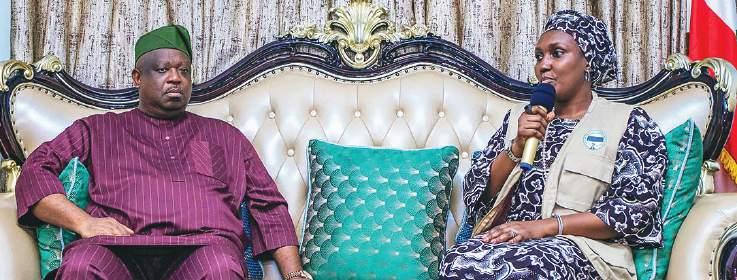
On-the-spOt assessment Of site Of cOllapsed schOOl building...
L-R: Plateau State Governor, Mr Caleb Mutfwang, and Director General National Emergency Management Agency (NEMA), Mrs. Zubaida Umar, during an on-the-spot assessment of the site of the collapsed school building and condolence visit to the governor over the incident in Jos, Plateau State...last Sunday
ahmad sorondinki in Kano
A Kano High Court presided over by Justice Amina Aliyu, has perpetually restrained the 15th Emir of Kano, Aminu Ado Bayero, and four others from parading themselves as Emirs.
In her judgement yesterday, Amina held that Bayero and the four others, by themselves, servants, privies and any other
persons appointed by them should stop parading themselves as emirs of Kano, Bichi, Gaya, Rano and Karaye.
The judge stated, "The Kano State House of Assembly has the power to amend and propose a bill for the peace and good governance of a state pursuant to Section 4 Rule 6,7(b) of 1999 Constitution, as amended.
"The Kano State Governor has
the right to ascent the proposed bill to law after being passed by the state assembly."
The court also ordered the deposed emirs to surrender all movable and immovable properties in their possession that belonged to the Kano State Emirate Council to the state government.
On the withdrawal of the legal counsel to the first respondent without notice to other parties,
Amina held that it was done unprofessionally and without moving their motion, it was as good as not filing it since it had been abandoned.
Earlier, counsel to the applicant, Ibrahim Isa-Wangida, urged the court to discountenance the respondent affidavit of facts pursuant to order 39 rule 1 and 2 of the court.
But counsel to Ado-Bayero, Abdul Muhammed, SAN, informed
the court that they had an affidavit of fact dated July 3, 2024 attached with a notice of appeal and a motion of stay of proceedings.
He urged the court to stay proceedings pending the hearing and determination of the motion at the appeal court. Kano State Government had filed a case asking the State High to stop the 15th Emir and four others from parading themselves as emirs.
N I ger IA ' S e co N om Y W I ll r ecover Soo N , NNP cl , c BN, mINIST er A SS ure N I ger IANS administration, things will change. It will be gradual.
"I believe that Nigerians will persevere. This is the only time we can all come together as Nigerians to give His Excellency, the president, all the needed support, in order to get us out of all the trouble we have been.
"The indicators are showing that the economy is doing well. The only thing is that things are a bit difficult because it's not easy for an inflation that has gone up to go down like that. It takes time."
The federal lawmakers and their guests entered into a closed session after the initial opening remarks. The session was still ongoing as of the time of filing this report by 8pm yesterday.
On the distribution of 740 lorry loads of rice to the 36 states of the federation and Abuja, Idris explained that the food supply was part of Tinubu's interventions for Nigerians aimed at alleviating the food crisis.
Idris appealed to governors to ensure effective distribution of the food supply to the most vulnerable in the society.
He explained further that each state, including the FCT, took delivery of 20 trucks containing 1,200 bags of 25 kilogrammes of rice.
The minister said the president had directed the Minister of Agriculture to ensure that food was made available to Nigerians.
He explained that the distribution of trucks of rice was also to ensure that the hardship in the country was ameliorated, adding that it is expected that the governors would distribute the trucks of rice to the most vulnerable.
Idris stated, “Now, the council deliberated on the state of affairs in Nigeria, especially the issue of food supply and shortage of food on the tables of many Nigerians, and after exhaustive deliberation, the Minister of Agriculture had earlier been directed
to ensure that food is being made available to Nigerians.
“The understanding is that about 20 trucks of rice has already been supplied to each of the states of the federation, including the Federal Capital Territory. Each of the trucks is carrying about 1,200 bags of kg rice.
“This is part of the measures that government is taking, in addition to so many others, to ensure that the hardship being experienced by Nigerians is drastically ameliorated.
“So for recap, each of the state governments has received 20 trucks of rice for onward distribution to the most vulnerable. This is a first step and the federal government will continue to support all the sub-nationals, so that the hardship being experienced by most Nigerians, in terms of shortage of food supply, is breached.
“It is expected that the governors will go ahead to distribute this food item to the most vulnerable so that the hardship, like I said, being experienced will be brought down significantly.”
Commenting on the issue of Compressed Natural Gas (CNG), the minister said the matter was discussed at the FEC meeting based on the promise made by the federal government to Nigerians.
According to him, "The Federal Executive Council has directed the presidential committee on CNG to expedite its activities to supply buses, to also make it possible for the conversion kits to be available to most Nigerians.
“Already they have started, but the Federal Executive Council asked them to redouble their effort, so that conversion kits that we need for the CNG to populate with is made available.
“Also the conversion centres that had earlier been approved will also be significantly upgraded so that Nigerians will have more conversion centres, more conversion kits.
“The compliance level of CNG, the federal government has directed this should go up, so as to reduce our over reliance on PMS. And this will in turn also aid our energy transition
from fossil fuel to renewable energy.”
He added, “Now, in all, the Federal Executive Council took note of some of the complaints among Nigerians, some of the issues raised in terms of transportation, in terms of food prices or food shortages in many homes around the country, and the Federal Executive Council is ramping up all that needs to be done to ensure that food is being put on the table of most Nigerians.
“So what government is doing now is just a necessary first step to ensure that supplies are made available to Nigerians through the governors. I have told you earlier that 20 trucks of rice already have reached the state governors. All the governors have already taken delivery of that.
“And the government will continue to work to ensure that food intervention is made available. This, of course, is an addition to the effort that government is making in terms of fertiliser supply, which is already also being processed. Most of the governors will also have support.”
Idris said, “Recall that the Central Bank of Nigeria had earlier made available over 2.1 million bags of assorted fertiliser to the Ministry of Agriculture for onward distribution to the states. So that is also in progress.
“The federal government will do everything they can to ensure that we have more food for our people.
Investments in the agricultural sector is ramped up and you also know that the Federal Ministry of Livestock Development that was announced by Mr. President, also takes off very soon.
“So these are some of the measures and some of the discussions that we had at the Federal Executive Council meeting today. We hope that council meeting also continues next week.”
FEC also mandated the Minister of Budget and Economic Planning to come up with an amendment bill to the 2024 Budget to be presented to the National Assembly for legislation.
The planned amendment to the national budget became necessary as a result of new fiscal developments,
including the impending new national minimum wage, he said.
According to the minister, Tinubu is expected to hold a follow-up meeting with leaders of organised labour this Thursday after which the proposed amendment bill to the budget would be passed on to the National Assembly for consideration.
The president had last Thursday met with the leadership of the organised labour over the minimum wage issue. While the government team and the organised private sector offered N62,000, organised labour made a demand of N250,000.
Idris explained, “Now, you are also aware that last week, the Nigerian Labour Congress met with Mr. President. This was part of the consultations that the president was doing. Recall that he had met the organised private sector.
“He had also met the sub-nationals after the tripartite committee on labour submitted its report, in order to ensure that there is a thorough analysis of the situation. So the government will come up with a minimum wage that works for all Nigerians, the federal government, the sub-nationals and organised private sector. That was also discussed today.
“Government has also directed the Ministry of Budget to also come up with additional support for the 2024 Budget so that any differential or any gaps that will exist in terms of what existed before the 2024 budget was approved and the supplementary budget and also what the requirement is for now.
“So government is working round the clock to ensure that it comes up with a minimum wage that works for all Nigerians at the end of the day. This, of course, will be submitted to the National Assembly so that it can have legislative backing.”
The minister said Tinubu was open to meeting NLC, the Trade Union Congress (TUC).
“We expect that meeting to hold this coming Thursday. Recall that this was already what the labour unions requested during their meeting with
Mr. President last week,” Idris stated. He said Tinubu was aware that organised labour wanted to quickly finalise the minimum wage issue and “government is also anxious to put the issue of minimum wage behind it”.
Idris stated, “So it is expecting that the Nigerian Labour Congress, Trade Union Congress and all their affiliates, as requested by them last week, will meet the president on Thursday and after which the president will now transmit whatever the final agreements or what his views are on the tripartite committee’s report to the National Assembly for legislation.”
Asked to shed more light on the proposed bill to be sent to the National Assembly with regard to the budget, he said, “There has been talks about, some people are saying there's multiple budgets and all that.
“It is not the case and that is why the Minister of Budget has been asked to submit this additional information to the National Assembly to make it take an informed position on most of these.
"An amendment (act) to be sent to the National Assembly. Of course it is the tradition of the executive to allow the National Assembly to unveil some of these things and that is why we don't want to go into further details.
“I'm sure the National Assembly, once it gets budget, they will do that. The executive is always respectful of the tradition of the National Assembly in terms of their protocol.”
On possible figures for the proposed new national minimum wage, Idris said there was no discussion around figures, explaining that the issues guiding the discussion were around the fact that whatever came out as the final figures would have to be considerate of other salary paying entities, which informed the president’s ongoing consultations.
He said, “I think it is the general parameters and the general principle of the minimum wage itself and like we have said here, the federal government is not in opposition to wage increase. The president and
The government also gave the deposed emir's 48 hours to vacate their respective palaces after their removal.
Governor Abba Yusuf had signed into law the Kano Emirate Council Bill (2024), after repealing the Kano Emirate Law (2019), which created four additional emirates of Bichi, Gaya, Karaye and Rano, bringing to five the emirates in the state.
the Federal Executive Council and the federal government are not in opposition to the concept of wage increase.
“The issue has been a wage increase that we can defend, meaning a wage increase that will not lead to inflation, a wage increase that not just the federal government, but the sub-nationals and the organised private sector, are able to pay and something that is also sustainable.
“Recall that the president also mentioned last week that because of the fact that he is not in opposition to the issue of wage increase, he has even asked that instead of waiting for a whole five years before wages are reviewed, he has mooted the idea that we can actually look at these wages between two to three years so that if there are gaps, we don't have to wait for five years for those gaps to be closed.
“So the discussion was not around the figure itself, it’s about the general parameters and the general principle of the wage increase itself, which the government fully supports, but federal government will have to do something that not only it can carry, the sub-nationals and the organised private sector will also be able to go along with.
“Recall that I've said it here that the issue of national minimum wage is not just that of the federal government; it is for the federal government, for the sub-nationals and for the organised private sector. Therefore, every decision to be taken by the president will have to also take note of the sensibilities of the other parts that I talked about.
“So, yes, there will be wage increase because there is already a proposal before the president, there is already a report before the president. The president is deepening his consultation and it is in that spirit that he met with the organised Labour last week.
“And also, as they requested, he will also meet with them on Thursday this week to finalise their thoughts and then he will make his informed position known to Nigerians by also sending this to the National Assembly.”

Comptroller of Immigration in charge of Illela Border Command, Sokoto, Tony Akuneme(left) and his Katsina State Command counterpart, Mohammed Mahmoud Adamu, at the passing out parade of the 49th Cadet Course in Kano...recently
Omon-Julius Onabu in asaba
Governor Sheriff Oborevwori of Delta State has said that the recent Supreme Court judgement granting broad autonomy to the 774 local government councils in the country, has lifted a huge financial burden off the shoulders of the state government.
Oborevwori stated this during the swearing in of the new executive chairmen and their respective vice-chairmen of the
25 local government areas of the state yesterday in Asaba.
The governor noted that the state government has, over the years, had to take on the extra responsibility of helping the local government councils meet their financial demands by augmenting their salaries and pensions.
He assured the new council chairmen that the three months allocations for the local government areas from the Federation Account were
Blessing Ibunge in Port Harcourt
Members of the House of Representatives Committee on Reformatory Institutions, led by its Chairman, Hon. Chinedu Ogah, have expressed delight over the low crime rate presently recorded in Rivers state. The House Committee members made the observation yesterday, during a courtesy visit to Government House in Port Harcourt.
In his speech, Ogah, explained that they were in Rivers State to oversight all the Correctional Institutions domiciled in the State. He noted the gross neglect that the Correctional Service has suffered in the country, particularly in the aspect of security.
He listed four Correctional Service centres in Rivers State to include Port Harcourt, Ahoada,
Degema and the Farm Settlement; with each housing about 4,000 inmates, adding that 91 per cent of such inmates are awaiting trial. Ogah said: “And most of these people are not yet convicted, and some of them are not being justified, what the case is all about. And the major issue, the negligence aspect of the security, is that they don’t care how to reintegrate, reform, bring them back into the society so they cannot indulge in crime.
“If we really look into it, we find out that, that is the only way we can ensure the security of lives and property in this country, by making sure that those we feel have already committed crimes are reformed and reintegrated into the society by giving them skills and opportunity so that they can have something to feed, and not go back to crime.
Emerging Africa Asset Management Limited (EAAML), the fund/ portfolio management subsidiary of Emerging Africa Group, has launched a N1 billion Halal Fund in compliance with Sharia law. Halal mutual funds are managed by professionals knowledgeable in both investment and Islamic finance, ensuring that the fund not only seeks a good return but also stays within the bounds of what is religiously acceptable.
Speaking during the launch of the product in Lagos, Group Chairman, Emerging Africa, Chief (Mrs.) Nike Akande, stated that EAAM has excelled in a competitive business market, adding that the company’s foundation is built on integrity, innovation and commitment to meeting with diverse needs of investors.
She said: “Today, we are proud to introduce Halal Fund, a Sharia’s compliance investment vehicle designed to cater to the ethical
and financial needs of our investors.
“This one is a testament to our commitment to providing investment solutions that align with our investors’ principle, ensuring that our clients can invest with confidence and peace of mind. I am confidence that the Halal Fund will open new avenues for growth and prosperity.
“Offering attractive returns, while adhering to the highest ethical standards, this one is not just an investment opportunity but a reflection of our dedication, responsible and sustainable investing.”
Also speaking, the Group Executive Director, Emerging Africa Group, Mahmoud Shuaib, said: “The Halal Fund represents more than just investment opportunity. It embodies our dedication to offering inclusive financial products to all that will align with our client’s values, while aiming to maximise their returns.
intact, adding the councils could hit the ground running. However, the governor harped on the need for prudent management of
resources, embark on relevant projects that will impact the lives of the people and fiscal discipline among the councils’ executive officers,
noting that inclusiveness in their programmes and activities should be their watchword.
He advised them live with and stay close to their people in
the local government as absentee council chairmen that would run their office from Asaba, Warri or other cities will not be tolerated.
Gbenga Sodeinde in ado ekiti
Ekiti State Governor, Biodun Oyebanji, has directed the State’s Bureau of Special Projects to conduct an integrity test on all buildings in the National Youth Service Corps (NYSC) orientation camp at Emure- Ekiti in order to
determine how safe they are for the corps members.
Governor Oyebanji gave the directive in Ado Ekiti yesterday during a meeting with the members of the Governing Council of the NYSC led by the Chairman, Mr Gold Adedayo, who is also the Commissioner for Youth Development.
He said the outcome of the integrity test will guide government’s further actions on the camp facilities in a bid to improve the overall living conditions within the camp.
The governor explained that the integrity test would involve a
thorough inspection of the camp’s structures to assess their durability and safety standard. Meanwhile, construction work commenced yesterday morning on the new toilet facilities within the camp following the Governor’s directive after last week’s incident at the camp.
Michael Olugbode in abuja
The federal government has said there is no truth in the report that it was set to commence recruitment into the Fire and Immigration Services, insisting there is no such plan until September.
Debunking the reports in online
publications claiming that there was ongoing plan by the Civil Defence, Correctional, Fire and Immigration Services Board to begin a recruitment exercise into the Nigeria Immigration Service and Federal Fire Service, the Secretary to the Board, Ja’afaru Ahmed, in a statement yesterday urged
Nigerians to ignore them.
The statement read: “The attention of the Civil Defence, Correctional, Fire and Immigration Services Board has been drawn to several online publications on recruitment into the Nigeria Immigration Service and the Federal Fire Service respectively.
“For the avoidance of doubt, we wish to inform the general public that the Board is currently carrying out a recruitment process in the Federal Fire Service only and will commence the next stage of the exercise in August and will conclude same before the end of September 2024.”
‘Poly Students Must Acquire Mandatory Skills Before Graduation, Chief Lecturers Must Have Doctorate’
John Shiklam in Kaduna
The Executive Secretary of the National Board for Technical Education (NBTE), Dr. Idris Bugaje, has announced that beginning from this year, every polytechnic student
must undergo a Mandatory Skills Qualification (MSQ) before graduation.
He stated this at a press conference at the board’s head office yesterday in Kaduna. He also said the recently approved schemes of service for the polytechnic requires that Principal/Chief Lecturers must have doctoral degrees.
Bugaje said the policy is a major paradigm shift in the polytechnic education in Nigeria “so that we can produce diploma holders with skills.”
He noted that while polytechnics demand for parity with universities, master’s degrees cannot be allowed to be the highest academic qualification in the polytechnics.
The Brightest National Agricultural Science Quiz season 1 came to an end recently with Ms. Nimotallah Tiamiyu SS2 student of Al-Ameen College Lagos State emerging the Best Agricultural Science Student in Nigeria winning the grand prize of
N4 million University scholarship. Nimotallah, earned 963 yield to beat Jubril Olukolu from Ilasan Senior Secondary School Lagos ,who earned 762 points as the second runner-up and Aninze Jennifer from Faith Academy Asaba, Delta State, the third runner-up who amassed 687 points at the finals.
All the nine finalists showcased exceptional knowledge, innovation, and dedication in Agricultural Science. Their achievements not only highlight personal dedication but also underscore the importance of agricultural education in Nigeria’s future.
At the epic event that had lots of
Sunday Okobi
A Nigerian communication and crisis management strategist, Lady Emana Ambrose-Amawhe, has bagged a Doctor of Philosophy in Public Policy and Administration (Honoris Causa) by Prowess University, Delaware in
United States.
She received the institution’s honorary doctorate on June 22 during a ceremony at the University of Abuja Main Campus, Abuja.
The school noted that the conferment of the honour was hinged on Ambrose-Amawhe’s
demonstration of integrity, probity, accountability, and transparency in quality service delivery in private and public life.
stakeholders including top executives of OCPAfrica, Black Country Farms, and ProvidusBank, Nimotallah and the other eight finalists put up their best performances in answering Agricultural Science-based questions cutting across topics like animal reproduction, pest control, crop science and soil management.
Ambrose-Amawhe’s was singled out among many as “a proponent of Peace, Security, Justice and Equity; Humanitarianism, and Transformational Legislative Leadership, and a firm believer of selfless service to humanity.” Prior to her illustrious career in politics and advocacy, AmbroseAmawhe made her mark in the media industry as a Senior Anchor/Reporter at Channels Television.
A remarkable assembly of prominent Nigerian political and business figures, including former Kano State Governor, Senator Rabiu Musa Kwankwaso, current Governors of Kano and Niger
states, Abba Kabir Yusuf and Alhaji Muhammad Umar Bago, Senator Enyinnaya Abaribe, representing Abia South, Hon. Abdulmumin Jibrin, Chairman House Committee on Housing and Habitat,
Founder/CEO, Chrome Group, Sir Emeka Offor, security expert and Founder/CEO, Sheiks &Bishops, Sir Chikwe Udensi, and other prominent Nigerians, will gather in Abuja for the launch of “The Inclined
Leader: Rediscovering the principles for your personal development and growth’ authored by leadership expert and Publisher The New Narrative Newspaper, Mr. Kalu Okoronkwo.
Femi Solaja with agency report
With the uncertainty of the next destination of Super Eagles forward,
Victor Osimhen in the coming season, French Ligue 1 champions, PSG, are still unrelenting to signing the Nigerian this summer but unwilling to
meet Napoli’s €130 million valuation. The current ‘African Footballer of the Year’ recipient has been the subject of numerous transfer
talks since last summer. However, the potency or desperation from suitors had reduced owing to the above-average performance of the

No fewer than 72 male senior players and 32 female senior players, served off the 2024 Prime Atlantic National Squash Open yesterday in Lagos.
The competition also has 24 junior male players competing in the U-16 category and 18 junior female players in the U-16 category.
striker last season.
The 25-year-old striker has registered 76 goals and 18 assists in 133 appearances for the Partenopeans. He was also key in their Scudetto win two years ago. Last summer, the former Lille man was linked with an exit, but Napoli held on to him and got him to pen a new deal.
However, Osimhen will likely get a big move this summer. PSG, Chelsea, Arsenal, and Al Hilal are reportedly interested in the 25-year-old’s services, but nothing concrete has emerged
yet, and everything has been silent for a while.
Yesterday a new development emerged according to Transfer News Live, that PSG are still seriously interested in Osimhen but unwilling to meet Napoli’s €130 million valuation.
Earlier on, Soccernet.ng reported that Napoli would reduce their striker's valuation to €100 million. This could still happen because Osimhen wants to leave Naples this summer. Although, performance-based add-ons could be included in the deal.
President of Nigeria Football Federation, (NFF) Alhaji Ibrahim Musa Gusau yesterday charged players of Nigeria’s U20 girls, Falconets, to be focused, attentive to the instructions of their coaches, work hard and embrace discipline to achieve success at this year’s FIFA U20 Women’s World Cup finals in Colombia.
Two-time runners-up Nigeria have come close but are yet to lift FIFA’s second most important trophy for the women’s game, but Gusau believes hard work, discipline and dedication can see the Falconets mount the winners’ podium this time around.
“I am aware of our country’s pedigree in the FIFA U20 Women’s World Cup. Your predecessors have won the silver medal on two occasions and reached the semi-finals once. Now is the time for the ultimate.
“I believe that with discipline, hard work, dedication, focus and prayers
for mother luck in your matches, you can emerge triumphant. These are the qualities that are necessary for success. The NFF will continue to provide the support and encouragement that you need to excel,” Gusau said as he spoke to the players after their morning training session at the NFF/ FIFA Goal Project. The 2024 finals in Colombia will be the first to welcome 24 teams, with Africa supplying four (Nigeria, Morocco, Cameroon and Ghana). Matches will take place in four venues in three different cities (Bogotá, Medellín and Cali). There will be two venues in Bogotá – Estadio El Campín and Estadio El Techo. The Estadio Atanasio Girardot in Medellín and the Estadio Pascual Guerrero in Cali are the other venues. 2022 quarter-finalists Nigeria have been drawn to play three-time winners Germany, Venezuela and Korea Republic in Group D of this year’s tournament.
The event holding at the Teslim Balogun Stadium, Surulere, Lagos which served off on July 15 will end on July 20.
Former National Squash Champion and currently the Lagos State Technical Director, Wasiu Sanni, told
The News Agency of Nigeria (NAN) reports that the event which is the third edition seeks to discover new players, especially at the U-16 category.
Lionel Messi didn’t want to leave the pitch after suffering an ankle injury during Argentina's Copa America final win over Colombia on Sunday night but was physically unable to continue.
Argentina's 1-0 victory was secured in extra-time by Serie A top scorer Lautaro Martinez, who entered the game just five minutes earlier.
But Messi had been forced out of the final just over an hour in and was seen holding his right ankle, having removed his boot and sock, whilst supporting his teammates from the bench.
"Leo has something that everyone should have. He's the best in history and, even with an ankle like that, he doesn't want to go off," Argentina coach Lionel Scaloni said afterwards. "It's not because he's selfish, but because he doesn't want to let his teammates down. He was born to be on a pitch."
After years of disappointment with Argentina, falling short in major finals in 2007, 2014, 2015 and 2016, this was Messi's third international success in the space of four years after previously winning the Copa
America in 2021 and the World Cup in 2022. At this stage, there is no indication of how long Messi might be sidelined for.
NAN that the event is aimed at discovering new talents.
“This is the third edition of the tournament and it has improved a lot of players who can be nurtured to world stardom.
“It will also give opportunities to U-16 players that will be discovered by the state and nurtured to higher categories of the game.
“It is also a world ranking competition recognised by the Professional Squash Association where the eventual winners get 50 points in the world ranking,” Sanni said.
In the opening match of the tournament, Samuel Nduka-Uba beat Opeyemi Omotayo in three straight sets, 11-6, 11-8 and 15-13.
Nduka-Uba told NAN that he was excited over his victory over Omotayo, said that he was able to achieve the result because he was well prepared for the competition.
“It was a good game; I was able to win the match because I was better prepared. I look forward to other
games to come in the competition.
“I played very hard and noticed my opponent was not fit for the match so I capitalised by playing a very hard game that gave me the victory,” Nduka-Uba said.
Opeyemi Omotayo said he was not fit for the game and struggled from the beginning to the end.
“I am not fully prepared and not very fit, my opponent was also very tough and hard to conquer, I lost to a tougher player,” Opeyemi said.
In other results at the ongoing competition, Benjamin Monday defeated Moses Elekanachi in three straight sets, 11-7. 11-6, 11-7.
Ismail Abubakar beat Muhibudeen Shehu, 11-4, 11-9, 12-10 while Usman Musa defeated Alaba Ogunyemi, 11-8, 11-3, 11-9.
Joshua Daniel beat Samuel Adegbero, 11-9, 11-8, 8-11 and 11-5. Asade Samson walked over to Philip Benson.
James Nduka-Uba walked over Sunday Moses and Oladipupo Ayomide walked over Miracle Ekpo.
Olajide Omotayo, 29, is set to make his second appearance at the Olympic Games, this time in Paris.
After being edged out in the first round during his debut at Tokyo 2020, Omotayo is determined to prove that he’s more than just a contender.
He stated, “The last time, I was a contender even for the fact that I was having tears of joy while I was playing. This time around, it is time for business.”
His excitement about competing in Paris is palpable. “My second appearance at the Olympics means a lot to me,” he shared.
“It is not easy to qualify from Africa, which was quite difficult many years ago. We have so many good players in Africa now, and I was able to qualify. Looking at the ranking system, it affected me about a year ago. My ranking dropped significantly, and I wasn’t sure if I
would be part of the second pick for Team Nigeria. But thankfully, I reclaimed my spot and qualified for the Rwanda qualifications. This opportunity means a lot to me.”
Having played in the French league for the past two to three years, Omotayo feels well-prepared for the atmosphere in Paris.
“I’m used to the people there; they love table tennis,” he explained. “I’ll have a lot of French friends turning up to support me. My expectations are very high—I’m going there to give my best, fight for my name, and prove that I have what it takes.”
Reflecting on the uniqueness of the Olympic Games, Omotayo emphasized, “We cannot compare the Olympics to any other games. It was made to unite nations, and every athlete’s dream is to be at the Olympics and win a medal. The Olympics is one of a kind.”
King Charles has urged the England squad to be proud of their efforts this summer despite their crushing defeat to Spain in Sunday's Euro 2024 final.
England went into the tournament as one of the favourites to go all the way but, despite a brief moment of excitement stemming from Cole Palmer's equaliser, were comfortably second-best against a Spain side whose glory was sealed thanks to an 86th-minute strike from Mikel Oyarzabal.
It was a heartbreaking moment for the England players and manager Gareth Southgate, but King Charles insisted he had nothing but pride
towards their efforts.
"Although victory may have eluded you this evening, nevertheless my wife and I join all my family in urging you and your support team to hold your heads high," he wrote.
"All those who have participated in sporting activities at any level will know how utterly despairing such a result can feel when the prize was so near – and will join me in sending heartfelt sympathy, even as we congratulate Spain.
"But please know that your success in reaching the European Championship final is a really great achievement in itself, and one that
brings with it the pride of a nation which will continue to roar for the Three Lions today – and in the many triumphs which I have no doubt lie ahead."
Southgate is facing an uncertain future following the conclusion of the tournament, having admitted earlier this summer that he would likely leave his role if England failed to get their hands on the trophy. "I need to have those conversations with important people behind the scenes," Southgate told his post-match press conference. "I'm not going to discuss that publicly first. Without a doubt, England have got some fabulous young players.


“Queues have been a common thing at petrol stations across the country despite the promise by President Bola Tinubu that fuel queues will disappear in the country after the removal of subsidy, but that has not been the case. It is regrettable that, one year after the removal of subsidy the fuel crisis has even gone worse anditappearsthe countryisoperatingunderacurse” --NationalAssociationofNigerianStudents(NANS) NationalClerkoftheSenate, Abdul-YekinnOdunayo,slamsPresidentTinubu.

abati1990@gmail.com

Iwrite about three icons born in the month of JulyJuly People - not in the sense in which students of literature are wont to think of Nadine Gordimer’s novel of the same title – which correctly is actually July’s People (1981) -but in terms of the horoscopic significance of the month of July and the people born under the Zodiac sign of Cancer (June 21 – July 22). Cancer is the fourth sign of the Zodiac sign, and it does not simply mean that persons who are born under the sign would end up with Cancer as an ailment. Rather, the significant elements associated with this sign are Water and the planet, Moon, and the symbol is the Crab. Astrologists describe them as persons who are compassionate, creative, inquisitive, changeable, sensitive and protective. They work hard because they want to be the best at what they do. Prominent Cancerians we are told include Princess Diana, Tom Hanks, Tom Cruise, Arianna Grande, Harrison Ford, Selena Gomez, Jaden Smith, Forest Whitaker – intensely creative persons, stand-out figures who just want to excel. Within the week, there have been Nigerians born under this Zodiac sign whose celebration on their birthdays has proven to be impressive moments on this year’s cultural calendar: Professor Akinwande Oluwole Soyinka (July 13), Prince Nduka Obaigbena (July 14), Aremo Olusegun Osoba (July 15).They are on every count, persons worthy of celebration given their monumental achievements in their fields of engagement and the impact they have made on society and the enormous influence that they continue to wield. Soyinka, also known as W.S., Prof., Kongi, Eni Ogun, was 90. Obaigbena, known as the Duke or Prince, Chairman turned 65 on July 14. Osoba, also known as Akinrogun, Aremo, Oluwo Oba is 85: each in his own way, a major national figure, meaning different things to many people, but altogether distinguished by their individual differentness and originality.
Professor Wole Soyinka is a towering, dominant, distinguished figure in world literatures, academia, activism and one of Africa’s leading figures in the 21st Century. Poet, dramatist, essayist, polemicist, musician, raconteur, novelist, fabulist, he was the first African to win the Nobel Prize in Literature in 1986, with the Swedish Nobel Academy noting how Soyinka’s prodigious oeuvre fashions the drama of existence in “a wide cultural perspective and with poetic overtones”. The evidence is seen in over 20 published plays including The Lion and the Jewel, The Trials of Brother Jero, Kongi’s Harvest, Death and the King’s Horseman, and Opera Wonyosi, and in novels – The Interpreters, Season of Anomy, or memoirs – Ake - the Years of Childhood, Isara – A Voyage Around Essay, You Must Set Forth at Dawn, The Man Died, Chronicles From the Land of The Happiest People on Earth, or poetry – Idanre and Other Poems, A Shuttle in the Crypt, Ogun Abibiman, Samarkand and Other Markets I have Known, Mandela’s Earth and Other Poems, Interventions (a series in about 10 volumes) and so on and so forth, a long Soyinka bibliography that is an industry in itself. Many Nobel Prize winners in Literature went on to experience a decline in their productivity afterwards, victims as it were of what is known not necessarily as the Nobel Prize Effect, but better still the Nobel Prize Disease, but not so with Wole Soyinka, who since 1986 has remained productive with a long list of publications urging students of the subject to find a worthy enterprise in comparing Soyinka, before and after the Nobel. This is a Nobel Prize winner who has in addition won the glory of canonization. The Nobel Prize as known is reserved for winners who have “conferred the greatest good upon mankind”. And so it is with Soyinka, who beyond literature is actively connected with the human space in many spheres. This is a man who is literally a genius. Traditionalists in his native home towns of Abeokuta and Isara know him as a hunter -a key chieftain of the Egbe Olode community, he is Captain Blood of Tortuga in the Pyrates, SeaDog Confraternity (No Fren No Foe, Sworn Enemy of Convention) which he co-founded, and in more than five decades he has been in the frontlines of the struggle to make Nigeria and Africa a better place for humanity: a scourge in the practical field of action, a thorn in the flesh of dictators, a fighter at the barricades in defence of justice and democracy, fearless, dogged, consistent, he has refused to keep silent in the face of tyranny. At 90 and four days, Wole Soyinka now falls in the category of Nobel Laureates who lived beyond the age of 90 viz George Bernard Shaw, Sir Winston Churchill, Nadine Gordimer, Bertrand Russel, Knut Hamsun, and Naguib Mafouz. The grace of longevity that he has enjoyed is a
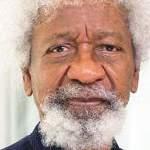
natural aspiration of living men and women, but what distinguishes Soyinka remarkedly is the quality and impact that he brings to the fore at every moment in his journey. It is therefore most painful to find a coterie of badly brought up children writing on social media having the effrontery to disrespect the sage. Soyinka had once written that culture is not idyllic not is it fossilized as a romantic sign, ever so dynamic culture grows, mutates, but Soyinka probably never imagined the terrible manner in which basic African values and cultures have changed in the face of the forces of modernization, a prominent trope in his writings. One disrespectful young man once asked him to stand up for him in a domestic flight, claiming that he was the rightful owner of the seat, and the young man went ahead to boast about it on social media. Even at 90, Soyinka has shown many of his critics, including the social media antagonists that he still has enough fire in him to fight back, whether in the trenches or in the more dignified arena of intellection.
Wole Soyinka has been honoured in virtually every continent of the world. Cities have declared special Wole Soyinka days in appreciation of his impact. Among his Egba people in Ogun State, July 13 has been declared by the Alake of Egbaland, Kabiyesi Adedotun Gbadebo, Okukenu IV as Wole Soyinka Day. In New Orleans, United States, there is already a Wole Soyinka Day. Oba Gbadebo also wants Soyinka to be conferred with the national honour of Grand Commander of the Order of the Niger (GCON). On the occasion of his 90th birthday, Soyinka has been celebrated as far away as Morocco, and here in his home country, Nigeria, the drums have been rolled out. There is no honour that can be too much for him. It is most appropriate that the National Theatre of Nigeria at Iganmu, Lagos has now been renamed Wole Soyinka Centre for Culture and Creative Arts. It is most befitting. It is the only edifice of its type so named after a writer in Africa. Soyinka beyond the universal appeal of his literature is a nationalist, capturing through a repertoire of literary devices the story of our lives. Once upon a time, the National Theatre was going to be turned into banking halls, hotels and restaurants. The stamp of Soyinka’s brand and symbolism on that institution should rescue it and return it to the original purpose for which it was built. In journalism, politics and popular struggle, Chief Olusegun Osoba who turned 85 yesterday has also lived a life of extraordinary impact and distinction. Soyinka distinguished himself as a writer of verses, Osoba is the iconic reporter, and promoter of excellence in Journalism. He got his first job as a reporter at The Daily Times under the legendary Alhaji Ismail Babatunde Jose in 1964. He was 25 years old at the time. Today, at 85, Osoba is still active in the journalism community; it is not unusual to find him at important functions of all the major organs of the profession, as an inspirational figure to the generations behind him and a living library of the profession. Osoba’s example and brand project journalism and its practice most positively. Many journalists seek to excel. Osoba is a true model. He rose through the ranks as a reporter to become editor and head of three major newspaper establishments- Nigerian Herald, Daily Sketch and Daily Times. He had a hand in the design and delivery of another newspaper – The Guardian and he appointed its first editor! Osoba was a master
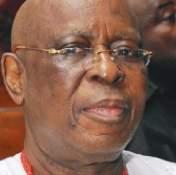
of the scoop as a reporter, and he earned the sobriquet, Timesman on the front pages. He was well connected in society and had contacts in every sphere. He was so successful, long before his colleagues could buy a bicycle, he owned a scooter. He had a phone at home. He also got himself a beautiful wife. He would later go into politics, and in that process, he was Governor of Ogun State twice in his career (1992 – 1993, 1999 -2003). Osoba has shown a remarkable capacity for self-reinvention and consistent relevance. He is today a father figure in Ogun State politics and at the Federal level, he is one of the founding fathers of the ruling All Progressives Congress party (APC). He is highly regarded for the role he played during the June 12, 1993 debacle and his commitment to progressive politics. He has told his own story in a detailed memoir titled Battlelines: Adventures in Journalism and Politics (2019, 341 pp.), an immensely informative book which was publicly presented to mark his 80th birthday five years ago.
The story of his journalism career has also been told in a book by Mike Awoyinfa and Dimgba Igwe titled Osoba: The Newspaper Years (2012, 396 pp.). Now to mark his 85th birthday, he has presented to the public a new book titled Segun Osoba, My Life in the Public Eye (Lagos: Diamond Publications, 2024, xi + 212 pp). The book was unveiled at Eko Hotel, Lagos on July 13, the same day that Soyinka turned 90. My Life in The Public Eye focusses largely on many of the tributes that were written to celebrate Osoba at 80 and reviews of his book, Battlelines, in addition to a number of commentaries by the author himself. Divided into five parts - Institutional Assessments (editorials on Osoba by The Nation, Vanguard, and The Guardian); In the Eyes of Associates (tributes by other journalists), Unveiling Battlelines, Dissecting battlelines and Perspectives - in a total of 33 chapters and an index. It is a well compiled account of reflections on the essence of Chief Osoba which students and teachers of journalism will find useful. But this is in no way a substitute for the main memoir - Battlelines which tells Osoba’s story in a more comprehensive manner. The documentation of Osoba’s art and craft is an interesting addition to media biography in Nigeria. Stuck in the hectic pursuit of headlines and deadlines, journalists often forget to tell their own stories while busy telling other people’s stories. Osoba sets another good example by telling his own story in his own words and through the words of others. The fact that he is a politician is also a noteworthy part of his career. At the Eko Hotel presentation of his book on July 13, there were more politicians than journalists, many of them falling over each other to be noticed by their party leader and close companion of the President of Nigeria. But in the long run, Osoba would always be remembered as much for his politics as he would be remembered for the craft that brought him to national reckoning.
And now to Prince Nduka Obaigbena who is now 65, a towering figure also in Nigerian journalism, who has practically redefined the practice over the decades with his publications, ThisWeek magazine, and later ThisDay newspaper, cultural events such as the Arise Fashion and Arise Shows, and more recently, the influential television station, Arise News. Obaigbena is a media entrepreneur of the very first rank, who has used his various platforms to create jobs and opportunities for more
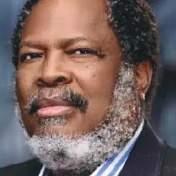
than a generation of journalists. This past weekend, former ThisDay journalists under the auspices of a group known as ThisDay Alumni Association thought it fit to honour him. They said in a statement: “With an unparalleled ability to anticipate and shape the future of media, he has redefined journalistic standards and expanded the horizons for media practitioners globally.” There were no formal invitations but the number, shape and size of people that converged at Obaigbena’s Ikoyi residence was truly impressive. A day like Sunday is when most people in Lagos try to rest at home to prepare for the beginning of a new week, besides, the group of persons that gathered are ordinarily very busy people, but they all turned up – captains of industry, businessmen, government officials, former Governors – to wish Obaigbena a happy 65th birthday. I could not attend the Osoba book event. I was held up in Abuja but I was at the Obaigbena informal birthday celebration. I left with the strong impression that success is like honey: it attracts those who like the sweetness of things and that is why persons who make impact in their chosen lines of work are rewarded with recognition and celebration. It is a moral fact that young people need to understand: that hard work pays, commitment brings honour. Obaigbena proved to be a good host. It was a pleasant Sunday evening, with more than enough to drink and eat. On Monday, the Chairman of Arise Group responded appropriately to our usual calls for “implications”. He sent food packs to the studio at Arise News – small chops, chicken and jollof rice, and swallow with soup.
Birthdays after all, are happy moments, not for mourning. Regardless of one’s circumstances of birth, it is possible to touch the sky literally speaking through self-discipline and tenacity of purpose. Soyinka, the son of “the Wild Christian” and Ess-Ay” was raised in Abeokuta but today, the same Soyinka, product of St. Peter’s primary School, Ake is a global icon; Osoba, also from Abeokuta, was born in Osogbo in Osun State, and he attended Methodist Boys High School in Lagos, only to end up as one of the most prominent and well-rounded journalists of his generation. Obaigbena, born in Ibadan, 1959, is from Owan Kingdom in Delta state. He began his journalism career as a cartoonist, graphic artist, and stringer and now, today, the history of journalism in Nigeria would be incomplete without an acknowledgement of his many innovations in the business, -his introduction of colourful mastheads, back-page columns, and a newspaper that reports business and politics in the language that the reader understands and now a television station that speaks the minds of the people. Soyinka’s creativity is the catalyst for many careers all over the world: students that he taught, many who became writers because they wanted to be like him, graduate students who earned masters and Ph.Ds as Soyinka scholars, researchers, academics, filmmakers – all for whom Soyinka is an industry. Osoba is a role model for many journalists who hope that they too can be just as successful. There are also many young journalists who aspire to be like Obaigbena. He is fondly called “The Duke” and I have seen quite a few persons carrying on like his alter egos. Three prominent members of the Nigerian cultural elite celebrating another year, offer rich perspectives on the linkages between them and how so different they also are. Many happy returns to this July troika.